話法(直接話法・間接話法)
話法(reported speech)は、
「だれかが言ったこと・思ったこと」を 別の人に伝える ときのルールです😊
直接話法=「言葉をそのまま引用」/
間接話法=「文の形を整えて言い換え」。
疑問文や命令文の変換も、このページでまとめて整理します。
- 「” ”(引用符)」を使う 直接話法 の基本ルールがわかる
- 間接話法 にするときの that / if / whether の使い分けが見える
- 疑問文・命令文・感嘆文など、文の種類ごとの変換ルールを「型」で覚えられる
▮ 目次
✅ まずは 「1 → 2 → 3 → まとめ」 の順が読みやすいです。
📱 スマホは「見たい章だけ」開けばOK(子項目は折りたたみ式)。
-
1. 話法(まずは全体像) 最初にここ「そのまま言う」直接話法と、「言い換える」間接話法の違いをつかみます。
-
↳ 1-1. 直接話法(引用符 “ ” のルール)
コンマ、引用符、文末記号の置き方など「見た目のルール」を整理します。
-
↳ 1-2. 間接話法(that節・代名詞・時制)
引用符を外して
thatでつなぐ、時制の一致などの基本を押さえます。 -
↳ 1-3. 代表的な伝達動詞(say / tell / ask など)
「言う・伝える・たずねる」を表す動詞の使い分けを整理します。
-
↳ 1-4. 語句の変化(this→that / here→there など)
“話す場所・時間” が変わると、指示語や副詞も変わるのがポイントです。
-
↳ 1-1. 直接話法(引用符 “ ” のルール)
-
2. 疑問文の転換(if / whether / 疑問詞)質問を「質問のまま」ではなく「内容」にして文へ入れる練習をします。
-
↳ 2-1. 一般疑問文(if / whether)
「〜かどうか」を
if/whetherでつないで、質問を“内容”に変えます。 -
↳ 2-2. 特殊疑問文(疑問詞+S+V)
Where/Whatなどの疑問詞は残し、語順を平叙文(ふつうの文)にします。
-
↳ 2-1. 一般疑問文(if / whether)
-
3. 命令文の転換(to不定詞でまとめる)命令・依頼・忠告などを
to + 動詞でスッキリ表します。-
↳ 3-1. 被伝達文が命令:tell / order / command / bid + to
「〜しろ」を “〜するよう命じた” に転換。否定は
not / never to。 -
↳ 3-2. 被伝達文が依頼:ask / request / beg + to
「〜して」を “〜するよう頼んだ” に転換。丁寧さ・強さも調整できる。
-
↳ 3-3. 被伝達文が忠告:advise / warn + to
「〜したほうがいい/するな」を “〜するよう忠告(警告)した” に転換。
-
↳ 3-4. 被伝達文が勧誘:Let’s → suggest / propose + that (should)
「Let’s ~」は
that + (should) + 原形に転換。should省略(原形)もOK。
-
↳ 3-1. 被伝達文が命令:tell / order / command / bid + to
-
4. 感嘆文の転換(How / What をどう扱う?)「なんて〜なんだ!」を、間接話法で“内容”として伝えます。
-
↳ 4-1. 疑問文の How / What と何が違う?
How / Whatが「質問」ではなく「感嘆(気持ち)」になる見分け方を整理します。 -
↳ 4-2. How型の転換
直接話法の
How ...!を、間接話法でhow ...節として自然に報告します。 -
↳ 4-3. What型の転換
What a/an ...!を間接話法にし、a/anの扱いも迷わない形にします。 -
↳ 4-4. “一言感嘆”の補い方
How nice!のような短い感嘆を、報告として伝わる文に“補って”言えるようにします。
-
↳ 4-1. 疑問文の How / What と何が違う?
-
5. 祈願文の転換(May ...! を伝える)祈り・願いを
pray / wishなどで間接的に表します。-
↳ 5-1. まずは正体!祈願文 “May + S + V!” を見抜く&基本の転換手順
He said, "May ...!"をthat節に直して、祈願を“伝える形”へ変える流れをつかみます。 -
↳ 5-2. 伝達動詞の使い分け:express / pray / wish(どれを選ぶ?)
「祈る」「願う」のニュアンスに合わせて、
pray/wish/expressを選ぶコツを整理します。 -
↳ 5-3. 時制の一致:may → might(“祈願の might” を怖がらない)
時制の一致(時を合わせるルール)で
mayがmightになる理由をやさしく確認します。 -
↳ 5-4. 場面別に自然化:祝福・乾杯・式典・メッセージの祈願文を“報告”する
祝福や乾杯など“場面”に合わせて、祈願文を自然な間接話法(伝え方)に整える練習をします。
-
↳ 5-1. まずは正体!祈願文 “May + S + V!” を見抜く&基本の転換手順
-
6. 重文の転換(and / but / or でつながる文)「A そして B」を間接話法にするとき、
thatをどう入れるかがコツです。-
↳ 6-1. 一般的な重文(and / but / or)
「A そして B」を間接話法にするとき、
thatをどこに入れるか(省略しにくい理由も)を整理します。 -
↳ 6-2. 接続詞が for / so のとき(残すパターン)
for/soは「そのまま残す」ことが多い!つなぎ方の感覚を先に掴みます。 -
↳ 6-3. 命令文+and / or(「急げ、そうすれば…」)
「〜しなさい、そうしないと…」を間接話法で自然な形に整えるコツを案内します。
-
↳ 6-1. 一般的な重文(and / but / or)
-
7. 複文の転換(従属節がある文)従属節(because / when / until など)で「時制の一致」がどう動くかを整理します。
-
↳ 7-1. まず全体像:従属節(おまけの文)もまとめて「報告」する
接続詞(because / if など)を残しつつ、節ごとに「報告の形」へ整えるコツをつかみます。
-
↳ 7-2. 時・条件の従属節:when / before / after / if / unless の整理
「〜したら」「〜する前に」など、時間・条件の節を間接話法で自然に直す流れを確認します。
-
↳ 7-3. 理由の従属節:because / since / as(理由の言い方)
「なぜなら」を表す節を、意味を崩さず読みやすく報告できるようにします。
-
↳ 7-4. 譲歩の従属節:although / though / even if(逆風でも〜)
「〜だけど」「たとえ〜でも」など、逆風の情報を入れた文の報告ルールを整理します。
-
↳ 7-1. まず全体像:従属節(おまけの文)もまとめて「報告」する
-
8. 種類の違う文の転換(平叙文+疑問文など)1つの引用の中に「違う種類の文」が混ざるときのまとめ方を確認します。
-
↳ 8-1. まず結論:文の種類が違うなら“報告動詞”も分ける(型を先に)
「言った/聞いた/頼んだ」を文の種類で切り替える基本ルールをつかみます。
-
↳ 8-2. 平叙文+Yes/No疑問文:said + that / asked if(whether) を並べる
「〜だ」と「〜なの?」が混ざるときの組み立て方を練習します。
-
↳ 8-3. 平叙文+Wh疑問文:asked + wh語(語順は疑問形にしない)
what/where/whyなどの質問を“ふつうの語順”で報告するコツです。 -
↳ 8-4. 疑問文+平叙文:順番はそのままでもOK(読みやすさ優先)
「まず質問→そのあと説明」など、会話の流れを崩さずにまとめます。
-
↳ 8-5. 命令文(依頼)+他の文:told/asked + to ~ + 追加の報告
「〜して」+質問/説明を
toを使って自然に報告できるようにします。
-
↳ 8-1. まず結論:文の種類が違うなら“報告動詞”も分ける(型を先に)
-
🧾 まとめ:話法(reported speech)の要点チェック 最後にここ「直接→間接の基本」+「疑問文/命令文の型」+「よくあるミス」を1分で回収します。
1. 話法(まずは全体像)
このセクションでは、話法(reported speech:「だれかの言葉を伝える言い方」)の全体像をつかみます😊
ポイントは
「そのまま言う」直接話法 と
「言い換える」間接話法
の違いです。
間接話法では that(〜と)や if / whether(〜かどうか)で文をつなぎ、
代名詞(I / you などのこと)や 時制(時間の形:今・過去など)が変わることがあります。
ここでは詳しい説明に入る前に、「まずはざっくりイメージをつかむ」ことを目標にしましょう✨
むずかしい言葉が出てきたら、すぐ横に (かんたんな言いかえ) を付けます。大人向けの内容でも、読みやすさはキープします👍
🧭 図でつかむ:直接話法 → 間接話法(「そのまま」→「言い換え」)
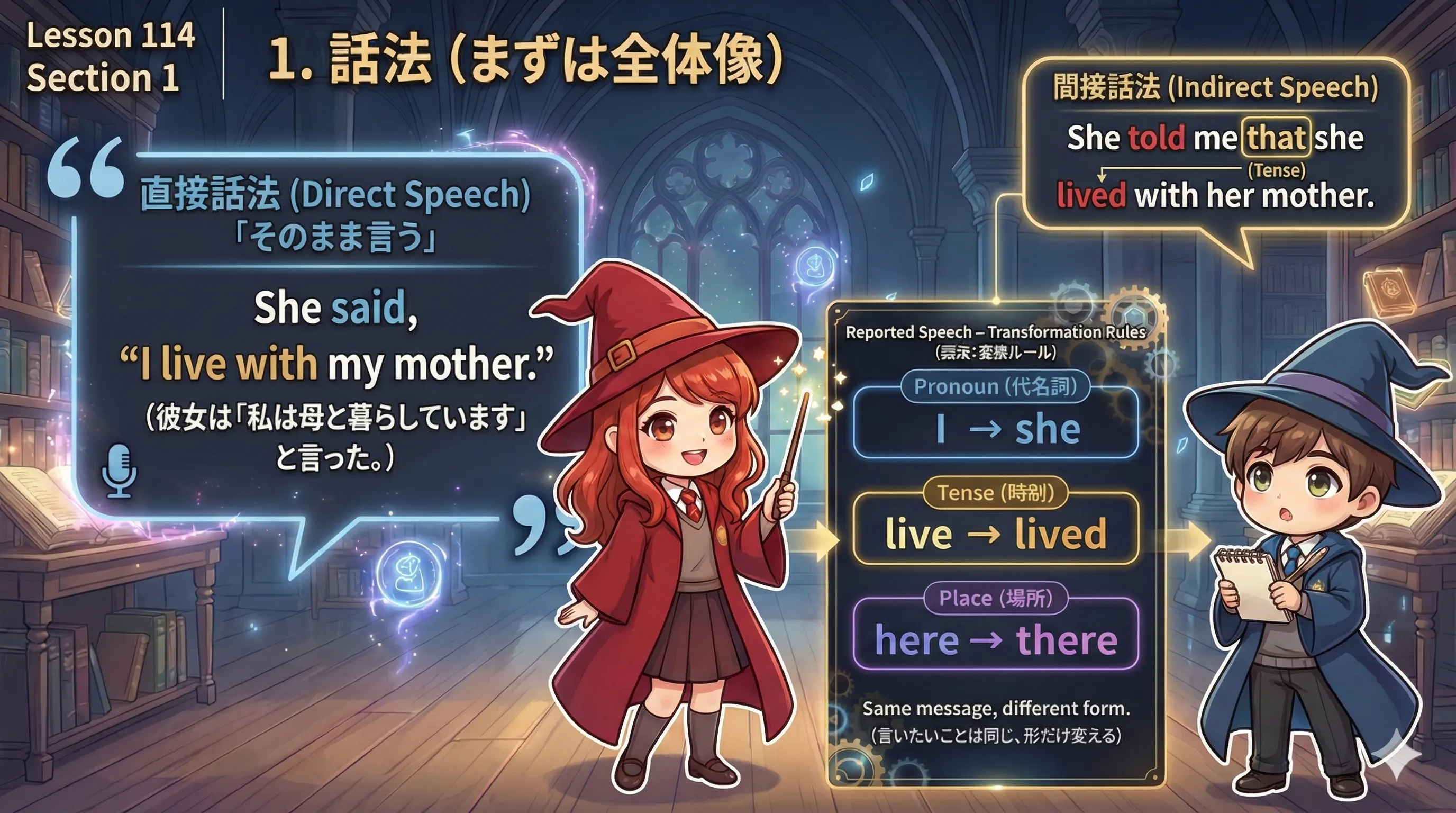
that など)😊
🌟 まずはここ!「話法」は“伝え方の変換ルール”
話法は、イメージで言うと 「セリフを運ぶ技」 です🎤
たとえば「彼がこう言ったよ」を伝えるとき、
“ ” を付けてそのまま言う(直接話法)か、
文の形を整えて言い換える(間接話法)かを選びます。
-
伝達動詞(でんたつどうし:「言った・聞いた」など“伝える動詞”)
→
say/tell/askなど - 被伝達部(ひでんたつぶ:「伝えられる中身」) → 「何と言ったの?」の部分
- 時制の一致(じせいのいっち:「時間の形をそろえる」) → said(過去)なら live → lived にズレることがある
She said, "I live with my mother."
(彼女は「私は母と暮らしています」と言った。)
She told me that she lived with her mother.
(彼女は私に、母と暮らしていると言った。)
💡 ここでは “雰囲気” だけでOK! 次の 1-1〜1-4 で「なぜそうなる?」を順番にほどいていきます😊
🗺️ 次はどちらから読む? 1-1 ~ 1-4 へのナビゲーション
1-1〜1-4 は、どれから読んでもOKです😊
迷ったら「見た目のルール」→「言い換えルール」→「動詞」→「語句の変化」の順がスムーズです。
ここまで読めたあなたは、もう準備はバッチリです😊
人は「完璧に分かってから」よりも、 「だいたい分かった状態でまず進む」 方が、記憶に残りやすく続けやすいと言われます。
まずは気になるところから 1-1〜1-4 に入ってみましょう!
1-1. 直接話法(引用符 " " のルール)
直接話法は、だれかの言葉を そのままセリフとして見せる 書き方です🎤
ここでは意味より先に、「見た目の型(ルール)」を整えて
読める・書ける を作ります。
むずかしい言葉が出たら、すぐ横に (かんたん説明) をつけるので安心してください😊
,
引用符 " "
🖼️ ひと目で分かる:直接話法の「型」
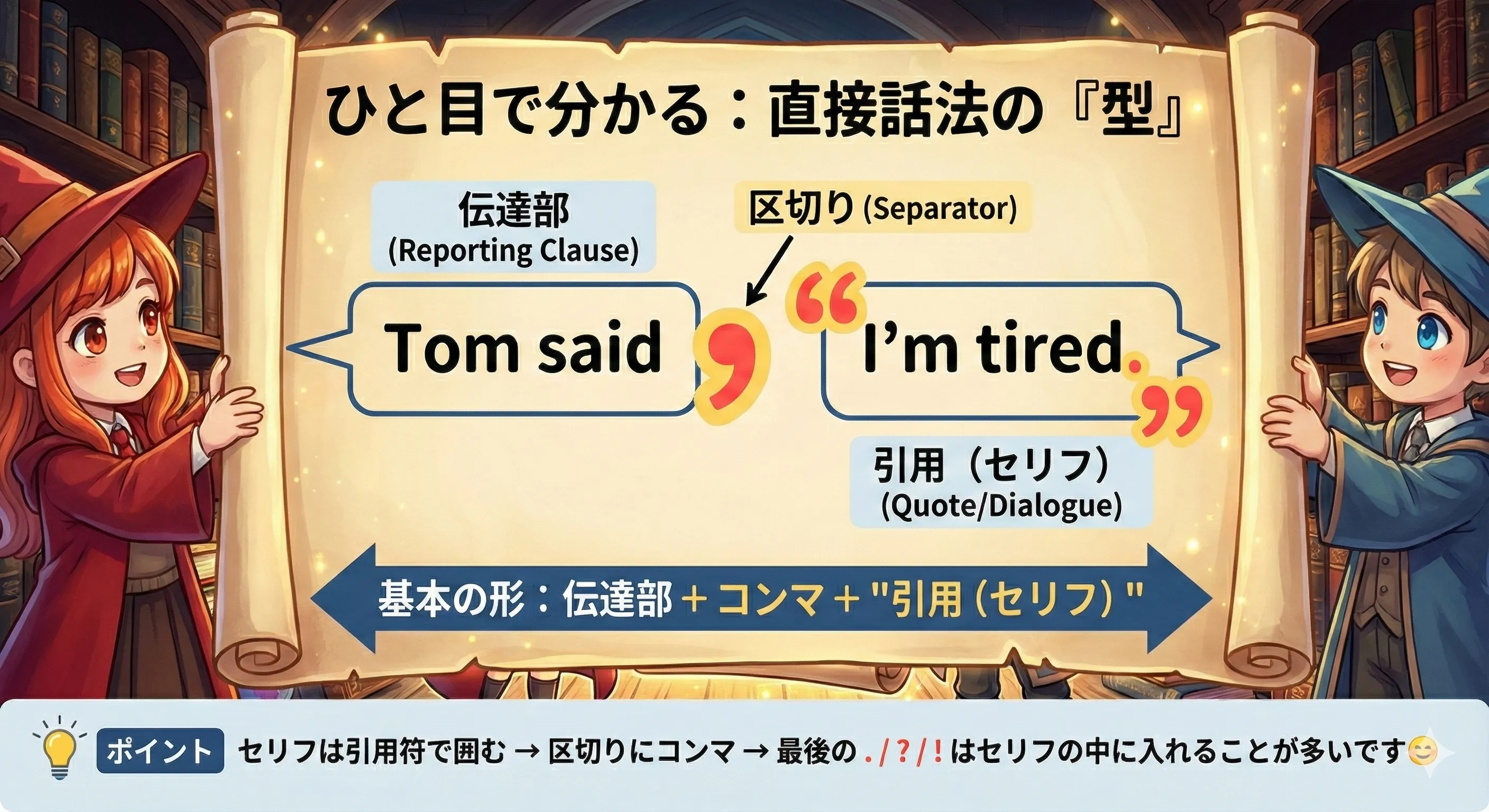
. / ? / ! は セリフの中 に入れることが多いです😊
1-1-1. 基本の形:伝達部 + コンマ + "引用(セリフ)"
直接話法は、まずこの順番でOKです👇
(伝達部=「言った」の部分。例:said / asked など)
Tom said,
"I'm tired."
, は “セリフの前” に置く区切り。
そしてセリフは " " の中に入れます。
Tom said, "I'm tired."
(トムは「疲れた」と言った。)
She said to me, "Please sit down."
(彼女は私に「どうぞ座って」と言った。)
My dad said, "Don't touch that."
(父は「それに触るな」と言った。)
コンマ → 引用符 → 文末記号 の順で見直すと、ミスが一気に減ります😊
1-1-2. 引用符 " " の役割:ここからここまでがセリフ!
引用符 " " は、セリフの スタート と
ゴール をはっきり見せるための「枠」です🖼️
(引用符=日本語の「」みたいなもの)
🔍 どこまでがセリフか、一瞬で分かる工夫
- セリフは 引用符の中 だけ。外側は「誰が言ったか」。
- 文末の記号(. ? !) も、ふつうはセリフの一部として引用符の中に入れます。
- まずは「引用符の中身だけ読めば会話が分かる」状態を作るのが目標です😊
The teacher said, "Open your books."
(先生は「教科書を開いて」と言った。)
She said, "This is my bag."
(彼女は「これは私のかばんです」と言った。)
He said, "Wow!"
(彼は「わあ!」と言った。)
英文を見たら、まず 引用符の中だけ を読んで「セリフ」をつかみ、 次に外側を見て「誰が言ったか」を確認すると、スラスラ読めるようになります😊
1-1-3. セリフは大文字でスタート(基本ルール)
引用符 " " の中は、「1つの文のスタート」として扱われます✍️
だから、セリフの最初は 大文字 で始めるのが基本です。
(大文字=A / B / C みたいな形)
✅ 3秒チェック(スマホでも見やすい)
- ルール 引用符の直後は 大文字 でスタート
- 超重要 I(私は)だけは、いつでも 必ず大文字
- コツ 「セリフ=文の始まり」と思えば自然に書けます😊
He said, "i am ready."
He said, "I am ready."
(I は必ず大文字)
He said, "We start at nine."
(彼は「9時に始める」と言った。)
She said, "I can do it."
(彼女は「私はできる」と言った。)
He asked, "Do you have time?"
(彼は「時間ある?」と尋ねた。)
「引用符の直後は大文字」+「I は必ず大文字」だけで、直接話法が一気にキレイに見えます😊
1-1-4. 文末記号は「引用符の中」に入れる(. ? !)
直接話法では、文末の記号(. / ? / !)もセリフの一部です。
だから多くの場合、記号は " " の 内側 に入れます🧩
(記号も「言った言葉」に含まれるイメージ)
🧠 かんたん合言葉
He asked, "Are you okay?"
He asked, "Are you okay"?
(? が外に出てしまう)
She said, "It's cold."
(彼女は「寒いね」と言った。)
He asked, "Are you okay?"
(彼は「大丈夫?」と尋ねた。)
She shouted, "Run!"
(彼女は「走って!」と叫んだ。)
He said, "Wow!"
(彼は「わあ!」と言った。)
まず 引用符の中 だけ見て、セリフ を取る → 次に外側で「誰が言ったか」を確認するとスムーズです😊
1-1-5. 伝達動詞の使い分け(say / tell / ask)※入口だけ
「言う」でも動詞が変わると、形(つながり方)が変わります😊
ここではむずかしくしないで、まずは 3つの役割 だけ覚えましょう。
(伝達動詞=「言った・聞いた」など“伝えるための動詞”)
相手(人)を必ず入れなくてもOK。
say, "..." / say to 人, "..."
(tell = 人に伝えるイメージ)
tell 人, "..."
? が入るセリフ と相性がいい。
ask 人, "...? "
say:まずは 「言った」(相手なしでもOK)tell:「人に」伝える(tell meなど)ask:質問(?のセリフに多い)
She said, "I'm home."
(彼女は「ただいま」と言った。)
She told me, "I'm home."
(彼女は私に「ただいま」と言った。)
She asked me, "Are you home?"
(彼女は私に「家にいるの?」と尋ねた。)
say / tell / ask の「役割の違い」が分かるだけで、文章が一気に読みやすくなります😊
1-1-6. 伝達部の位置:前・後ろ・途中でもOK(見慣れさせる)
直接話法は、セリフと「〜と言った」がセットですが、順番は自由です📖
小説・会話文では、セリフが先に来る形もよく出ます。ここで “見慣れて” おくと安心です😊
🧩 代表的な3パターン
He said, "..."
"...," he said.
"...," he said, "..."
He said, "I'll call you later."
(彼は「あとで電話するよ」と言った。)
"I'll call you later," he said.
(「あとで電話するよ」と彼は言った。)
"I'll call you," he said, "later."
(「電話するよ」と彼は言った。「あとでね」。)
まず 引用符の中 だけ見て「セリフ」を取る → 次に外側で「だれが言ったか」を確認すると、長文でも迷いません😊
1-1-7. 引用の中の引用(セリフの中にさらにセリフ)
会話の中で、さらに「誰かのセリフ」を入れたいときは、
ダブルクォート(" ")の中にシングルクォート(' ')
を入れて区別します🧩
(日本語の「『 』」みたいに、カギカッコを二重にするイメージ)
🔍 迷わないためのミニルール
- 外側のセリフは " "。 その中の“さらに引用”は ' ' 。
-
強調したい単語(例:
I can't)を 「引用っぽく」見せるときにも使えます。 - 書き方の流派(スタイル)はありますが、まずは 「外=" "/内=' '」で十分です😊
She said, "He shouted, 'Stop!'"
She said, "He shouted, 'Stop!'"
(彼女は「彼は『やめろ!』と叫んだ」と言った。)
He said, "I heard her say, 'I'm fine.'"
(彼は「彼女が『大丈夫』と言うのを聞いた」と言った。)
The coach said, "Don't say 'I can't'."
(コーチは「『できない』って言うな」と言った。)
She asked, "Did he really say 'I quit'?"
(彼女は「彼は本当に『やめる』って言ったの?」と尋ねた。)
まずは 外側の " " を見つけて「誰のセリフか」をつかむ → その中の ' ' を見て「さらに誰のセリフか」を追うと迷いません😊
1-1-8. よくあるミス集(見た目チェック)※やさしく矯正
直接話法は「意味」よりも 見た目のミス で落としやすい分野です💦
でも大丈夫。ここは チェックの型 を覚えるだけで一気に安定します😊
📝 3秒チェック(この順で見ればOK)
-
コンマ
,はセリフの前にある? , -
引用符
" "でセリフが囲まれてる? " " - セリフの最初は 大文字? A
-
./?/!は 引用符の中? . ? !
say と tell の形She said me, "Hi."
She said to me, "Hi."○
She told me, "Hi."
say は say to 人 が自然。tell は tell 人 が基本。
He asked, "Are you okay"?
He asked, "Are you okay?"
? はセリフの一部なので、ふつうは " " の中へ。
He said, "i am ready."
He said, "I am ready."
He said, "It's cold".
He said, "It's cold."
. もセリフの一部。基本は引用符の中へ。
🎧 正しい形で“目と耳”をそろえよう(仕上げ)
She said to me, "Hi."
(彼女は私に「やあ」と言った。)
He asked, "Are you okay?"
(彼は「大丈夫?」と尋ねた。)
He said, "I am ready."
(彼は「準備できた」と言った。)
直接話法は「見た目のルール」を守るだけで、読み書きが安定します。あなたはもう十分できています😊
1-2. 間接話法(that節・代名詞・時制)
間接話法は、セリフをそのまま " " で引用せずに、
「〜と言った/〜と思った」に合わせて
言い換えて伝える方法です🗣️➡️📝
まずは基本の接着剤 that(〜ということ)でつなぐ形を固めましょう。
ここでは詳しい変化(代名詞・時制)に入る前に、
「骨組み(型)」を作ることを目標にします😊
むずかしい用語が出たら、すぐ横に (かんたんな言いかえ) を付けて進めます。
話法 間接話法 入門 Lesson 114 / Section 1-2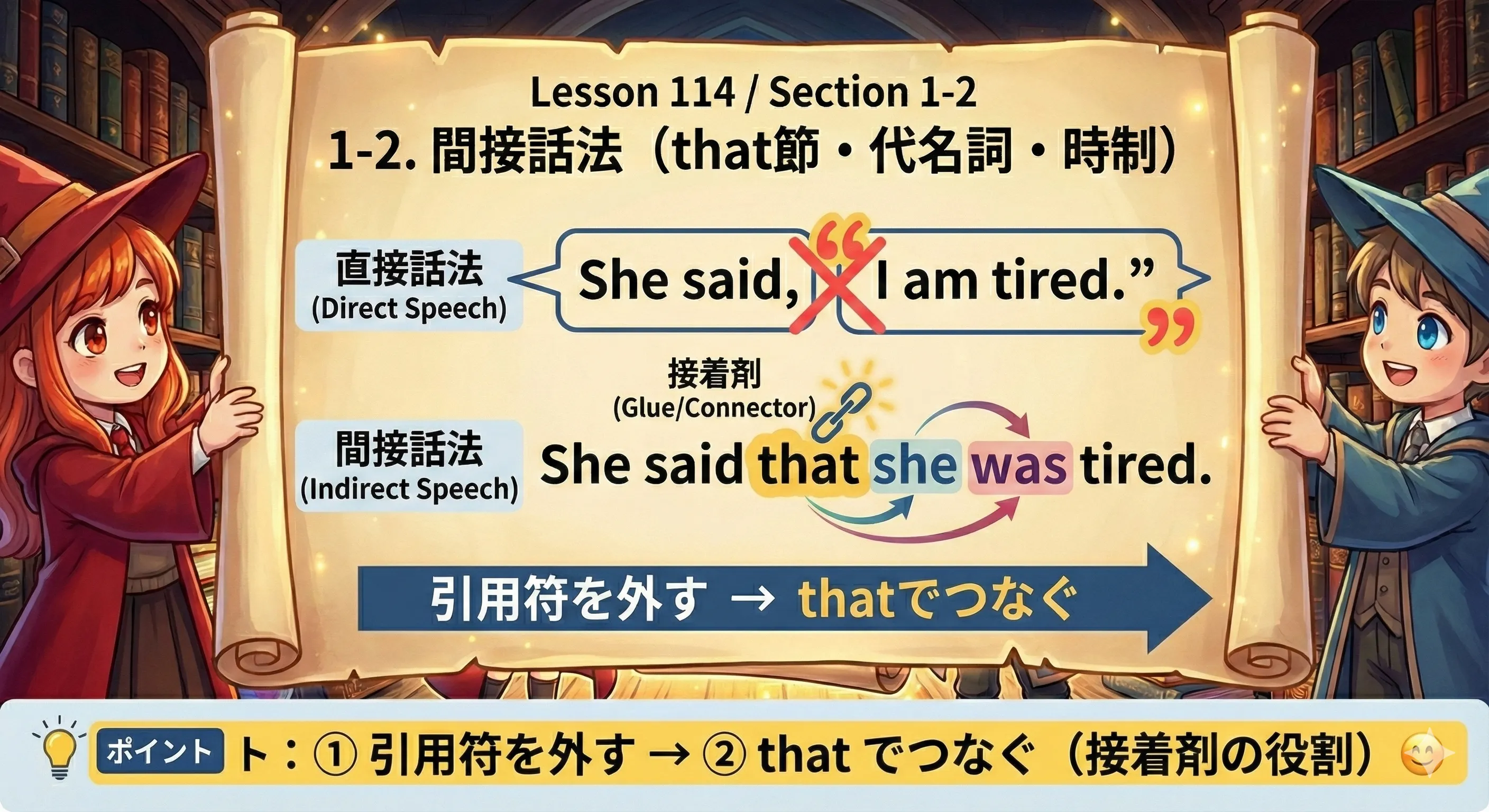
1-2-1. 基本の形:that節(〜ということ)でつなぐ
直接話法の " " を外して、
that + 主語 + 動詞 でつなぐのが基本です✨
that は
(〜ということ)
という“つなぎ言葉”だと思うとラクです😊
🧩 形のイメージ(まずこれだけでOK)
She said, "I am tired."
She said that she was tired.
She said that she was tired.
(彼女は疲れていると言った。)
that は「〜ということ」。文と文をくっつける接着剤です。
I thought that it was a good idea.
(私はそれが良い考えだと思った。)
say だけでなく think(思う)でも同じ形になります。
He told me that he was late.
(彼は私に遅れたと言った。)
tell は「だれに」が入りやすい(told me など)です。
間接話法は「that でつなぐ型」が分かれば、あとの変化もスッと入ります😊
1-2-2. that は省略できる(口語でよくある)
会話・メール・SNSでは、that を
省略することがよくあります📱✨
意味は同じで、「接着剤が見えなくなっただけ」と思えばOKです。
(that が“省エネ”される感じ)
👀 見た目の違いだけチェック
She said that she was tired.
She said she was tired.
She said that she was tired.
She said she was tired.
(どちらも「彼女は疲れていると言った。」)
He told me that he was late.
He told me he was late.
(どちらも「彼は私に遅れたと言った。」)
I think that it is true.
I think it is true.
(どちらも「私はそれが本当だと思う。」)
I think は “that なし” がかなり自然です。
文章を読むときは、that が「見える」→「消える」の順で慣れるとスムーズです😊
1-2-3. 代名詞の変化:だれの話?を入れ替える(I / you / my など)
間接話法では、セリフの「目線(だれの立場)」を
伝える人の目線に合わせます👀✨
代名詞(だれを指す短い言葉:I / you / he / she など)がズレると、
意味が変に聞こえるので、ここが大事です!
🧭 迷ったらこの順でチェック(超シンプル)
- だれが言った?(例:Ken が言った)
- だれに言った?(例:me に言った)
-
セリフの
I / my / youを、正しい人に置き換える (I → he / she、you → I / we など)
| セリフ側 | 間接話法での考え方 | よくある置き換え例 |
|---|---|---|
I / me / my |
「言った本人」を指す | I → he / she, my → his / her |
you / your |
「言われた相手」を指すことが多い | you → I / we, your → my / our |
we / our |
「本人+仲間」を指す | we → they(状況次第), our → their |
Ken said that he loved his job.
(ケンは、自分の仕事が好きだと言った。)
I / my は「ケン本人」なので he / his へ。
She told me that I was her best friend.
(彼女は私に、私が彼女の親友だと言った。)
you は「私」なので I に変わります。
Tom told me that he would help me.
(トムは私に、私を手伝うと言った。)
you が「私」なら、間接話法では me に。
They said that they would finish their work soon.
(彼らは、もうすぐ自分たちの仕事を終えると言った。)
they / their が自然。
間接話法は「英語が難しい」というより、登場人物の入れ替えパズルです🧩😊
1-2-4. 時制の一致:時間をそろえるルール(現在→過去 など)
時制の一致は、
(話の“時間”をそろえるルール)⌛です。
とくに、伝達動詞が 過去形(said, told など)のとき、
セリフの時制を 一段だけ過去方向へ動かすことがよくあります。
⏳ よく使う「一段下げ」早見(まずはここだけ)
| 直接話法(セリフ) | 間接話法(言い換え) | ミニ例(英→日) |
|---|---|---|
am / is / are |
was / were |
例: I am busy.(私は忙しい)→ I was busy.(私は忙しかった)
|
live / like(現在形) |
lived / liked(過去形) |
例: I like it.(気に入ってる)→ I liked it.(気に入ってた)
|
will |
would |
例: I will call you.(電話する)→ I would call you.(電話すると言った)
|
can |
could |
例: I can swim.(泳げる)→ I could swim.(泳げると言った)
|
did / went(過去) |
had done / had gone |
例: I went there.(行った)→ I had gone there.(行ったと言った)
|
She said that she was tired.
(彼女は疲れていると言った。)
said が過去形なので am → was。
He told me that he would call me.
(彼は私に、電話すると言った。)
would にずれることが多いです。
She said that she could swim.
(彼女は泳げると言った。)
could へ一段下がることがあります。
He said that he had met her the day before.
(彼は前日に彼女に会ったと言った。)
had met(過去完了)にする形がよく出ます。
時制の一致は「暗記」よりも、映画の時間軸みたいに考えると楽です🎬
「言った(過去)」から見て、セリフの出来事を 一段昔にそろえるイメージです。
1-2-5. 時制の一致の例外:今も本当なら“下げない”こともある
時制の一致は便利ですが、いつも機械的に下げるわけではありません🙅♀️
「今も本当」な内容なら、
現在形のままにすることもよくあります。
(変わらない事実/今も続いている状態 など)
✅ “下げない”判断の目安(ざっくりでOK)
「その内容は今も本当?」と自分に聞いてみてください。
“YES”なら、現在形のままでも自然になることが多いです😊
The teacher said that the earth is round.
(先生は、地球は丸いと言った。)
is のままが自然です。
She said that she lives in Tokyo.
(彼女は東京に住んでいると言った。)
He said that he has a brother.
(彼は兄(弟)がいると言った。)
She said that she was tired.
(彼女は疲れていると言った。)
was に下げるのが自然です。
ルールよりも「今も本当?」という感覚で判断できるようになるのがゴールです😊
1-2-6. 指示語・場所・時間も言い換える(this / here / today など)
間接話法は「セリフを言い直す」ので、話す場所や時間が変わることがあります🗺️⌛
すると、指示語(これ・ここ・今日など)も
言い換えが必要になります。
(指でさしている“場所”が変わるイメージ)
🧭 よく出る言い換えセット(まずはここだけ)
| セリフ(直接話法) | 間接話法 | 覚え方(やさしいヒント) |
|---|---|---|
🫵 this(これ) |
👉 that(それ) |
目の前の「これ」が、話を聞く人から見ると「それ」になることが多い |
📍 here(ここ) |
📍 there(そこ) |
場所が移動したら、「ここ」→「そこ」 |
📅 today(今日) |
📅 that day(その日) |
“今日”は話すタイミングが変わるとズレるので「その日」 |
⏰ now(今) |
⏰ then(その時) |
「今」は報告だと「その時」になりやすい |
📆 yesterday(昨日) |
📆 the day before(前日) |
“昨日”は報告の基準日が変わるので「前日」 |
➡️ tomorrow(明日) |
➡️ the next day(翌日) |
“明日”もズレるので「翌日」 |
She said that she liked that cake.
(彼女はそのケーキが好きだと言った。)
this cake.」なら、報告では that が自然になりやすいです。
He told me that he was there.
(彼は私に、そこにいると言った。)
here.」でも、報告の場が違えば there になります。
She said that she would do it that day.
(彼女はその日それをやると言った。)
that day が便利です。
He said that he was busy then and had met her the day before.
(彼はその時忙しく、前日に彼女に会ったと言った。)
指示語は「話す場所と時間が変わると、指さす先も変わる」と覚えるとスッと入ります👉😊
1-2-7. まとめ:3点セットで変換(" "外す/代名詞/時制)
間接話法は、やることが多そうに見えますが、
実は 「3点セット」で考えると一気にラクです😊✨
まずはこの3つだけ覚えれば、ほとんどの文が変換できます!
① 🧼 引用符を外す
" ... " をやめて、that でつなぐ。
(セリフを“文章”にする感じ)
He said, "I am tired."
He said (that) ...
② 👤 代名詞を入れ替える
I / you / my などを
だれ目線かで変える。
(登場人物パズル🧩)
I → he / she
you → I / we
③ ⏳ 時制をそろえる
伝達動詞が過去形なら、
時制を一段下げることが多い。
(時間のズレを直す⌛)
am/is → was
will → would
✅ 変換の手順(この順でやると迷わない)
-
引用符を外す →
thatでつなぐ(thatは省略OK) -
代名詞を直す(
I / you / myが「だれ」を指すか確認) - 時制をそろえる(必要なら一段下げ/今も本当なら下げないことも)
💬 3点セットを一気に確認(例文)
Ken said that he was busy.
(ケンは忙しいと言った。)
I→he、am→was の流れです。
She told me that I was her best friend.
(彼女は私に、私が彼女の親友だと言った。)
you が「私」なので I に変わります。
Tom told me he would help me.
(トムは私に、私を手伝うと言った。)
that を省略しても自然。will は報告で would になりやすいです。
次は 1-2 の内容を使って、疑問文・命令文の変換にもスムーズに進めます😊
1-3. 代表的な伝達動詞(say / tell / ask など)
間接話法(セリフを言いかえる話し方)では、
「どの伝達動詞を使うか」が超大事です🧭
まずは最頻出の say と tell を、
“内容が主役”か“相手が主役”かでスッキリ整理しましょう✨
ここは暗記よりも「イメージ」をつかむ入口です。例文で感覚を育てていきましょう😊
伝達動詞(話を伝える動詞)= (「言う・伝える」系の動詞) くらいの理解でOKです👍
話法 動詞の使い分け Lesson 114 / 1-3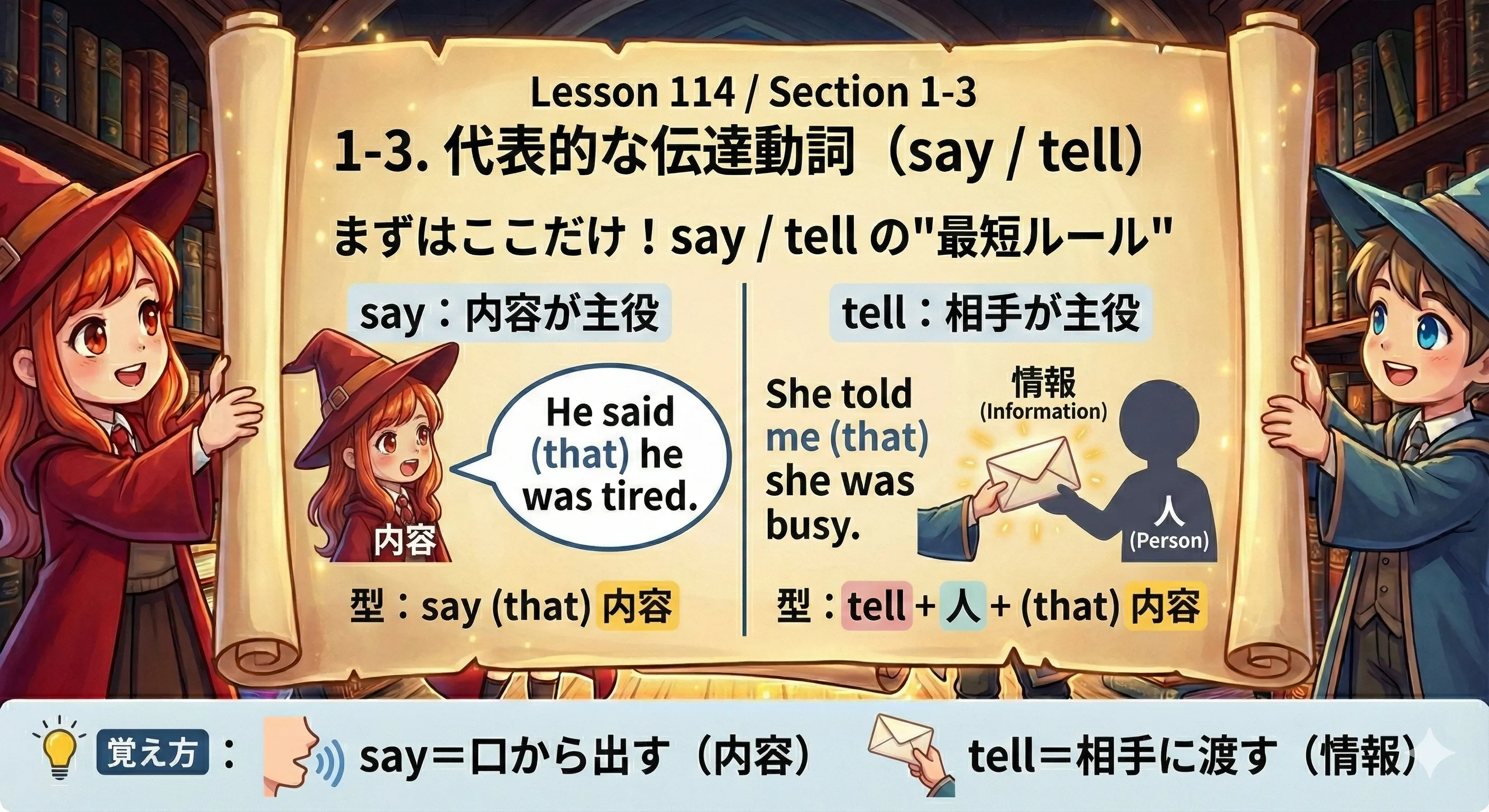
🧩 まずはここだけ! say / tell の“最短ルール”
say は「何と言ったか」を言うイメージ🗣️
相手(だれに)は なくてもOK なことが多いです。
say (that) 内容
He said (that) he was tired.
tell は「だれに伝えたか」が大事📩
基本は tell + 人 がセットです。
tell + 人 + (that) 内容
She told me (that) she was busy.
say=口から出す(内容) / tell=相手に渡す(情報) というイメージでOKです😊
1-3-1. say:内容を言う(相手は必須じゃない)
say は「何と言ったか(内容)」が中心です🗣️✨
だから 相手(だれに)を書かない 形もよく出ます。
(内容だけをサッと報告)
📌 say の型(よく使う2つ)
| 型(カタチ) | 例(英語) | ポイント |
|---|---|---|
✅ say (that) 内容 |
He said (that) ... |
相手なしOK。内容が主役。 |
✅ say to + 人 |
She said to me, ... |
相手を入れるなら to を付けるのが基本。
(× say me)
|
×
She said me ...(基本NG)○
She said to me ... / She told me ... が自然です😊
💬 例文で「内容が主役」を体感(say)
He said that he was tired.
(彼は疲れていると言った。)
She said to me, "I'm busy."
(彼女は私に「忙しい」と言った。)
to を忘れないのがコツです。
Tom said goodbye and left.
(トムは「じゃあね」と言って去った。)
say goodbye は「さよならと言う」の定番表現です。
1-3-2. tell:相手に伝える(相手がほぼ必須)
tell は「だれに伝えたか(相手)」が中心です📩
だから基本は tell + 人 がセットになります。
(相手に“情報を渡す”感じ)
🧭 tell の型(ここが超重要)
tell + 人 + (that) 内容
She told me (that) she was busy.(彼女は私に、忙しいと言った。)
tell + 人 + to do(〜するよう言う)
He told us to be quiet.(彼は私たちに静かにするよう言った。)
tell は「相手に渡す」動詞なので、
人(相手)が入りやすいです😊
💬 例文で「相手が主役」を体感(tell)
She told me that she lived in Osaka.
(彼女は私に、大阪に住んでいると言った。)
me があるので「だれに」がはっきりします。
He told us to be quiet.
(彼は私たちに静かにするよう言った。)
Please tell me the truth.
(本当のことを教えてください。)
tell me は「私に教えて」の定番。相手が必ず入ります。
内容メイン=
say /
相手メイン=tell。ここが分かると、間接話法の文章が一気に作りやすくなります😊
1-3-3. ask:質問する/頼む(2つの顔がある)
ask は 1つで 2つの役をこなします😊
①「質問する(?)」と ②「頼む(お願い🙏)」のどっちなのかは、後ろの形で決まります。
(むずかしく見えても、型を見れば一瞬です)
🧭 ask の3つの基本パターン
| パターン | 例(英語) | 意味のイメージ |
|---|---|---|
✅ ask + 人 + if / whether ... |
He asked me if ... |
「〜かどうか」を質問する(Yes/No の質問) |
✅ ask + 人 + 疑問詞 (what/where...) |
She asked me where ... |
「いつ/どこ/何」を質問する(情報をたずねる) |
✅ ask + 人 + to do |
I asked him to ... |
「〜して」と頼む(お願い) (質問じゃない!) |
×
ask to me は基本NG(相手はそのまま置ける)○
ask me / ask him が自然です😊
💬 例文で「質問」と「依頼」を見分けよう(ask)
He asked me if I was okay.
(彼は私に、大丈夫かどうかたずねた。)
if が来たら「〜かどうか」の質問になりやすいです。
She asked me where I lived.
(彼女は私に、どこに住んでいるのかたずねた。)
where / what / when などが来たら「情報を質問」している合図です。
I asked him to help me.
(私は彼に、手伝ってくれるよう頼んだ。)
to + 動詞 が来たら「お願い(依頼)」の ask になりやすいです。
if / 疑問詞 が来たら「質問」、 to do が来たら「依頼」になりやすいです😊
1-3-4. answer / reply:返事をする(質問の“返し”)
質問されたら「返事」をしますよね😊
answer は 質問に答える(答えの中身)に強く、
reply は 返事を返す(やりとり全体)に強いイメージです📩
(どっちも「返事」だけど、得意が少し違う)
🆚 まずはここだけ! answer と reply の違い
| 動詞 | よく使う形 | ポイント(やさしい言いかえ) |
|---|---|---|
| answer | answer + 質問 |
質問に答える(「質問そのもの」に反応する) (答えを出す感じ) |
| reply | reply to + 人 / reply that ... |
返事を返す(やりとりの中で返す) (返信する感じ) |
×
reply me(基本NG)○
reply to me(私に返事する) が自然です😊
💬 例文で「返事のしかた」をつかもう(answer / reply)
He didn't answer my question.
(彼は私の質問に答えなかった。)
answer + question の形は超定番です。
She answered that she didn't know.
(彼女は、知らないと答えた。)
answer が使えます。
She replied to me that she was busy.
(彼女は私に、忙しいと返事をした。)
reply to + 人 の形で「〜に返信する」が言えます。
I replied, "Sure."
(私は「もちろん」と返事した。)
reply が自然な場面も多いです。
answer=質問に答える(答えを出す) / reply=返事を返す(返信する) とイメージすると迷いにくいです😊
1-3-5. order / advise / warn / request:命令・助言・注意(強さの違い)
ここでは「人に何かをさせたい/やめさせたい」ときの伝達動詞をまとめます🧭
大切なのは “強さ(どれくらい強く言うか)” の違いです。
(小学生向けに言うと「言い方の強さレベル」)
📶 強さレベルで並べるとこうなる
order は「絶対にやって!」という強い命令💥
(会社やルール、上司の命令など)
order + 人 + to do✅ 否定:
order + 人 + not to do
warn は「危ないよ!やめて!」の注意⚠️
(危険・トラブルを避けたいとき)
warn + 人 + (not) to do✅ 型:
warn + 人 + that ...
advise は「こうした方がいいよ」というアドバイス💡
(相手のためにすすめる)
advise + 人 + to do✅ 否定:
advise + 人 + not to do
request は「お願いします」の丁寧な依頼🙏
(ビジネスでもよく出ます)
request + 人 + to do✅ 型:
request that S (should) do(少し硬め)
order(命令)は強い、 request(依頼)は丁寧、 advise(助言)は相手のため、 warn(注意)は危険回避…と覚えるとスッキリします😊
💬 例文で強さの違いを体感しよう
The boss ordered me to finish the report.
(上司は私にレポートを終えるよう命令した。)
She warned him not to touch the wire.
(彼女は彼に、その線に触らないよう注意した。)
warn の感じです。
The doctor advised me to get more sleep.
(医者は私に、もっと睡眠を取るよう助言した。)
advise の核です。
They requested us to arrive early.
(彼らは私たちに、早めに到着するよう依頼した。)
request です。
1-3-6. promise / suggest / agree / deny:気持ち・提案・主張を伝える
ここは「会話の中の気持ち」を伝える動詞たちです😊
約束する・提案する・同意する・否定する
と、役割がハッキリ分かれています。
(小学生向けに言うと「心の中の言葉」を伝える感じ)
🎭 4つの動詞の“キャラ”をつかむ
「絶対やる!」と約束する🤝 (うそをつかないでやる宣言)
promise (that) ...✅ 型:
promise + 人 + to do
「こうしない?」と提案する💡 (みんなの案を出す)
suggest (that) S (should) do✅ 型:
suggest ~ing(提案)
「うん、賛成!」と同意する👍 (相手の意見にのる)
agree (that) ...✅ 型:
agree to + 名詞(提案に同意)
「それは違う!」と否定する🙅 (やってない/違うと言い切る)
deny (that) ...✅ 型:
deny ~ing(〜したことを否定)
promise=約束🤝、
suggest=提案💡、
agree=同意👍、
deny=否定🙅
と “1単語1キャラ” で覚えると迷いにくいです。
💬 例文で会話の“気持ち”を感じよう
He promised that he would call me.
(彼は私に電話すると約束した。)
promise
She suggested going out for lunch.
(彼女は昼食に出かけようと提案した。)
suggest ~ing は会話でよく出る提案パターンです。
They agreed that it was a good idea.
(彼らはそれが良い考えだと同意した。)
agree です。
He denied stealing the money.
(彼はお金を盗んだことを否定した。)
deny ~ing は「〜したことを否定する」の定番です。
✅ 1-3 まとめ:伝達動詞は「目的」で選ぶ
伝達動詞は「何をしたいか」で選ぶと一気にラクになります😊
迷ったら、まずは 内容 なのか
相手 なのか
質問/依頼 なのか
を見てください。
say (that) ...相手を入れるなら
say to + 人
tell + 人 + (that) ...✅
tell + 人 + to do
ask + 人 + if/疑問詞✅ 依頼:
ask + 人 + to do
answer=質問に答える(答えの中身)✅
reply=返事を返す(返信)
伝達動詞の「役割の違い」が見えてきたあなたは、 もう間接話法を組み立てる準備ができています😊✨
1-4. 語句の変化(this→that / here→there など)
間接話法では、話す「視点(だれの立場)」が変わるので、
this や here などの言葉も“引っ越し”します📦➡️📨
「今ここ」の言葉が、伝えると「そのとき・そこ」の言葉に変わるイメージです。
ここでは詳しい暗記よりも、「視点が変わった?」をチェックする習慣を作りましょう😊
むずかしく感じたら、 (“今ここ”→“あのときあそこ”) とだけ覚えてOKです!
話法 × 視点チェンジ 語句の言い換え Lesson 114 / Section 1-4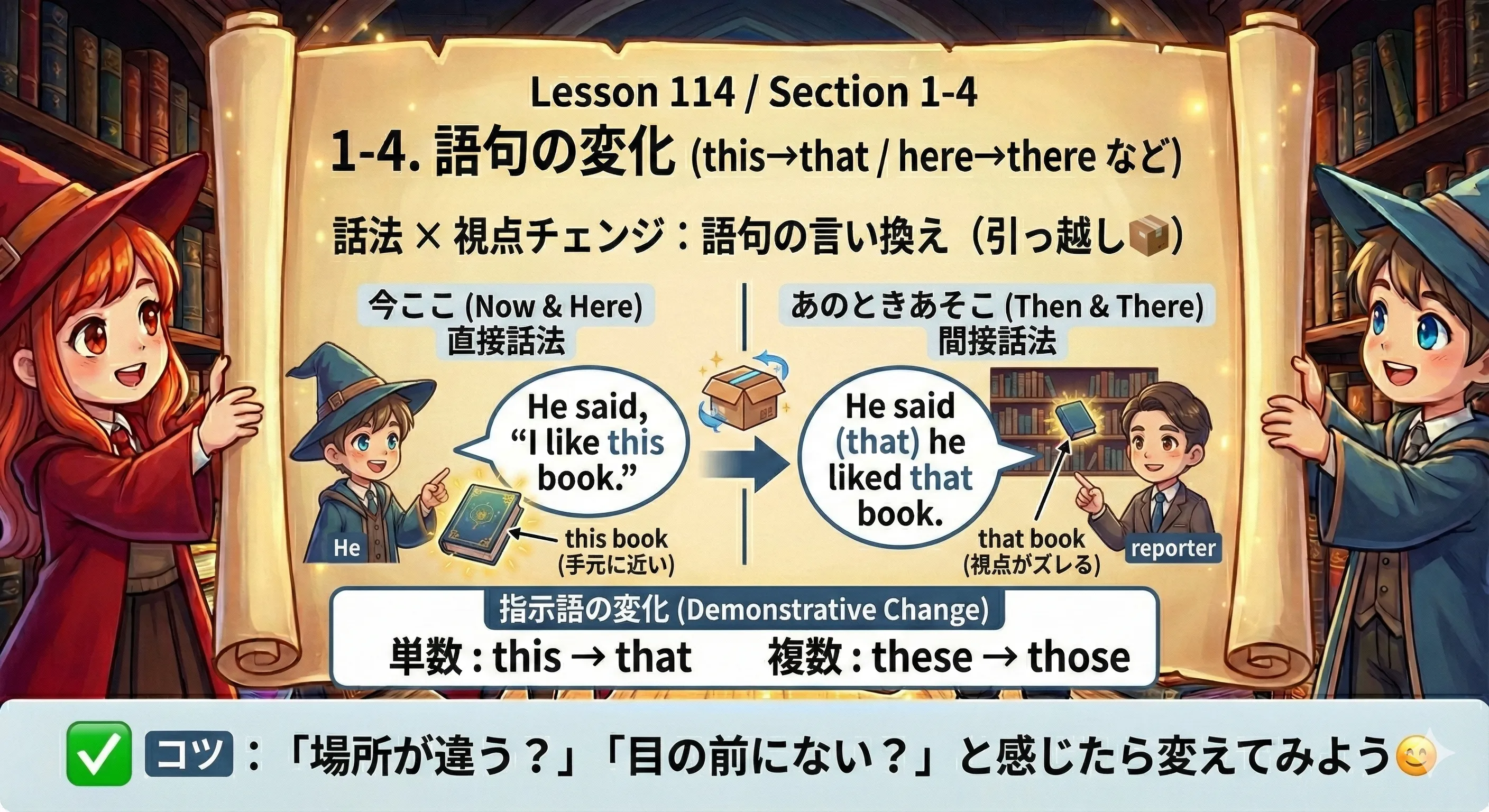
1-4-1. 指示語の変化:this/these → that/those(“これ/ここらへん”の切り替え)
this / these は「話し手の手元に近い “これ”」🫱📘。
でも、間接話法で伝えると視点がズレるので、
“それ(that / those)” に変わりやすいです。
(小学生向け:近くの“これ”が、聞く人には“それ”になる感じ)
🧭 まずはこの2行だけでOK!
this
→
that
these
→
those
「話している場所が違う?」「物が目の前にない?」と感じたら this/these を that/those にしてみると自然になります😊
💬 例文で “これ→それ” を体感しよう
He said, "I like this book."
(彼は「私はこの本が好きだ」と言った。)
He said (that) he liked that book.
(彼はその本が好きだと言った。)
She said, "These cookies are delicious."
(彼女は「これらのクッキーはおいしい」と言った。)
She said (that) those cookies were delicious.
(彼女はそれらのクッキーはおいしいと言った。)
Tom said, "This is my favorite song."
(トムは「これが一番好きな曲だ」と言った。)
Tom said (that) that was his favorite song.
(トムはそれが一番好きな曲だと言った。)
目の前で “これ!” → 伝えると “それ!” に変わりやすい。 これが分かれば、1-4 は半分クリアです😊
1-4-2. 場所の変化:here → there(“ここ/そこ”の切り替え)
here は「話し手がいる場所=ここ」📍。
でも、別の人に伝えるときは場所がズレるので、
there(そこ/あそこ) に変わりやすいです。
(小学生向け:言っている人がいる場所が変わると、“ここ”も変わる)
🗺️ 視点チェンジの合図
here
→
there
「その人は今どこで言ったの?」「私は別の場所から伝えてる?」
もし答えが “うん” なら、here → there を疑ってみましょう😊
💬 例文で “ここ→そこ” を体感しよう
He said, "I live here."
(彼は「私はここに住んでいる」と言った。)
He said (that) he lived there.
(彼はそこに住んでいると言った。)
She said, "Please wait here."
(彼女は「ここで待ってください」と言った。)
She said (that) I should wait there.
(彼女は私がそこで待つように言った。)
They said, "It's hot here."
(彼らは「ここは暑い」と言った。)
They said (that) it was hot there.
(彼らはそこは暑いと言った。)
there が自然になります。
here は「話している人の “ここ”」。 伝える人が別の場所なら、there に切り替えるのがコツです😊
1-4-3. 時の変化:today/yesterday/tomorrow…(“いつ”の切り替え)
直接話法の today や tomorrow は「話した人の“その時点”」🕒。
だから後から伝えるときは、“その日 / 前日 / 翌日” の言い方に変わりやすいです。
(小学生向け:今日・明日は、話す日が変わるとズレる)
🗓️ まずは“超よく出る”セットだけ!
| 直接話法(その場の言い方) | 間接話法(後から伝える言い方) | イメージ |
|---|---|---|
📌today
|
that day | 「今日」→「その日」 |
⏪yesterday
|
the day before | 「昨日」→「前日」 |
⏩tomorrow
|
the next day | 「明日」→「翌日」 |
⌛now
|
then | 「今」→「そのとき」 |
「“今日”って、どの日のこと?」と聞かれてすぐ答えられないなら、 today → that day を疑ってみましょう😊
💬 例文で “いつ” のズレを直そう
She said, "I'm busy today."
(彼女は「今日は忙しい」と言った。)
She said (that) she was busy that day.
(彼女はその日忙しいと言った。)
He said, "I met her yesterday."
(彼は「昨日彼女に会った」と言った。)
He said (that) he had met her the day before.
(彼は前日彼女に会ったと言った。)
yesterday は「話した日の前日」。だから報告では「前日」になります。
Tom said, "I will call you tomorrow."
(トムは「明日電話する」と言った。)
Tom said (that) he would call me the next day.
(トムは翌日私に電話すると言った。)
“いつ” の言い換えは「暗記」より、話した日と、伝える日のズレを確認するのがコツです😊
1-4-4. 動きの向き:come/go・bring/take(“こっち/そっち”の切り替え)
come / bring は「こっち側へ」🧲、
go / take は「そっち側へ」➡️。
報告するときは、“こっち” が誰の場所かが変わるので、
動詞も切り替わることがあります。
(小学生向け:向きが変わると、ことばも変わる)
🧭 ざっくりルール(イメージでOK!)
“話し手(または聞き手)の場所”に近づく感じ。
報告者の視点だと go になることもあります。
“別の場所へ離れていく”感じ。
「どっち向き?」で選ぶのがコツです。
“こっちへ運ぶ”イメージ📦🧲
“そっちへ運ぶ”イメージ📦➡️
「いま話しているのは誰?どこにいる?」を考えて、 “こっち” がズレたら動詞もズレると思えばOKです😊
💬 例文で “向き” を感じよう
He said, "Come here."
(彼は「ここへ来て」と言った。)
He told me to go there.
(彼は私に、そこへ行くように言った。)
She said, "Bring your notebook."
(彼女は「ノートを持ってきて」と言った。)
She told me to take my notebook.
(彼女は私にノートを持っていくように言った。)
She said, "I'll come to your house."
(彼女は「あなたの家に行く(来る)ね」と言った。)
She said (that) she would go to my house.
(彼女は私の家に行くと言った。)
come/go が揺れます(視点の問題!)。
come/go は文法だけで決まるというより、
会話の“立ち位置”で自然さが変わります。迷ったら「どっち向き?」でOK😊
1-4-5. まとめ:3点チェック(いつ・どこ・だれ)+ミックス練習
語句の変化は、暗記よりも チェック手順 を持つのが最強です😊
迷ったらこの3つだけ見てください:
(小学生向け:いつ・どこ・だれ?の3問クイズ)
✅ 3点チェック(この順でOK)
「今日」って、どの日のこと?
→ ずれてたら that day などへ
「ここ」って、どこ?
→ 場所が違えば there へ
“これ/こっち” は誰目線?
→ this→that や come→go を判断
「語句が変わるかも?」と気づけた時点で、間接話法はかなり強くなります😊
🎯 ミックス練習(いつ・どこ・だれを同時に!)
She said, "I'm here today with this book."
(彼女は「今日はここに、この本を持っている」と言った。)
She said (that) she was there that day with that book.
(彼女はその日そこに、その本を持っていたと言った。)
He said, "I'll come here tomorrow."
(彼は「明日ここに来る」と言った。)
He said (that) he would go there the next day.
(彼は翌日そこへ行くと言った。)
go there が自然になることがあります。
She said, "I brought these documents yesterday."
(彼女は「昨日これらの書類を持ってきた」と言った。)
She said (that) she had taken those documents the day before.
(彼女は前日にそれらの書類を持っていったと言った。)
いつ・どこ・だれの3点チェックができれば、
this / here / today が出てきても怖くありません😊✨
2. 疑問文の転換(if / whether / 疑問詞)まずは全体像
このセクションでは「質問文」を、そのまま質問の形で残すのではなく、
“質問の内容”をひとつの文の中に入れる練習をします😊
キーワードは if / whether(〜かどうか)と、
Where / What などの 疑問詞(質問のことば)です。
ここでは詳しい説明に入る前に、
「どんな形に変わるのか」をざっくりイメージでつかみましょう!
むずかしい文法用語が出てきたら、 (かんたんな日本語の言いかえ) をいっしょに添えていきます。 例:平叙文(ふつうの文)、語順(単語のならび)
話法 × 疑問文 概観セクション Lesson 114 / Section 2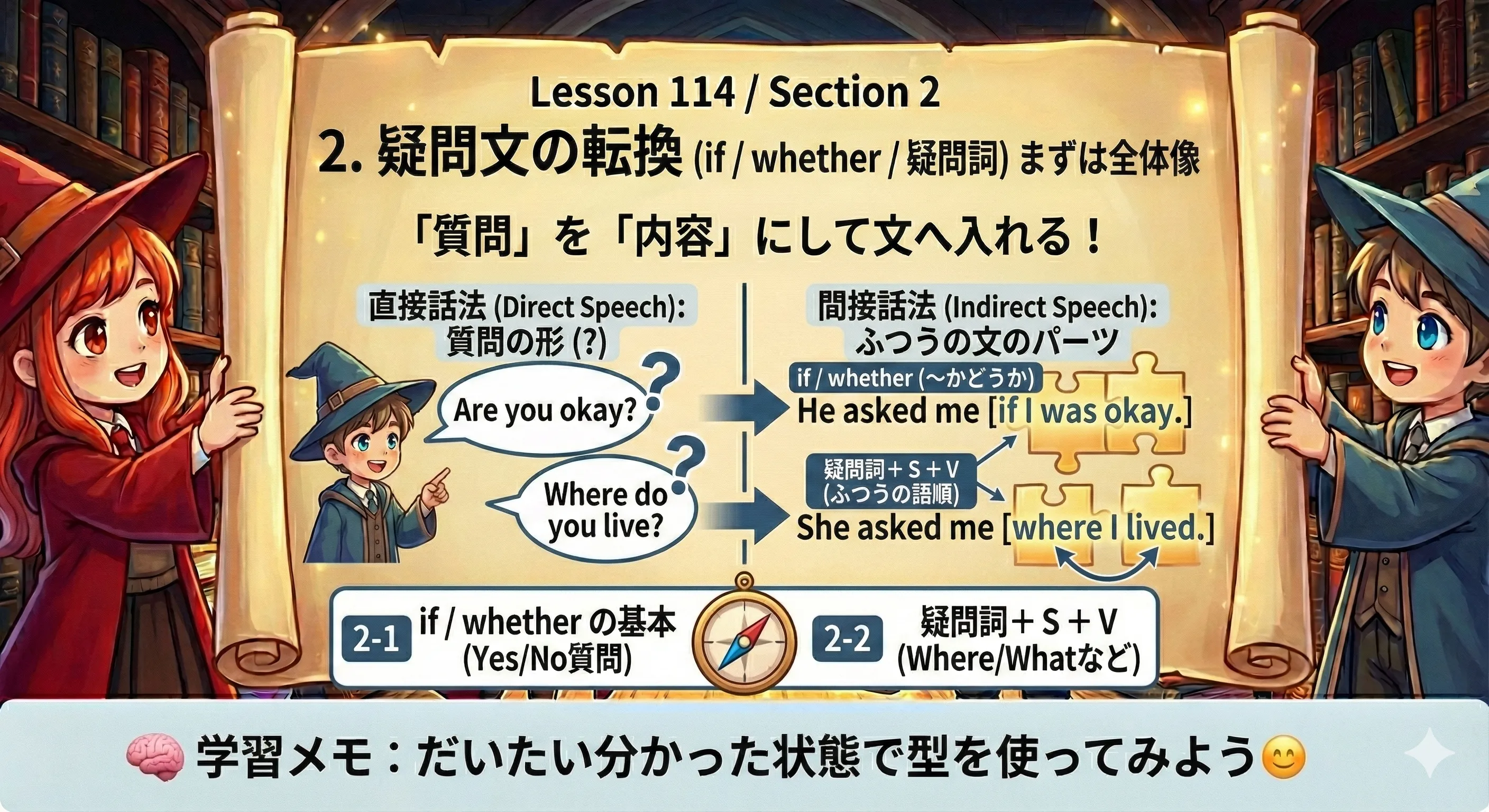
🧩 「質問」を「内容」にして文へ入れる!Section 2 のゴール
直接話法の質問は ? で終わることが多いですよね。
でも間接話法では、質問を “ふつうの文のパーツ” として組み込みます。
(小学生向け:質問を「〜かどうか」や「どこか」に言いかえる)
「〜ですか?」のタイプは if / whether で
「〜かどうか」にして入れます。
「どこで?何を?」のタイプは 疑問詞を残して、 中の語順を「ふつうの文」に直します。
あとは「どの質問タイプか」を見分けて、型に当てはめるだけです😊
🧭 次はどちらから読む? 2-1 ~ 2-2 へのナビゲーション
まずは気になる方からでOKです😊
「Yes/No の質問が苦手」なら 2-1、
「Where / What が混ざると混乱する」なら 2-2 から進みましょう。
人は「完璧に分かってから始める」よりも、 「だいたい分かった状態でまず型を使ってみる」 方が、記憶に残りやすく学習が続きやすいです😊
🎈 ミニ例文(「質問→内容」のイメージだけ先に)
He asked me if I was okay.
(彼は私に、大丈夫かどうか聞いた。)
She asked me where I lived.
(彼女は私に、どこに住んでいるのか聞いた。)
2-1. 一般疑問文(if / whether)
このパートでは、Yes / No で答える質問(一般疑問文)を、
if / whether を使って
「質問の形」→「内容(文の部品)」
に変えるコツをつかみます😊
※ 一般疑問文(Yes/No で答える質問)=「〜ですか?」「〜したの?」の形
ポイントはシンプルに 2 つだけ👇
①
if / whether を置く(「〜かどうか」)
②
語順を ふつうの文 に戻す(疑問の“ひっくり返し”を元に戻す)
🧭 図でつかむ:Yes/No の質問 → if / whether で「内容」に変換
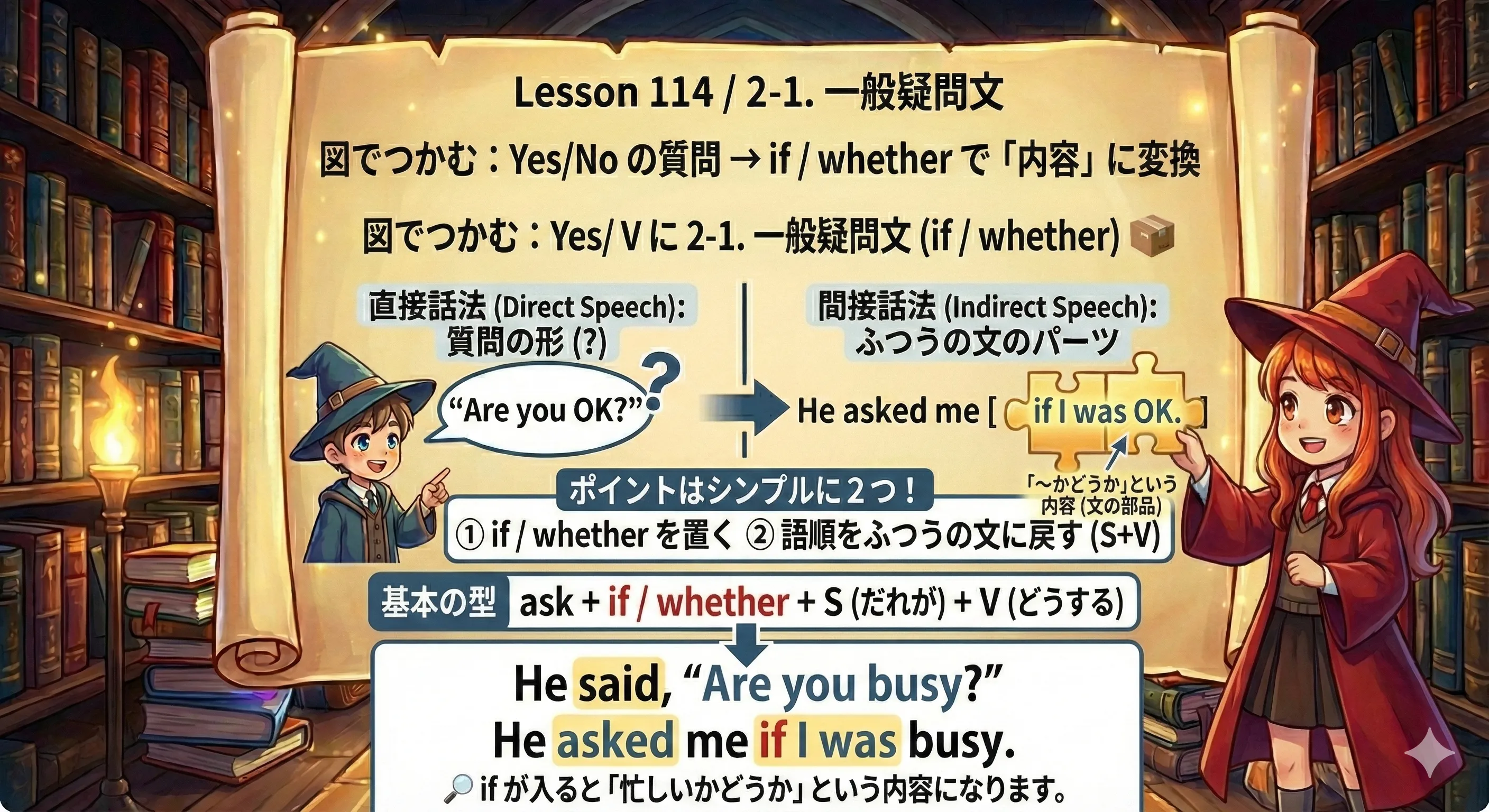
if / whether でつないで
「OK かどうか」という 内容 にします😊
※ “内容” にすると、文の中にスッと入れられるようになります(作文がラクになる✨)
🧩 基本の型:ask + if / whether + S + V(まずは骨組み)
一般疑問文(Yes/No の質問)を間接話法にするときは、
まずこの骨組みを置けば OK です😊
型
ask + if / whether + S + V
※ S(主語)=だれが/V(動詞)=どうする、のこと(小学生向けに言うと「だれが+どうする」)
if / whether は「〜かどうか」の合図。まず置いてから中身を作ると迷いません✨
He said, "Are you busy?"
(彼は「忙しい?」と言った。)
He asked me if I was busy.
(彼は私に忙しいかどうか尋ねた。)
🔎 if が入ると「忙しいかどうか」という 内容 になります。
She said, "Do you like coffee?"
(彼女は「コーヒー好き?」と言った。)
She asked him whether he liked coffee.
(彼女は彼にコーヒーが好きかどうか尋ねた。)
💡 whether は少しかため(フォーマル寄り)に感じることがあります。
Tom said, "Can you swim?"
(トムは「泳げる?」と言った。)
Tom asked me if I could swim.
(トムは私に泳げるかどうか尋ねた。)
🕒 can が could になるのは「時制の一致(時間をそろえる)」の影響です(この後で詳しく!)。
🔄 語順のコツ:疑問の “ひっくり返し” を戻す(do / does / did も消える)
一般疑問文は、ふつうの文を
「質問用にひっくり返した形」
です。だから間接話法では、ふつうの語順(S + V) に戻します😊
特に Do you ...? の do は「質問のスイッチ」なので、
間接話法では 消えて、
中身の動詞(play / like / know など)だけが残ります。
- まず if / whether を置く(「〜かどうか」)
- 語順を S + V に戻す(Are you → you are)
-
do / does / didは 消して、動詞の中身だけ残す
| 🔎 直接話法(質問の形) | ✅ 間接話法(内容の形) |
|---|---|
| Are you tired? |
if you are tired
語順を戻す
|
| Do you like music? |
if you like music
do は消える
|
| Did you see it? |
if you saw it / you had seen it
時制は文脈で
|
He said, "Do you know her?"
(彼は「彼女を知ってる?」と言った。)
He asked me if I knew her.
(彼は私に彼女を知っているかどうか尋ねた。)
✅ Do you know → if I knew(do は消えて 中身だけ残る)
She said, "Does he work here?"
(彼女は「彼はここで働いてるの?」と言った。)
She asked if he worked there.
(彼女は彼がそこで働いているかどうか尋ねた。)
🔎 Does he work は「質問用」。間接話法では he worked のように中身へ。
They said, "Did you see the movie?"
(彼らは「その映画見た?」と言った。)
They asked me if I had seen the movie.
(彼らは私にその映画を見たかどうか尋ねた。)
🕒 did が消えたあと、文脈で had seen(過去より前)になることがあります。
完璧に覚えてから進むより、「型を知った状態で例文を何回も見る」ほうが、 スッと身につきやすいです😊
🎛️ if と whether の使い分け(基本は if、かたい場面・選択は whether)
どちらも「〜かどうか」を作れますが、まずは
基本は if
でOKです😊
そのうえで whether は
「どっち?」の選択 や
少しかたい言い方 に向く、
というイメージを持つと迷いません。
🟦 まずは if(会話でよく使う)
- ふだんの会話・文章でよく出る
- 「〜かどうか」だけを言いたい時に便利
- 迷ったら if を選んでOK
🟨 whether(選択・かため)
- A or B の「どっち?」が入ると強い
- or not(来る/来ない)みたいに両方を含めたい時に便利
- 少しかたい文章・説明にも相性がよい
基本 ふつうは
if でOK。選択 「A か B か」や「〜する/しない」をハッキリ出すなら
whether が得意です✨
She said, "Are you ready?"
(彼女は「準備できた?」と言った。)
She asked me if I was ready.
(彼女は私に準備できているかどうか尋ねた。)
💡 迷ったら if でOK(いちばん登場回数が多い)
She said, "Do you want tea or coffee?"
(彼女は「紅茶とコーヒー、どっちがいい?」と言った。)
She asked me whether I wanted tea or coffee.
(彼女は私に紅茶かコーヒーのどちらがいいか尋ねた。)
☑「A or B」があると whether が自然(どっち?の感じが出る)
He said, "Are you coming or not?"
(彼は「来るの?来ないの?」と言った。)
He asked me whether I was coming or not.
(彼は私に来るのか来ないのか尋ねた。)
🧠 「来る/来ない」を両方含める時は whether ... or not が便利
❓「?」は消える:間接話法では “質問マーク” を使わない
直接話法では質問なので ? を使いますが、
間接話法では「質問の形」ではなく
“内容(〜かどうか)”
として文の中に入るので、ふつうは ピリオド . で終わります😊
(小学生向けに言い換えると:もう「聞く形」じゃなくて「説明する形」になるから、? を使わないよ)
①
if / whether がある?② 語順が S + V になってる?
③ 文末が
? じゃなく . になってる?
間接話法は「質問(?)」じゃなくて「内容(〜かどうか)」にするから、 最後は . が基本 ✨
He said, "Are you okay?"
(彼は「大丈夫?」と言った。)
He asked me if I was okay.
(彼は私に大丈夫かどうか尋ねた。)
✅ 間接話法は文の中の「内容」になるので ? は使いません
She said, "Do you have time?"
(彼女は「時間ある?」と言った。)
She asked if I had time.
(彼女は私に時間があるかどうか尋ねた。)
🔎 Do you have → if I had(質問スイッチの do は消える)
×
He asked me if I was okay?
(文のパーツなのに ? を残してしまうミス)
○
He asked me if I was okay.
(間接話法は “説明する形” なので .)
✅ 見た目で直せるので安心!「if/whether + S + V + .」が基本形です😊
⏳ 時制の一致:時間をそろえる(現在→過去、will→would など)
間接話法では、伝える動詞(asked など)が 過去 になることが多いです。
そのとき、文の中の時間も 同じ方向(過去側) にそろえるのが
時制の一致(時間をそろえるルール)です😊
(小学生向けに言うと:「“前の話” をするなら、中の文も “前っぽく” する」イメージ)
said / asked が過去なら、 中の文も ひとつ前の時間 にずらすことが多いです✨
| 🔎 直接話法(元の時間) | ✅ 間接話法(そろえた時間) |
|---|---|
am / is / are |
was / were 現在→過去 |
do / does |
did |
did |
had + 過去分詞 過去→過去完了 |
will |
would 未来→過去の未来 |
can |
could |
He said, "Are you hungry?"
(彼は「お腹すいた?」と言った。)
He asked me if I was hungry.
(彼は私にお腹がすいているかどうか尋ねた。)
⏳ are → was(伝達動詞が過去なので、中も過去寄り)
She said, "Do you like cats?"
(彼女は「ネコ好き?」と言った。)
She asked if I liked cats.
(彼女は私にネコが好きかどうか尋ねた。)
🔎 Do you like → if I liked(do は消えて、動詞が過去寄り)
They said, "Will you come tomorrow?"
(彼らは「明日来る?」と言った。)
They asked me if I would come the next day.
(彼らは私に翌日来るかどうか尋ねた。)
📌 will → would(「未来」を「過去から見た未来」にそろえる)
🧭 whether の得意技:or not / A or B(「どっち?」を文に入れる)
whether は「〜かどうか」だけでなく、
選択(どっち?)
を文の中に入れるのが得意です😊
(小学生向けに言うと:“A か B か” をそのまま文に入れられる)
🌓
whether ... or not
「する/しない」の 両方 をセットで言える。
迷いがある感じも出せます。
☕
whether A or B
「A か B か」の 選択 をそのまま入れられる。
英作文がスッキリします✨
He said, "Are you joining us or not?"
(彼は「一緒に来るの?来ないの?」と言った。)
He asked me whether I was joining them or not.
(彼は私に、彼らと一緒に行くのか行かないのか尋ねた。)
🌓 「する/しない」をハッキリ両方入れられるのが whether ... or not
She said, "Do you prefer a window seat or an aisle seat?"
(彼女は「窓側と通路側、どっちがいい?」と言った。)
She asked me whether I preferred a window seat or an aisle seat.
(彼女は私に、窓側か通路側のどちらがいいか尋ねた。)
☕ 「A か B か」をそのまま文に入れられるので、文がきれいにまとまります
✅ どっちでもOK(ただの「〜かどうか」)
He asked me if I was free.
He asked me whether I was free.
(彼は私に暇かどうか尋ねた。)
⭐ 選択があるなら whether が自然
He asked me whether I was free or not.
He asked me whether I wanted pizza or pasta.
(彼は私に、暇なのか暇じゃないのか尋ねた。/ピザかパスタどちらがいいか尋ねた。)
✅ まとめ:基本は if、選択・or not は whether のイメージでOK😊
🧯 よくあるミス集(やさしく矯正):見た目チェック3点
一般疑問文(if / whether)の間接話法は、
“形(見た目)” で直せるミスが多いです😊
ここは「やり直しやすい場所」なので安心してください。
①if / whether がある?
②語順が S + V になってる?(疑問の “ひっくり返し” を戻す)
③文末が . になってる?(
? を消す)
×
He asked me if I was tired?
間接話法は「質問の形」ではなく「内容」を入れる形なので、? は使いません。
○
He asked me if I was tired.
×
She asked if was I late.
if/whether の後ろは
平叙文の語順(S + V) です。
○
She asked if I was late.
×
He asked if I did like it.
質問スイッチの do/does/did は、
間接話法では 消えて、
本体の動詞に吸収されます。
○
He asked if I liked it.
×
He asked me I was free.
「〜かどうか」のスイッチ役が必要なので、
if / whether を入れましょう。
○
He asked me if I was free.
He said, "Are you busy?"
(彼は「忙しい?」と言った。)
He asked me if I was busy.
(彼は私に忙しいかどうか尋ねた。)
She said, "Do you know him?"
(彼女は「彼のこと知ってる?」と言った。)
She asked if I knew him.
(彼女は私に彼を知っているかどうか尋ねた。)
They said, "Is it Monday or Tuesday?"
(彼らは「月曜?火曜?」と言った。)
They asked whether it was Monday or Tuesday.
(彼らはそれが月曜か火曜か尋ねた。)
✅ 2-1 まとめ:一般疑問文を「内容の文」にするコツ
一般疑問文(Yes / No で答える質問)を間接話法にするときは、 「質問の形」から「内容(〜かどうか)」に変えるのがポイントでした😊
🧩 骨組み(まずこれだけ)
型
ask + if/whether + S + V
if は基本。whether は 選択(A or B / or not) が得意。
👀 見た目チェック(3点だけ)
- if / whether が入っている
- 語順が S + V(ひっくり返しを戻す)
- 文末は .(
?は使わない)
ここまでできたら、あなたはもう 「質問を文章に入れる感覚」 をつかみ始めています✨
完璧じゃなくてOK。まずは 型どおりに1文作れる だけで、次の学習がグッと楽になります😊
2-2. 特殊疑問文(疑問詞+S+V)
Where / What / Who / When / Why / How みたいな
疑問詞(質問のスタート合図)つきの文を、
間接話法(=質問を「内容の文」にして文の中へ入れる形)に変える練習です✨
ここではまず、型と語順だけ押さえて「変換できた!」を増やしましょう😊
「疑問詞は残す」+「語順は S+V に戻す」+「?は使わない」
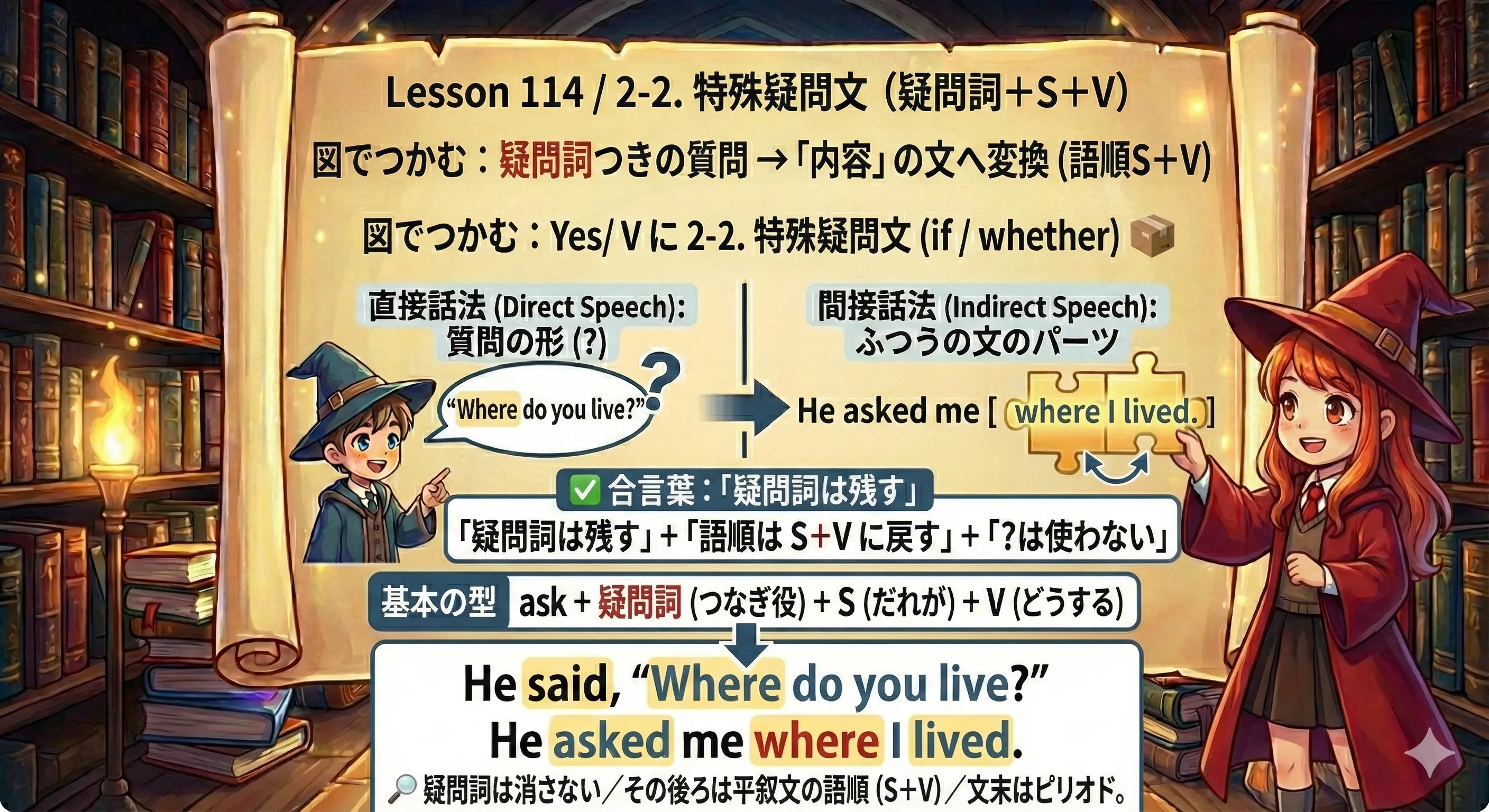
🧩 基本の型:ask + 疑問詞 + S + V(まずは骨組み)
特殊疑問文は、if / whether を使う代わりに、
疑問詞そのものが「つなぎ役」になります。
(疑問詞=「どこ/なに/いつ」みたいな質問スタートの言葉)
型
ask + 疑問詞 + S + V
✅ ポイント:疑問詞は消さない/その後ろは平叙文の語順(S+V)/文末は.
He said, 'Where do you live?'
(彼は「どこに住んでいるの?」と言った。)
He asked me where I lived.
(彼は私にどこに住んでいるのか尋ねた。)
She said, 'When will you come back?'
(彼女は「いつ戻るの?」と言った。)
She asked me when I would come back.
(彼女は私にいつ戻るのか尋ねた。)
They said, 'Why are you late?'
(彼らは「なぜ遅れたの?」と言った。)
They asked me why I was late.
(彼らは私に、なぜ遅れたのか尋ねた。)
🔁 語順のコツ:疑問の「ひっくり返し」を戻す(do/does/did も消える)
質問の文は、助動詞(do/does/did など)や be動詞が前に出て
語順がひっくり返ることがあります。
でも間接話法では、ふつうの文の並び(S+V)に戻します😊
🧭 3ステップ(迷ったらこれ)
-
疑問詞はそのまま(
what,whereなど) - 後ろは S+V に戻す
-
do/does/didは 消える(質問のスイッチだから)
質問の
do は「質問ボタン」みたいなもの。間接話法では質問じゃなくなるので、ボタンは外して中身の文だけにします✨
She said, 'What do you want?'
(彼女は「何がほしいの?」と言った。)
She asked me what I wanted.
(彼女は私に何が欲しいのか尋ねた。)
He said, 'Where did you buy it?'
(彼は「それ、どこで買ったの?」と言った。)
He asked me where I had bought it.
(彼は私にそれをどこで買ったのか尋ねた。)
💡 did は消えて、 買った(過去)の情報が文の中に吸収されます。
Tom said, 'How are you feeling today?'
(トムは「今日の調子どう?」と言った。)
Tom asked me how I was feeling that day.
(トムは私にその日の体調がどうか尋ねた。)
❓「?」は消える:間接話法では質問マークを使わない
直接話法はそのまま質問なので ? を使います。
でも間接話法は「質問を内容の文にして入れこむ」形なので、
見た目は質問文じゃありません。だから ? は使わず、
ふつうは . で終わります😊
① 疑問詞は残す(
where/what など)/
② 語順は S+V/
③ 文末は .(? はなし)
He said, 'Where is the station?'
(彼は「駅はどこですか?」と言った。)
He asked me where the station was.
(彼は私に駅がどこにあるのか尋ねた。)
She said, 'What time does the meeting start?'
(彼女は「会議は何時に始まりますか?」と言った。)
She asked what time the meeting started.
(彼女は会議が何時に始まるのか尋ねた。)
My mom said, 'Why are you crying?'
(母は「なんで泣いているの?」と言った。)
My mom asked me why I was crying.
(母は私に、なぜ泣いているのか尋ねた。)
⏳ 時制の一致:時間をそろえる(現在→過去、will→would など)
伝達動詞(asked など)が過去のときは、
中の文も過去寄りにそろえることが多いです。
(時制=「いつの話か」を表す形。現在・過去など)
よく出る変化
am / is / are → was / were
do / does →(消えて)V-ed
未来の変化
will → would
can → could
完璧よりも、変換できた回数が増えるほど上達します✨
He said, 'Where is my phone?'
(彼は「私のスマホはどこ?」と言った。)
He asked where his phone was.
(彼は自分のスマホがどこにあるのか尋ねた。)
She said, 'When will you arrive?'
(彼女は「いつ到着するの?」と言った。)
She asked me when I would arrive.
(彼女は私にいつ到着するのか尋ねた。)
They said, 'What can you do?'
(彼らは「あなたは何ができるの?」と言った。)
They asked me what I could do.
(彼らは私に何ができるのか尋ねた。)
🧠 疑問詞が「主語」のとき:Who/What + V(ここは別ルールっぽく見える)
ふつうの疑問文は do/does/did が出てきて語順がひっくり返りますよね。
でも Who/What が主語(だれが/なにが) の質問は、
そもそも do/does/did が出ません。見た目が「平叙文っぽい」ので混乱しがちです😵💫
✅ 見分けポイント:
主語の Who
Who の直後に 動詞 が来る(Who came, Who called)
目的語の Who
Who の後ろに 主語 が来る(Who did you meet)
「だれがやった?」は主語の質問。だから
do はいらない=
間接話法でも S+V に戻す作業がほぼ不要なことが多いです✨
He said, 'Who broke the window?'
(彼は「だれが窓を割ったの?」と言った。)
He asked who had broken the window.
(彼はだれが窓を割ったのか尋ねた。)
She said, 'Who called you last night?'
(彼女は「昨夜だれがあなたに電話したの?」と言った。)
She asked who had called me the night before.
(彼女は前の晩、だれが私に電話したのか尋ねた。)
They said, 'What happened here?'
(彼らは「ここで何が起きたの?」と言った。)
They asked what had happened there.
(彼らはそこで何が起きたのか尋ねた。)
🧭 前置詞がからむ疑問:Where … from / Who … to(「〜に」「〜から」も入れられる)
前置詞(from/to/for など)は、
「〜から」「〜に」「〜のために」みたいな向き・関係をつけるパーツです。
間接話法では、疑問詞は残しつつ、文の中に自然に入れます😊
✅ まずはこの形でOK(会話で自然):
例
where + S + be + from / who + S + talked to / what + it + is + for
※ かたい書き方(to whom など)もありますが、ここではまず「使える形」を優先します✨
He said, 'Where are you from?'
(彼は「どこ出身ですか?」と言った。)
He asked me where I was from.
(彼は私にどこ出身なのか尋ねた。)
She said, 'Who did you send the email to?'
(彼女は「だれにメールを送ったの?」と言った。)
She asked me who I had sent the email to.
(彼女は私に、だれにメールを送ったのか尋ねた。)
They said, 'What is this button for?'
(彼らは「このボタンは何のため?」と言った。)
They asked what that button was for.
(彼らはそのボタンが何のためのものか尋ねた。)
✅ 2-2 まとめ:特殊疑問文は「疑問詞を残して、文の形にする」
特殊疑問文(疑問詞つきの質問)は、間接話法にすると
「質問」ではなく「内容の文」になります。
だから、疑問詞は残して、あとは S+V の形に整えるだけでOKです😊
🧾 まずはこれだけ(5点チェック)
- 疑問詞は 残す(
where/what/who…) - 語順は S+V に戻す(
do/does/didは消える) - ? は使わず、基本は . で終わる
- 時制の一致:asked が過去なら中も過去寄り(
will → wouldなど) - 主語の
Who/Whatは別枠:Who + V(do が出ない)
あとは例文を見ながら「疑問詞を残して、文の形にする」を繰り返すだけ。
完璧を目指すより、できた回数を増やす方が、上達が速いです😊
3. 命令文の転換:被伝達文を to 不定詞でまとめ、伝達動詞を使い分ける(まずは全体像)
このセクションは、英語の「転換(直接話法 → 間接話法)」の入口です😊
たとえば He said to me, "Go at once." のような言い方(直接話法=セリフをそのまま引用)を、
He told me to go at once. のように
「報告の文」へ作り直す練習をします(間接話法=言い換えて伝える)。
ここでは詳しい説明に入る前に、「どの内容なら、どの動詞を選ぶか」を先に地図でつかみましょう✨
ここで出る言葉は2つだけ覚えればOKです👌
被伝達文(伝える中身の文=「命令・依頼・忠告・勧誘」など)と、
伝達動詞(say の代わりに使う動詞=tell / ask / advise / suggest など)です。
🧭 図でつかむ:He said to 人, "..." → 伝達動詞 + 人 + to
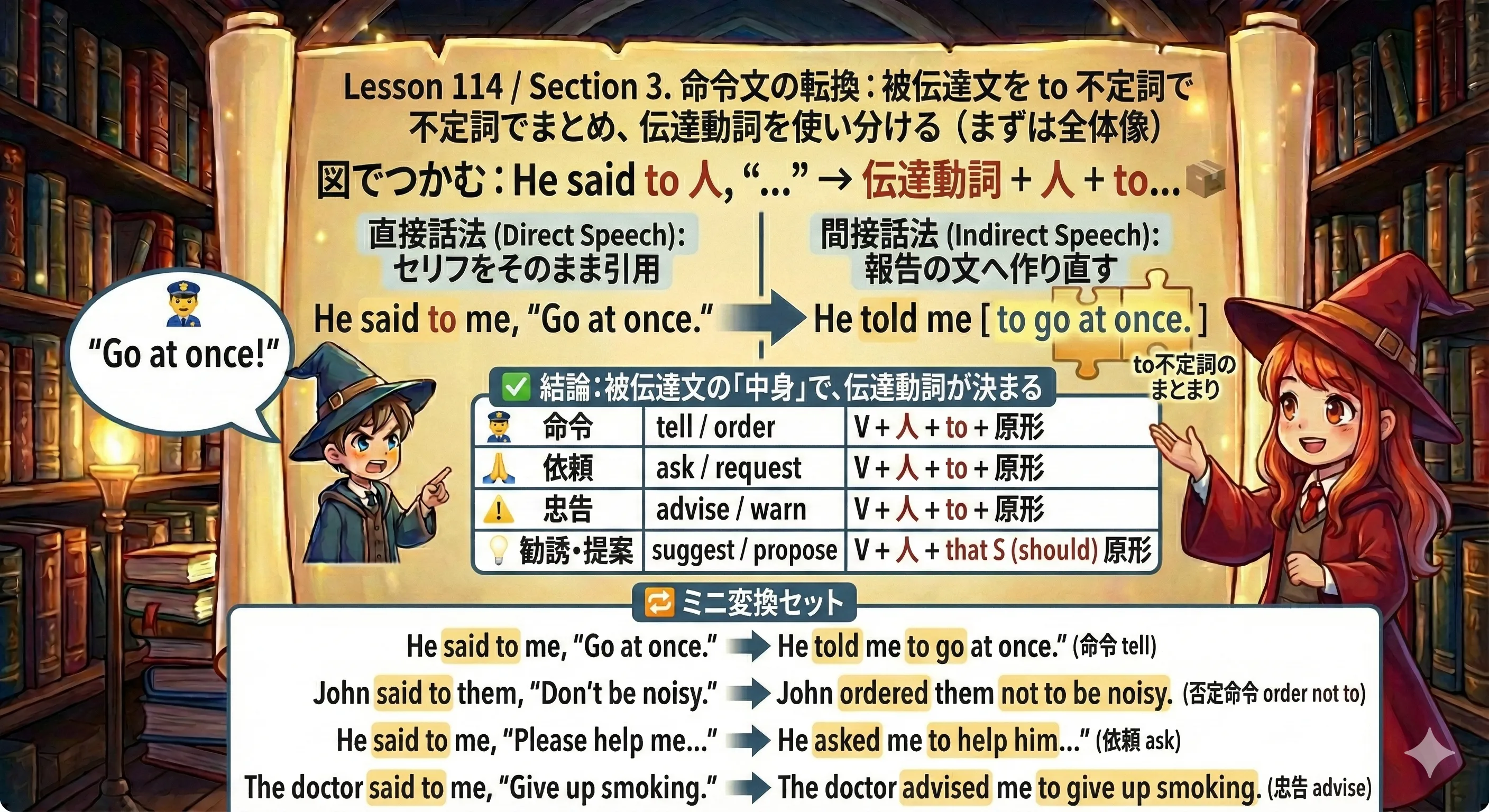
🧩 結論:被伝達文の「中身」で、伝達動詞が決まる
転換のコツはシンプルです😊
「言った内容が命令なのか?依頼なのか?忠告なのか?勧誘なのか?」
を先に決めて、ぴったりの伝達動詞を選びます。
※ 伝達動詞(かんたん言い換え):say の代わりに「命じた/頼んだ/忠告した/提案した」をはっきり言える動詞
| 被伝達文の中身 | よく使う伝達動詞 | 転換の形 |
|---|---|---|
| 👮 命令(強め) |
tell / order / command / bid
|
V + 人 + to + 原形否定: not / never to
|
| 🙏 依頼(丁寧) |
ask / request / beg
|
V + 人 + to + 原形
|
| ⚠️ 忠告(相手のため) |
advise / warn
|
V + 人 + to + 原形否定: not to
|
| 💡 勧誘・提案(Let’s) |
suggest / propose
|
V + 人 + that S (should) 原形should 省略=原形のまま(仮定法現在) |
🔁 ミニ変換セット:この形を見れば、章の方向性が一瞬でわかる
He said to me, "Go at once."
(彼は私に「すぐ行け」と言った。)
He told me to go at once.
(彼は私にすぐ行くように命じた。)
John said to them, "Don't be noisy."
(ジョンは彼らに「騒ぐな」と言った。)
John ordered them not to be noisy.
(騒がしくしないようにとジョンは彼らに命じた。)
He said to me, "Please help me with my work."
(彼は私に「仕事を手伝ってください」と言った。)
He asked me to help him with his work.
(彼は私に仕事を手伝ってほしいと頼んだ。)
me → him / my → his
(話し手が変わると、言い方も変わる)
The doctor said to me, "Give up smoking."
(医者は私に「禁煙しなさい」と言った。)
The doctor advised me to give up smoking.
(医者は私に禁煙するよう忠告した。)
🗺️ 次はどちらから読む? 3-1 ~ 3-4 へのナビゲーション
ここは「入口」なので、順番は自由です😊
迷ったら、自分がよく使う場面(命令/依頼/忠告/提案)から進むのが最短ルートです。
転換は「完璧に暗記してから」より、 「型を見ながら何回も変換してみる」 方が、早く身につきます😊
次は 3-1〜3-4 のどれか1つを選んで、同じパターンで “変換練習” を始めましょう✨
3-1. 被伝達文が命令:tell / order / command / bid + 人 + to に転換する
命令のセリフ(例:"Go at once.")を、
引用("...")なしで
きれいな「報告の文」に直すパートです😊
命令の転換では、被伝達部(伝える中身)を
to + 動詞(to不定詞:to の後ろは動詞の原形)でまとめ、
内容に合う伝達動詞(tell / order / command / bid)を選びます。
※ 被伝達文=「引用の中のセリフ」/伝達動詞=say の代わりに「命じた」と言える動詞
まずは 型を見て、 次に 動詞の強さ をつかむ流れでOK✨ 見た目は難しそうでも、やることはシンプルです!
🧭
図でつかむ:命令のセリフ → V + 人 + to に作り替える
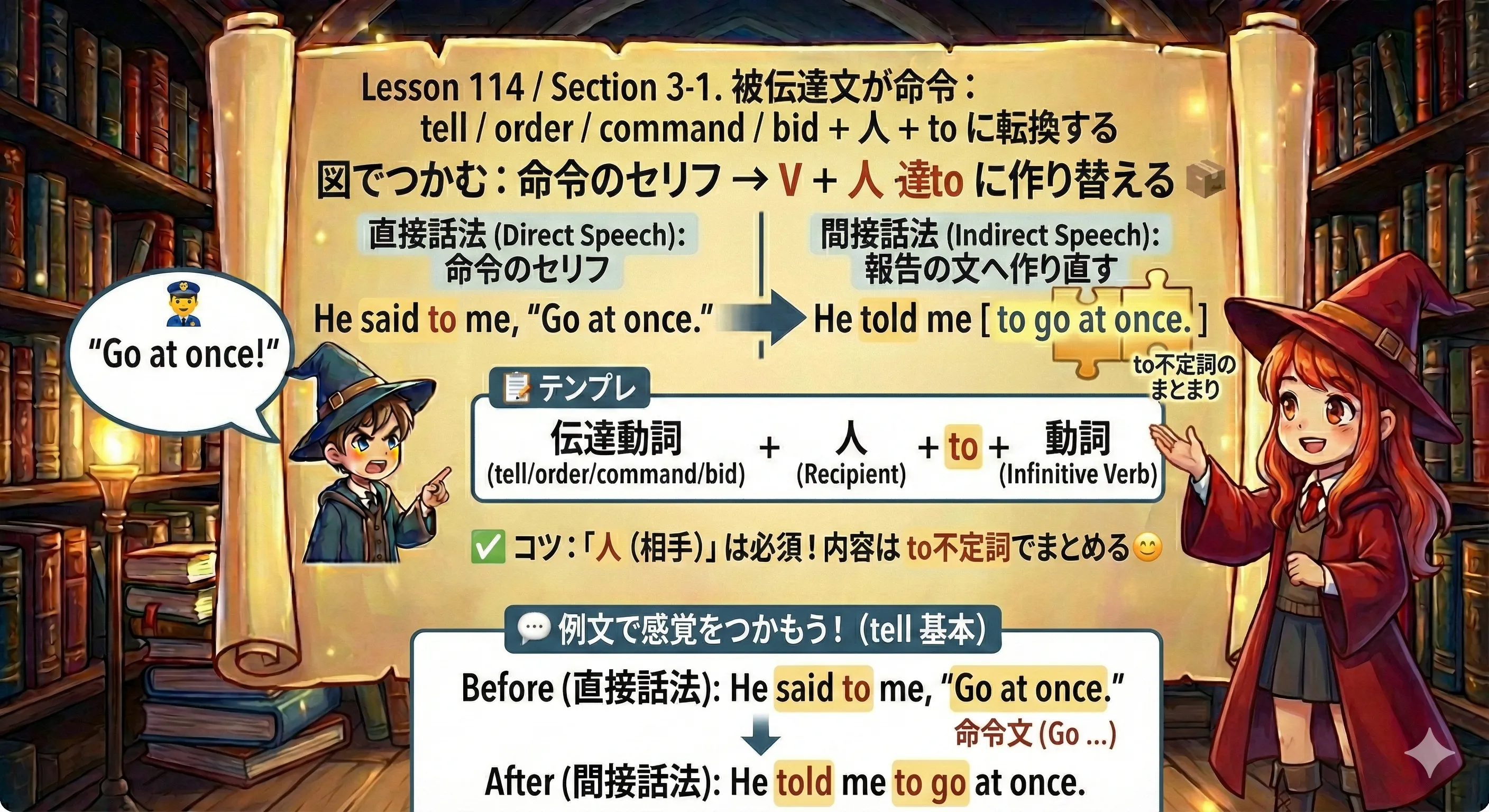
3-1-1. まずは型:tell / order / command / bid + 人 + to + 動詞
命令の転換は、ここが最重要です👇
「人(相手)」が必須(抜けるとミスになりやすい)、
そして内容は to不定詞でまとめます😊
He said to + 人, "命令文."
He + 伝達動詞 + 人 + to + 動詞原形 ...
💬 例文で感覚をつかもう!(命令 → to不定詞)
He said to me, "Go at once."
(彼は私に「すぐ行け」と言った。)
Go ...)
He told me to go at once.
(彼は私にすぐ行くように命じた。)
told + 人 + to + 動詞(人→to の順)
He told to go... のように「人」を抜くのが定番ミス。
John said to them, "Put the room in order."
(ジョンは彼らに「部屋を片付けろ」と言った。)
Put ... → 後で to put に
John ordered them to put the room in order.
(ジョンは彼らに部屋を片付けるよう命じた。)
order は はっきり強め(規則・立場の強さが出やすい)
The captain said to the soldiers, "Stand still."
(隊長は兵士たちに「動くな」と言った。)
The captain commanded the soldiers to stand still.
(隊長は兵士たちに動かないよう命令した。)
command は 公的・組織的な命令でよく出ます📚
3-1-2. 動詞の使い分け:強さと立場(tell / order / command / bid)
どれも「命じる」ですが、強さと
立場(権限っぽさ)が違います😊
ざっくりはこの並びでOK:
tell(ふつう) →
order(強め) →
command(公式・硬い) →
bid(古め/文語)
(昔っぽい文章で見かける)
| 動詞 | イメージ | よくある場面 |
|---|---|---|
🗣️ tell |
日常の指示(言いつける) | 家庭・職場 |
👮 order |
はっきり命令(強め) | 現場・規則 |
🪖 command |
公式・硬い命令(権限感) | 組織・公式 |
📜 bid |
古めの「命じる」(文語) | 物語・文章 |
「誰が誰に言う?」で決めるとラクです。
上の立場が強く命じる → order / command、 ふだんの指示 → tell の感覚でOK😊
① tell: She told him to wait outside. ② order: The guard ordered him to wait outside. ③ command: The officer commanded them to wait outside.
(① 彼女は彼に外で待つよう言った。)
(② 警備員は彼に外で待つよう命じた。)
(③ 将校は彼らに外で待つよう命令した。)
The king said to his men, "Bring me the map."
(王は部下たちに「地図を持ってこい」と言った。)
The king bade his men to bring him the map.
(王は部下たちに地図を持ってくるよう命じた。)
bade は bid の過去形としてよく出ます(文章寄り)📚
3-1-3. 否定命令:「〜するな」= not / never to
「〜するな」の命令は、
to不定詞の前に
not または
never を置きます😊
✅ かんたん:not=普通の禁止/never=「絶対にするな」(禁止が強い)
not / never は “to の直前”(ここがズレるとミスになりやすい!)
① 直接話法(引用)
John said to them, "Don't be noisy."
(ジョンは彼らに「騒ぐな」と言った。)
② 間接話法(転換)
John ordered them not to be noisy.
(ジョンは彼らに騒がしくしないよう命じた。)
She told me not to touch it.
(彼女は私にそれに触らないよう言いつけた。)
The teacher ordered us never to use our phones in class.
(先生は私たちに授業中は決してスマホを使わないよう命じた。)
3-1-4. よくあるミス:人が抜ける/語順がズレる/sayのまま
ここでミスを先に潰しておくと、転換問題が一気に安定します😊
特にこの3つは出やすいので、「見た瞬間に直せる」状態にしておきましょう!
- ✅ 伝達動詞の後ろに 人(目的語) がある? (誰に?が見える?)
- ✅ 否定は not / never + to の順? (to の前に not)
-
✅
sayをtell / order / command / bidに置き換えてる? (say のまま乗せない)
❌ He told to leave. ✅ He told me to leave.
(❌ 彼は出て行けと言った。)※誰に?がない
(✅ 彼は私に出て行くよう言った。)
me / him / her / them など)。
❌ She told me to not touch it. ✅ She told me not to touch it.
(❌ 彼女は私に触らないよう言った。)
(✅ 彼女は私に触らないよう言った。)
❌ He said me to go at once. ✅ He told me to go at once.
(❌ 彼は私にすぐ行くよう言った。)
(✅ 彼は私にすぐ行くよう命じた。)
次は練習で「直接→間接」を何度か回すだけ。型が体に入ると、英文がスイスイ作れるようになります✨
3-1-5. 受動態でも言える:be told / be ordered / be commanded to
命令の転換は、受動態(受け身)でもよく使います😊
「誰が命じたか」よりも、自分が何を言われたかを前に出したいときに便利です。
※ 受動態=「〜される」/「言われる」の形(主語が“受ける側”になる)
-
be told + to + 動詞(〜するように言われる) -
be ordered + to + 動詞(〜するように命じられる:強め) -
be commanded + to + 動詞(〜するように命令される:公式・硬め)
「上司に命じられた」「規則で求められた」など、“言われた側”を主語にしたい場面で大活躍します。
① 能動(参考)
The staff told me to wait here.
(スタッフは私にここで待つよう言った。)
② 受動(本命)
I was told to wait here.
(私はここで待つよう言われた。)
We were ordered to leave the building.
(私たちは建物から出るよう命じられた。)
order は「命令」感がはっきり。緊急対応・規則の場面で合いやすいです⚠️
The soldiers were commanded to stand still.
(兵士たちは動かないよう命令された。)
command は “権限のある命令” の響き。文章・公式の文でよく合います📘
3-1-6. まとめ:場面別に“命令の強さ”を調整しよう
命令の転換は、「どの動詞を選ぶか」で、
相手への強さ・距離感が大きく変わります😊
ここで整理しておけば、問題演習でも会話でも「これでいい?」が減ってスッキリします✨
tellふつうの「言いつける」。強すぎない命令のイメージ。
例
She told me to sit down.
(彼女は私に座るよう言った。)
orderルール・緊急時など、はっきり命令したいとき。
例
We were ordered to leave.
(私たちは出るよう命じられた。)
command役職・権限がある立場からの命令。文章でもよく見ます。
例
The soldiers were commanded to stand still.
(兵士たちは動かないよう命令された。)
bid会話ではレア。読み物で「命じる」の意味で出会うことがあります。
例
The king bade his men to leave.
(王は部下に立ち去るよう命じた。)
tell(ふつう) → order(強め) → command(公式・権限)
迷ったらまず tell を基準にしてOKです😊
① 直接話法
He said to me, "Go at once."
(彼は私に「すぐ行け」と言った。)
② 間接話法
He told me to go at once.
(彼は私にすぐ行くよう命じた。)
3-2. 被伝達文が依頼:ask / request / beg + 人 + to に転換する
「Please 〜」などのお願いのセリフ(直接話法:引用 “ ” )を、
引用なしの文(間接話法)に直す練習です😊
依頼の内容は to + 動詞(to不定詞:to の後ろは動詞の原形)でまとめます。
※ 被伝達文=「引用の中のセリフ」/伝達動詞=「言った内容を伝える動詞(ask など)」
ask(ふつう)/request(かため・フォーマル)/beg(懇願:必死にお願い)
のように、丁寧さ・かたさ・切実さを動詞で調整できると、
“英語の空気” が一気に自然になります✨
🧭
図でつかむ:依頼のセリフ → ask/request/beg + 人 + to へ
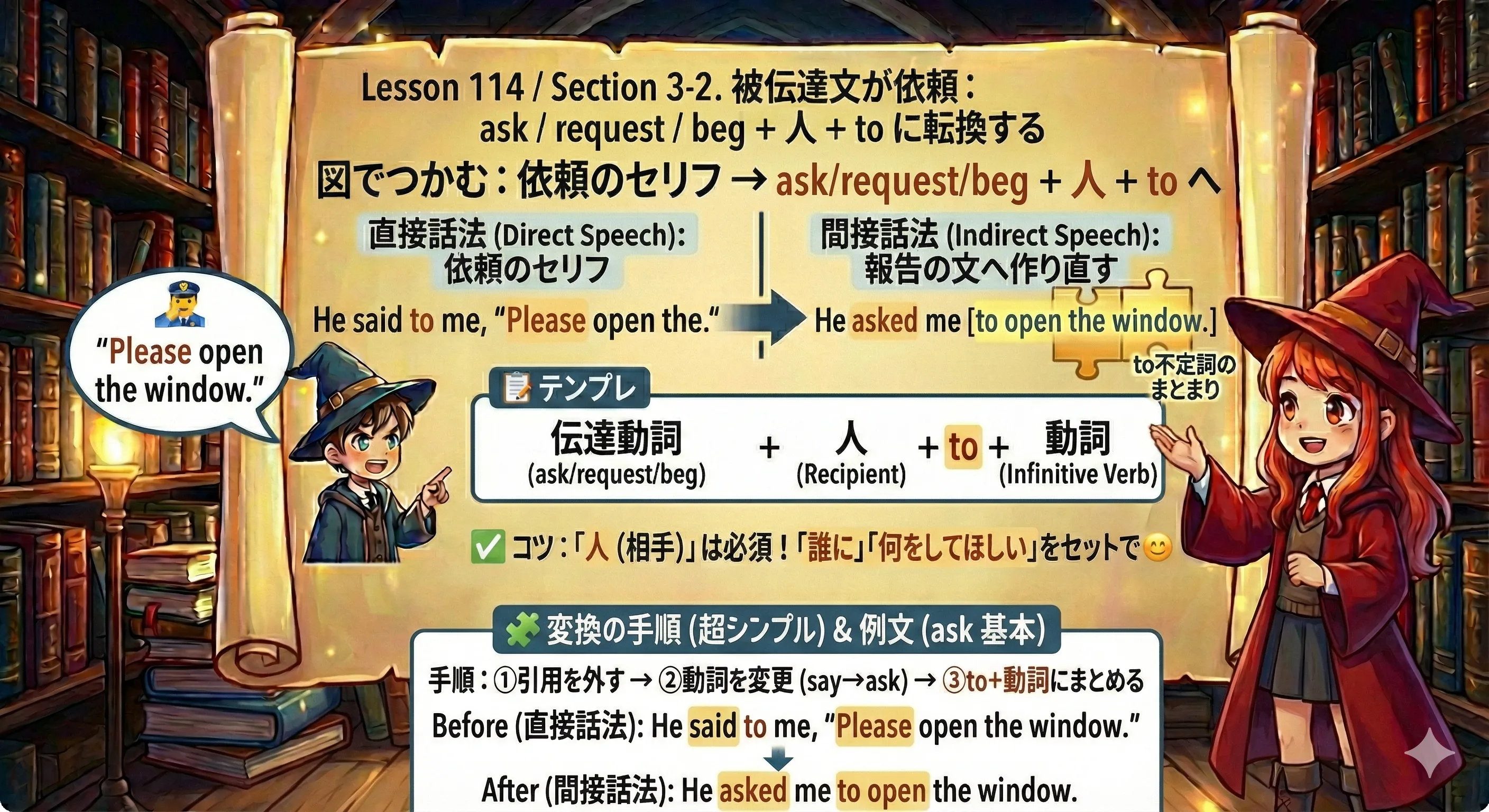
3-2-1. まずは型:ask / request / beg + 人 + to + 動詞
まずはこの「型」を丸ごと覚えましょう😊
依頼は 人(相手) が
抜けやすいので要注意です。
- 引用(
"...")を外す sayを「依頼の動詞」に変更(ask/request/beg)- 依頼内容を
to + 動詞にまとめる
He said to me, "Please open the window."
(彼は私に「窓を開けてください」と言った。)
He asked me to open the window.
(彼は私に窓を開けるよう頼んだ。)
said のままにせず、asked に変えるのがポイント!
依頼内容は to + 動詞 でまとめます😊
The clerk said to us, "Please fill out this form."
(店員は私たちに「この用紙に記入してください」と言った。)
The clerk requested us to fill out this form.
(店員は私たちにその用紙に記入するよう依頼した。)
request は「かための丁寧さ」(公式っぽい)🧑💼
案内・手続き・ビジネスで相性◎
She said to him, "Please forgive me."
(彼女は彼に「どうか許して」と言った。)
She begged him to forgive her.
(彼女は彼に許してくれるよう懇願した。)
beg は「お願い」より強い 懇願🥺
切実な場面で一気にそれっぽくなります。
say のままにしない+ 人(相手)を入れる+ to + 動詞でまとめる。 この3つで転換が安定します😊
3-2-2. 動詞の使い分け:丁寧さ・かたさ(ask / request / beg)
3つとも「頼む」ですが、英語では 空気(距離感)が変わります😊
迷ったら ask を基準にして、かためなら request、切実なら beg に切り替えるのがコツです。
| 動詞 | ニュアンス(やさしく) | 合う場面 | ひとこと |
|---|---|---|---|
🙂 ask |
ふつうにお願い(万能) | 日常 同僚・友人 | 迷ったらまずコレ! |
🧑💼 request |
丁寧でかたい(公式っぽい) | 仕事 案内・手続き | 書類・依頼文の空気 |
🥺 beg |
懇願(どうしても!) | 切実 謝罪・頼み込み | 感情が強いとき |
ask(ふつう) → request(かたい) → beg(切実) (動詞で“角度”を変えると、英語が一気に上品になります✨)
Tom said to her, "Please text me tonight."
(トムは彼女に「今夜メッセージして」と言った。)
Tom asked her to text him that night.
(トムは彼女にその夜メッセージするよう頼んだ。)
ask が自然😊(※時間語は状況で tonight → that night のように変わることがあります)
The staff said to the visitors, "Please remain seated."
(係員は来場者に「お席にお座りください」と言った。)
The staff requested the visitors to remain seated.
(係員は来場者に着席したままでいるよう依頼した。)
request がしっくり🧑💼
The boy said to his mother, "Please don't tell Dad."
(その少年は母に「お願い、パパに言わないで」と言った。)
The boy begged his mother not to tell his father.
(その少年は母に父に言わないでくれるよう懇願した。)
beg🥺
don't は not to にしてまとめるとキレイです。
例文カードは白背景にして読みやすく、内側の枠を 「黄=直接」「緑=転換」で統一するとメリハリが出ます✨
3-2-3. 否定依頼:「〜しないでください」= not to(やさしく禁止)
直接話法で Don’t ... / Please don’t ... と言っている場合は、
転換すると to の前に not を入れて
not to + 動詞 にします😊
「禁止」というより やさしく止めるお願い のイメージです。
Don’t / Please don’t + 動詞→not to + 動詞- 「しないで」と言う相手(
人)は 必ず入れる - 動詞は 原形(to の後ろはいつも原形)
He said to her, "Please don't be late."
(彼は彼女に「遅れないでください」と言った。)
He asked her not to be late.
(彼は彼女に遅れないように頼んだ。)
don't はそのまま残さず、
not to にまとめるとキレイです😊
The staff said to the guests, "Please don't take photos here."
(係員は客に「ここで写真を撮らないでください」と言った。)
The staff requested the guests not to take photos there.
(係員は客にそこで写真を撮らないよう依頼した。)
request が相性◎🧑💼
She said to him, "Please don't tell anyone."
(彼女は彼に「お願い、誰にも言わないで」と言った。)
She begged him not to tell anyone.
(彼女は彼に誰にも言わないでくれるよう懇願した。)
beg が強い味方🥺
否定は not to でスッキリ。
Don't ... を見たら not to ... に変える!
そして 人(相手) を忘れない😊
3-2-4. 依頼をもっと感じよく:please / kindly / politely の扱い(転換で消える?残す?)
結論から言うと、「please は転換で消してOK」です😊
間接話法では、丁寧さは ask / request の選び分けだけでも十分伝わることが多いです。
ただし、文章のトーン(雰囲気)を強く丁寧にしたいときは、
副詞として残すこともできます。
※ 残す=「どんな感じで頼んだか」を説明するイメージ(やさしく/丁寧に)
-
基本
直接話法の
Pleaseは、転換では消してOK(asked/requestedが丁寧さを担当) -
残す
丁寧さを強調したいなら
politely / kindlyを 動詞の近くに置く(例:politely asked) -
注意
pleaseをそのまま残すより、politely / kindlyのほうが “説明” っぽく自然になりやすい
He said to me, "Please wait here."
(彼は私に「ここで待ってください」と言った。)
He asked me to wait there.
(彼は私にそこで待つよう頼んだ。)
asked 自体に「頼んだ」が入っているので、Please は消しても丁寧さは残ります😊
She said to him, "Please speak more slowly."
(彼女は彼に「もう少しゆっくり話してください」と言った。)
She politely asked him to speak more slowly.
(彼女は彼に、もっとゆっくり話すよう丁寧に頼んだ。)
politely は「丁寧に」の説明。Please より“転換文”に馴染みやすいです😊
The guide said to us, "Please keep your voice down."
(ガイドは私たちに「声を小さくしてください」と言った。)
The guide kindly requested us to keep our voices down.
(ガイドは私たちに、声を小さくするよう丁寧に依頼した。)
kindly requested は「ご協力お願いします」系の空気に寄せたいときに便利✨
転換文では
Please は消してOK。丁寧さを“説明”したいときだけ
politely / kindly を足すのがバランス良いです😊
3-2-5. 受動態:be asked / be requested / be begged to(頼まれた)
「私は〜するよう頼まれた」のように、受け身(受動態)でも言えます😊
形はシンプルで、be + asked/requested/begged + to + 動詞。
※ 受動態=「〜される」の形(主語が“お願いを受けた側”になる)
I was asked to ...(私は〜するよう頼まれた)We were requested to ...(私たちは〜するよう依頼された)He was begged to ...(彼は〜するよう懇願された)
I was asked to join the meeting.
(私はその会議に参加するよう頼まれた。)
I にして短く言えるのが受動態の強み😊
Visitors are requested to keep their voices down.
(来場者は声を控えるよう依頼されています。)
are requested to が定番✨
He was begged to stay.
(彼は残ってくれるよう懇願された。)
beg は感情が強いので、受動態でもインパクトが出ます🥺
asked(ふつう)/requested(かため)/begged(切実)受動態でも “空気” はそのまま動詞に出ます😊
3-2-6. よくあるミスを先に防ぐ:人の位置・not の位置・say のまま
依頼の転換は型が決まっているぶん、ミスもパターン化します😊
ここで先にチェックしておくと、問題演習でもスイスイ進みます✨
ask/request/beg は「誰に?」が必須です。
依頼は 人 がないと、意味が途中で止まります。
He asked to wait there.
He asked me to wait there.
否定依頼は not を to の前に置きます。
not を後ろに置かないように注意😊
She asked him to not talk.
She asked him not to talk.
to not も見かけますが、このレッスンでは
基本形の not to で統一すると安全です。
直接話法の said を、転換後もそのまま残すのは NG💦
依頼は ask / request / beg に
必ず切り替えるのがルールです。
He said me to help him.
He asked me to help him.
「say を捨てて、ask/request/beg にする」+ 「人を入れる」+ 「to(否定は not to)」😊
3-2. まとめ:依頼は「動詞+人+to」で気持ちよく転換できる
依頼のセリフ(Please ...)は、間接話法にすると
引用なしでスマートに言えます😊
ポイントは ①動詞選び と
②人(相手) と
③to(否定は not to) の3つだけ。
-
基本
ask + 人 + to + 動詞(ふつうのお願い) -
かため
request + 人 + to + 動詞(案内・仕事の依頼) -
切実
beg + 人 + to + 動詞(懇願) -
否定
ask/request/beg + 人 + not to + 動詞
次は例文を見ながら「どの動詞が一番しっくり来るか」を選ぶだけ😊 “型” が固まると、転換問題がぐっと楽になります✨
3-3. 被伝達文が「忠告」のとき:advise / warn + 人 + to
このパートは、直接話法の命令文(例:"Stop worrying.")を、
間接話法(引用なし)でスッキリ言い換える練習です😊
キーワードは advise / warn(どちらも「忠告」だけど目的が違う動詞)+
to + 動詞(to不定詞:to の後ろに動詞の原形)です。
まずは「型」と「動詞の選び分け」をつかんで、あとで例文で感覚を固めましょう✨
※ 忠告(相手のために「こうするといいよ/気をつけて」)なので、
said をそのまま残さず、
advised / warned に言い換えるのがポイントです✅
🧭
図でつかむ:忠告の転換は advise / warn + 人 + to
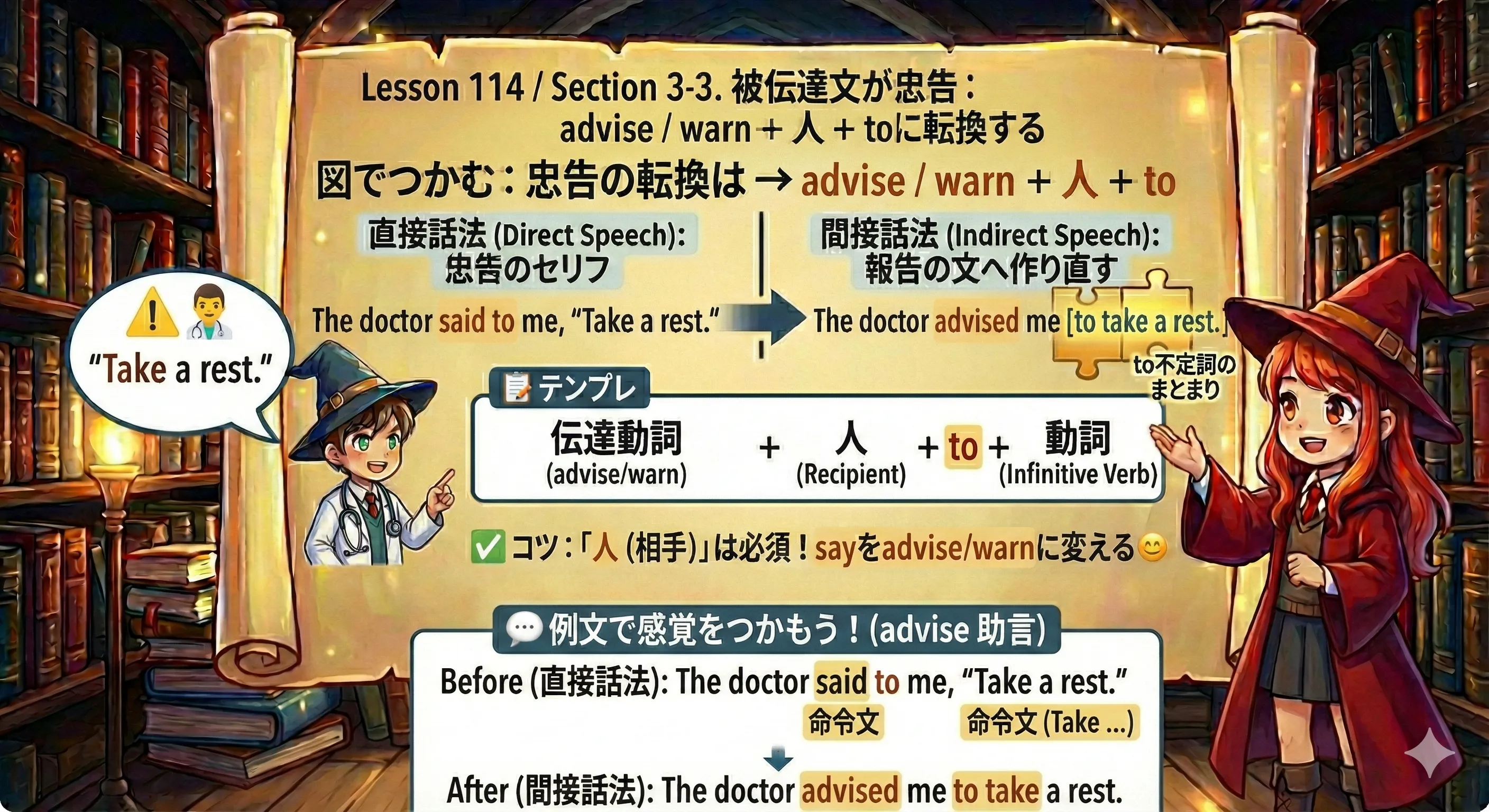
3-3-1. まずは型:advise / warn + 人 + to + 動詞
忠告の転換は、基本の形がひとつです😊
「誰に」(人)を入れて、
to の後ろは動詞の原形にします。
※ 忠告=「相手のために言う」こと。だから say のままにせず advise/warn に入れ替えます。
He said to me, "..."→He advised/warned me to ...- 人(相手)がないと、忠告が「誰向け?」かわからなくなる
- to の後ろは 原形(to + 動詞)
The doctor said to me, "Take a rest."
(医者は私に「休みなさい」と言った。)
The doctor advised me to take a rest.
(医者は私に休むように忠告した。)
me、「何を」→ to take の形に分けると一瞬で転換できます😊
She said to him, "Drive carefully."
(彼女は彼に「気をつけて運転して」と言った。)
She warned him to drive carefully.
(彼女は彼に慎重に運転するよう警告した。)
warn は「危険を避けさせる」感じが強め。交通・危険・ミス防止と相性◎
My friend said to me, "Save your money."
(友だちは私に「お金を貯めなよ」と言った。)
My friend advised me to save my money.
(友だちは私にお金を貯めるよう助言した。)
advise は「相手のために良いと思うこと」をすすめるイメージ😊
3-3-2. advise と warn の違い:目的が違う(助言 vs 危険の注意)
どちらも「忠告」ですが、目的が違います😊
advise は「相手のためになるアドバイス」、
warn は「危ないよ!ミスるよ!の警告」です⚠️
※ 迷ったら「良くするため」→ advise / 「悪い結果を避ける」→ warn が最短ルート✨
例:健康・勉強・習慣・改善
例:危険・詐欺・事故・失敗の回避
The teacher said to him, "Study a little every day."
(先生は彼に「毎日少しずつ勉強しなさい」と言った。)
The teacher advised him to study a little every day.
(先生は彼に毎日少しずつ勉強するよう助言した。)
advise が自然😊
He said to her, "Don't click that link."
(彼は彼女に「そのリンクをクリックしないで」と言った。)
He warned her not to click that link.
(彼は彼女にそのリンクをクリックしないよう警告した。)
warn がピッタリ。
The staff said to him, "Be careful with that machine."
(スタッフは彼に「その機械に気をつけて」と言った。)
The staff advised him to be careful with that machine.
(スタッフは彼にその機械に注意するよう助言した。)
The staff warned him to be careful with that machine.
(スタッフは彼にその機械に注意するよう警告した。)
「良くするため」なら
advise、
「危険を避ける」なら warn を選ぶとブレません😊
3-3-3. 「〜しないほうがいい」:not to を入れて止める
直接話法で Don't ...(〜するな)と言っている文は、
間接話法にすると not to + 動詞 を使います😊
つまり「to の前に not」を置けばOK!
※ このレッスンでは not to を基本形として統一します(迷いが減って安全✨)
"Don't + 動詞"→advised/warned + 人 + not to + 動詞Never + 動詞の場合 →never to + 動詞(強い禁止)- 「人(相手)」も忘れない(忠告は相手が大事!)
My friend said to me, "Don't skip breakfast."
(友だちは私に「朝食を抜かないで」と言った。)
My friend advised me not to skip breakfast.
(友だちは私に朝食を抜かないよう忠告した。)
not は to の前!not to + 動詞 が基本形です😊
The guide said to us, "Don't go there alone."
(ガイドは私たちに「そこへ1人で行かないで」と言った。)
The guide warned us not to go there alone.
(ガイドは私たちにそこへ1人で行かないよう警告した。)
warn がハマります(注意・警告の忠告)⚠️
She said to him, "Never touch that switch."
(彼女は彼に「そのスイッチには絶対触らないで」と言った。)
She warned him never to touch that switch.
(彼女は彼にそのスイッチには絶対触らないよう警告した。)
never は「絶対に〜するな」の強さ。not よりキツめの禁止です。
Don't ... → not to ...(基本)
Never ... → never to ...(強い禁止)です😊
3-3-4. 失礼にならない忠告:softener(やわらげ表現)で角を取る
忠告は、内容によっては キツく聞こえやすい です😅
そこで softener(やわらげ表現:言い方をやさしくする工夫)を使うと、
相手への配慮が出せます😊
maybe / I think / you might want to(もしかしたら/私は〜だと思う/〜したほうがいいかも)
gently / kindly / seriously など(やさしく/親切に/真剣に)
She said to me, "Maybe you should back up your files."
(彼女は私に「たぶんファイルをバックアップしたほうがいいよ」と言った。)
She gently advised me to back up my files.
(彼女は私にファイルをバックアップするようやさしく助言した。)
maybe の“やわらかさ”は、転換後に gently などで雰囲気を残せます😊
He said to her, "I think you should see a doctor."
(彼は彼女に「医者に診てもらったほうがいいと思う」と言った。)
He seriously advised her to see a doctor.
(彼は彼女に医者に診てもらうよう真剣に助言した。)
I think は「押しつけ感」を減らす表現。転換後は seriously 等で真剣さを足せます。
They said to us, "You might want to be careful with that email."
(彼らは私たちに「そのメールには気をつけたほうがいいかも」と言った。)
They gently warned us to be careful with that email.
(彼らは私たちにそのメールに注意するよう、やさしく警告した。)
直接話法で
maybe / I think / might want to などがあったら、転換後は gently / kindly / seriously のような副詞で “トーン(やさしさ)” を残すと自然です😊
3-3-5. 受動態:be advised / be warned + to(忠告された・警告された)
「私は〜するように言われた」のように、
言われた側(受け手)を主語にしたいときは受動態が便利です😊
形は be + 過去分詞 + to + 動詞。
※ だれに言われたかを入れたいときは by + 人 を足せます(必要なときだけでOK)。
I was advised to ...(私は〜するよう助言された)I was warned to ...(私は〜するよう警告された)not toもそのまま入れられる:I was warned not to ...
The doctor said to me, "Drink more water."
(医者は私に「もっと水を飲みなさい」と言った。)
I was advised to drink more water.
(私はもっと水を飲むよう助言された。)
The staff said to us, "Be careful with the stairs."
(スタッフは私たちに「階段に気をつけて」と言った。)
We were warned to be careful with the stairs.
(私たちは階段に気をつけるよう警告された。)
be warned は注意書き・案内文にもよく出ます(例:Visitors are warned to ...)。
The manager said to me, "Don't share that file."
(マネージャーは私に「そのファイルを共有しないで」と言った。)
I was warned not to share that file.
(私はそのファイルを共有しないよう警告された。)
not to を入れるだけ。形が崩れません😊
3-3-6. よくあるミス:人の位置・語順・動詞の形(say のまま等)
ここは “転換ミスあるある” を先に潰しておくコーナーです😊
忠告の転換は 「advise/warn + 人 + to」 の形に
必ず並べ直すのがコツ!
say のままHe said me to stop.
He advised me to stop.
say は “say + 人 + to” の形にできません。忠告なら advise / warn に入れ替えます。
He advised to take a break.
He advised me to take a break.
He advised to me stop.
He advised me to stop.
advise/warn + 人 + to)。
He warned me to went.
He warned me to go.
to の後ろは 動詞の原形です(to + go)。
① advise/warn に入れ替え → ② 人(相手)を入れる → ③ to + 原形 → ④ 否定なら not to
これでミスがほぼ消えます😊
3-3 まとめ:場面で「助言」か「警告」かを選べるように
advise + 人 + to ...受動
be advised to ...
warn + 人 + to ...否定
warn + 人 + not to ...受動
be warned to ...
「良くするため?」→
advise「悪い結果を避けるため?」→
warnこの2択でほぼ決まります😊
転換は “型ゲー” です✨ 動詞 → 人 → to の順番さえ守れれば、 あとは単語を入れ替えるだけでどんどん作れます。
3-4. 勧誘(Let’s ~)の転換:suggest / propose + that (should)(まずは全体像)
このセクションでは、直接話法の Let’s + 動詞(「一緒に〜しよう」)を、
間接話法(言った内容を“言い換えて”伝える形)に直す練習をします😊
ポイントは、Let’s(= we の提案)を
that + 主語 + (should) + 動詞原形
に変えること。
※ (should) は「入れてもOK/省略してもOK」なことが多いです(後でやさしく整理します)
むずかしい用語が出たら、かんたん補足も一緒に読みます。たとえば 伝達動詞(「言った内容を運ぶ動詞」)のように、 “これ何?”がすぐ分かる形で進めます✨
🧭
図でつかむ:Let’s → suggest / propose → that + S + (should) + 原形
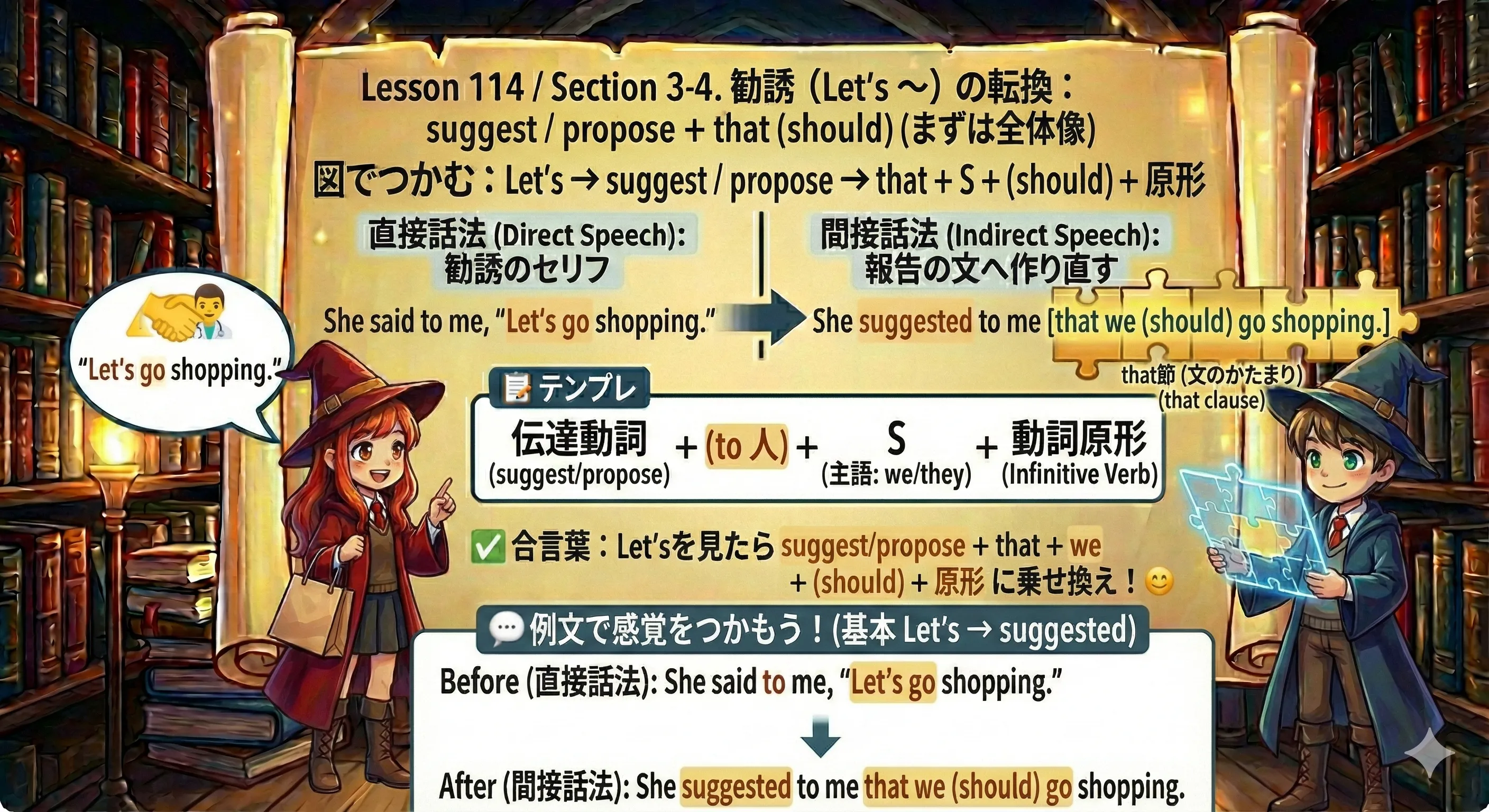
3-4-1. まずは型:Let’s → suggest / propose + that + S + (should) + 動詞原形
ここは暗記というより「型を固定」するところです😊
Let’s は “we の提案”なので、
that節の主語は多くの場合 we(場面で they にもなります)。
そして動詞は 原形(go / do / be など)でOK!
Let’s(勧誘) を見たら suggest/propose + that + we + (should) + 原形 に“乗せ換え”する!
She said to me, "Let's go shopping."
(彼女は私に「買い物に行こう」と言った。)
She suggested to me that we (should) go shopping.
(彼女は私に買い物に行こうと提案した。)
we が出やすいです😊
He said to us, "Let's start now."
(彼は私たちに「今始めよう」と言った。)
He proposed to us that we (should) start then.
(彼は私たちにその時始めようと提案した。)
now → then のように、時をズラすこともあります(必要なときだけでOK)😊
My friend said, "Let's take a break."
(友だちは「休憩しよう」と言った。)
My friend suggested that we (should) take a break.
(友だちは休憩しようと提案した。)
to + 人 は「必要なら入れる」。なくても自然な場面も多いです😊
3-4-2. suggest と propose の使い分け:軽い提案 vs 会議っぽい提案
どちらも「提案」ですが、空気感が少し違います😊
suggest は “アイデア出し・気軽”、
propose は “少しかため・正式・会議っぽい” イメージです。
※ フォーマル(かため)=仕事・会議・書き言葉でよく使う丁寧さ
Let's have pizza. みたいな“気軽な提案”
She said, "Let's have pizza."
(彼女は「ピザにしよう」と言った。)
She suggested that we (should) have pizza.
(彼女はピザにしようと提案した。)
He said, "Let's change the plan."
(彼は「計画を変えよう」と言った。)
He proposed that we (should) change the plan.
(彼は計画を変更しようと提案した。)
She said to him, "Let's learn English."
(彼女は彼に「英語を勉強しよう」と言った。)
She proposed to him that they (should) learn English.
(彼女は彼に、英語を勉強しようと提案した。)
to him があると、「彼女+彼」の2人= they にするのが自然な場面が多いです😊
3-4-3. should は入れる?入れない?:(should) + 動詞原形の感覚
suggest / propose + that のあとで迷いやすいのが (should) です😊
まず安心ポイント:入れてもOK/省略してもOK なことが多いです。
※ (should) は「命令」じゃなくて、“提案として言ってるよ”をちょい強めに見せるスイッチ、くらいの感覚でOK。
suggest that S + 動詞原形
suggest that S should + 動詞原形
会話・メモなら “なし” / 会議・文章なら “あり” を選ぶと失敗しにくいです😊
She said, "Let's go now."
(彼女は「今行こう」と言った。)
She suggested that we go now.
(彼女は今行こうと提案した。)
She suggested that we should go now.
(彼女は今行こうと提案した。)
He said, "Let's meet at ten."
(彼は「10時に会おう」と言った。)
He proposed that we meet at ten.
(彼は10時に会おうと提案した。)
He proposed that we should meet at ten.
(彼は10時に会おうと提案した。)
propose 自体が少しかためなので、should を入れるとさらに文章っぽくなります✨
They said, "Let's start now."
(彼らは「今始めよう」と言った。)
They suggested that we should start then.
(彼らはその時始めようと提案した。)
3-4-4. 否定の勧誘:「〜しようよ(ただし〜はしない)」は that節の中で not
ここはミスが出やすいので最初に結論です⚠️
否定は “that節の中” に入れます。つまり、
that we (should) not + 動詞原形 です。
※ 命令・依頼・忠告(to不定詞)の not to と混ざりやすいので注意!
suggest / propose は “to不定詞” にしない!
×
She suggested us not to go. → 〇 She suggested that we not go.
She said, "Let's not be late."
(彼女は「遅れないようにしよう」と言った。)
She suggested that we not be late.
(彼女は遅れないようにしようと提案した。)
not は that節の中に置く、と覚えると迷いません😊
He said, "Let's not tell anyone."
(彼は「誰にも言わないでおこう」と言った。)
He proposed that we should not tell anyone.
(彼は誰にも言わないでおこうと提案した。)
should not は “書き言葉っぽい丁寧さ” が出ます(会議・文書で便利)✨
She said to him, "Let's not rush."
(彼女は彼に「急がないでおこう」と言った。)
She suggested to him that they not rush.
(彼女は彼に、急がないでおこうと提案した。)
to him があると「彼女+彼」の2人= they にするのが自然な場面が多いです😊
3-4-5. 受動態・案内文でも使える:It is suggested/proposed that ...
“誰が提案したか” をぼかして、案内・ルール・手順として書きたいときに便利なのがこの形です😊
It is suggested that ... は「〜することが提案されています」、
It is proposed that ... は「〜することが提案されています(やや会議・正式寄り)」のイメージ。
※ 受動態(be + 過去分詞)=「される形」:主語を “It” にして文章をスッキリできます。
The staff said, "Let's use the side entrance."
(スタッフは「側面の入口を使おう」と言った。)
It is suggested that visitors (should) use the side entrance.
(来訪者は側面の入口を使うことが提案されています。)
It is suggested that ... が便利です😊
They said, "Let's check the settings first."
(彼らは「まず設定を確認しよう」と言った。)
It is proposed that we (should) check the settings first.
(まず設定を確認することが提案されています。)
proposed が合いやすいです✨
He said, "Let's not print this."
(彼は「これは印刷しないでおこう」と言った。)
It is suggested that this not be printed.
(これは印刷しないことが提案されています。)
not の位置)です😊
3-4-6. よくあるミスを先に防ぐ:suggest to do / suggest 人 to など
ここでの最大ポイントはこれです👇
suggest / propose は基本 “that節” を使います。
命令・依頼・忠告(to不定詞)と混ぜるとミスが増えるので、パターンを分けて覚えましょう😊
suggest to dosuggest 人 to dopropose 人 to do
suggest that S (should) dopropose that S (should) doIt is suggested/proposed that ...
「提案=that節」 / 「命令・依頼・忠告=to不定詞」 と分けると迷いが減ります😊
She suggested to go shopping.
(※この形はこの章の転換としては不適切)
She suggested that we go shopping.
(彼女は買い物に行こうと提案した。)
He proposed me to join.
(※この形は×)
He proposed to me that I (should) join.
(彼は私に参加しようと提案した。)
to + 人 を足すだけ。that節は消さない😊
They suggested us not to tell anyone.
(※この章の型としては×)
They suggested that we not tell anyone.
(彼らは誰にも言わないでおこうと提案した。)
3-4. まとめ:場面で“提案の強さ・かたさ”を調整しよう
勧誘(Let's ...)の転換は、形さえ決まれば一気にラクになります😊
あとは場面に合わせて suggest / propose を選べればOK。
※ suggest=軽め/propose=会議っぽい(かため)/受動態=案内文に便利
suggest that S (should) do
propose that S (should) do
It is suggested/proposed that ...
提案=that節 / 否定=that節の中で not / should は好みと場面でOK😊
“型”が決まると、英語が一気に実戦的になります✨
4. 感嘆文の転換(直接話法 → 間接話法の入口)
Lesson114 は 直接話法(セリフをそのまま言う形) を
間接話法(〜と言った、と報告する形) に転換する練習です😊
この Section 4 では、その中でも How / What を使う
感嘆文(わあ!すごい!と気持ちが出る文) にしぼって、
「どう転換するかの全体地図」 をつくります。
ここでは詳しい説明に入る前に、「どんなゴールか」を先に見て、安心して本編へ進む準備をしましょう。
むずかしい言葉が出てきたら、 (小学生にもわかる短い言いかえ) をいっしょに添えます。身構えなくて大丈夫です✨
直接話法 → 間接話法 感嘆文(How / What) 入口(案内) Lesson 114 / Section 4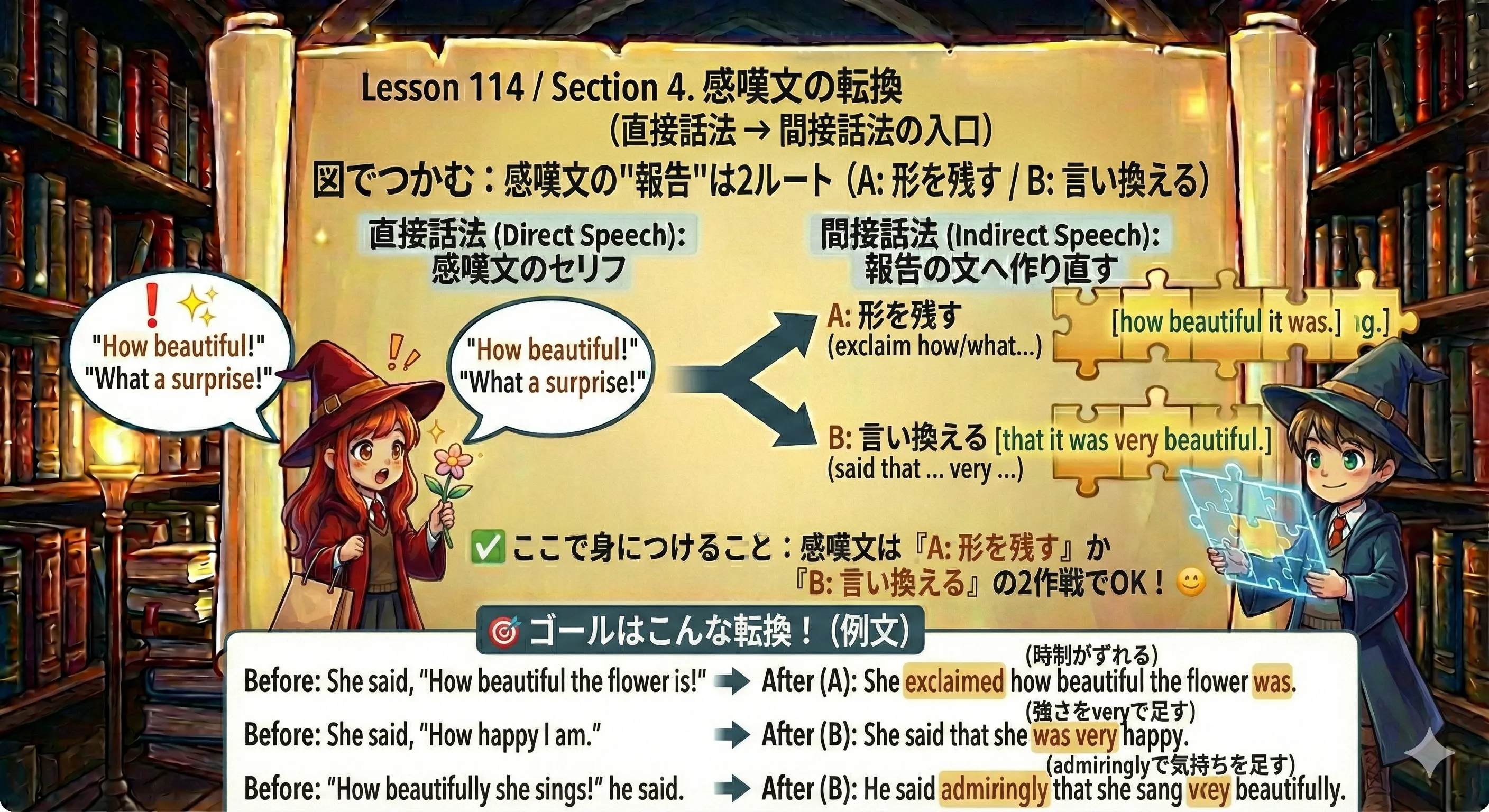
🧭 ここで身につけること(感嘆文の“報告”は2ルート)
感嘆文の転換は、だいたい 2つの作戦 を選べばOKです。
A
How / What の形を残して 伝える(例:exclaim =「思わず声を出す」)。
B
that節+very などで言い換えて 伝える(例:said that ...)。
どちらも「相手のセリフ」を“報告文”に組み替える練習です😊
🎯 ゴールはこんな転換!(直接話法 → 間接話法)
She said, "How beautiful the flower is!"
(彼女は「その花はなんてきれいなの!」と言った。)
→ She exclaimed how beautiful the flower was.
(その花はなんてきれいなことかと彼女は声を出した。)
She said, "How happy I am."
(彼女は「私はなんて幸せなの」と言った。)
→ She said that she was very happy.
(彼女はとても幸福だと言った。)
How happy の“気持ちの強さ”を、very などで表してもOKです
(強さを言葉で足すイメージ)。
"How beautifully she sings!" he said.
(彼は「彼女はなんて美しく歌うんだ!」と言った。)
→ He said admiringly that she sang very beautifully.
(彼は彼女の歌は本当に素晴らしいと感心して言った。)
admiringly は「感心して」
(ほめる気持ちで) のように、“言い方の気持ち”も足せます。
🚀 次はどこから読む? 4-1 ~ 4-4 へのナビゲーション
迷ったら 4-1(見分け) からがおすすめ。 「これは質問?それとも感嘆?」が分かると、転換が急にラクになります😊
人は「完璧に分かってから始める」よりも、 「だいたい分かった状態でまず動いてみる」方が、記憶に残りやすく続きやすいです。
ここまで読めたあなたは、もう準備はバッチリです ✅
感嘆文は「質問」ではなく「気持ち」。その軸だけ持っていれば、転換はちゃんとできます😊
4-1. 疑問文の How / What と何が違う?
このセクションでは、
How / What が
「質問(答えがほしい)」
なのか、
「感嘆(気持ちが出る)」
なのかを見分けます😊
Lesson114のゴールは、直接話法(セリフ)を
間接話法(報告の文)に転換すること。
まずは「どっちの How/What?」を判定できるようにしましょう。
※ 感嘆(かんたん)=「わあ!すごい!」みたいな気持ちの文/間接話法=「〜と言った」と伝える言い方
質問なのに exclaim を使う、 感嘆なのに ask を使う のが “あるあるミス”。ここで先に防げば、転換が一気にラクになります✨
🧭 図でつかむ:How / What は「質問」か「感嘆」か
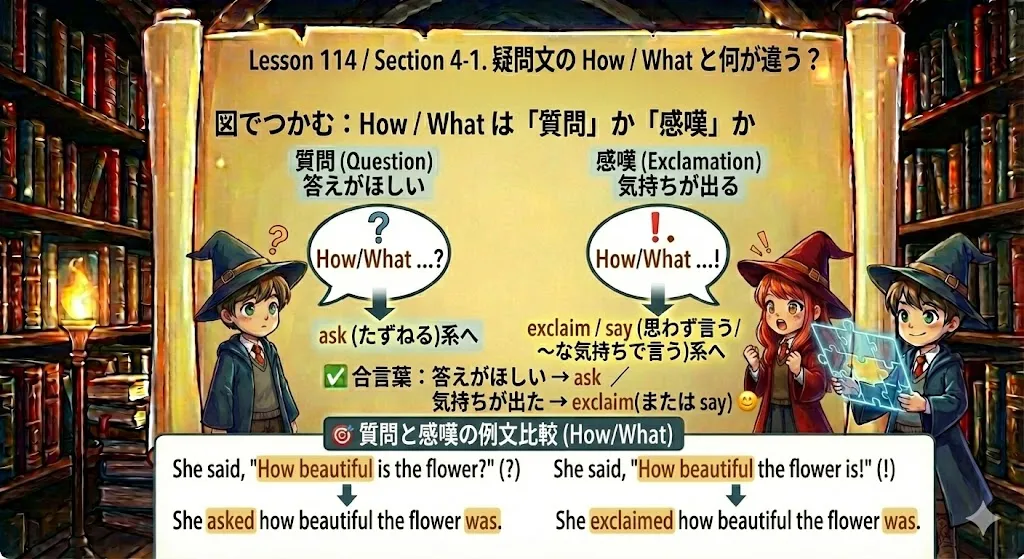
! / .=気持ち(感嘆) → exclaim / say (思わず言う/〜な気持ちで言う)
🌟 まず結論:How / What は「質問」と「感嘆」で役割が違う
How / What は同じ形でも、目的が2つあります。
質問は「答えがほしい」ので
ask 系へ。
感嘆は「気持ちが出た」ので
exclaim / say 系へ。
※ 役割=この文が“何のために”言われているか(情報?気持ち?)
答えがほしい → ask / 気持ちが出た → exclaim(または say)
She said, "How beautiful the flower is!"
(彼女は「その花はなんてきれいなの!」と言った。)
→ She exclaimed how beautiful the flower was.
(その花はなんてきれいなことかと彼女は声を出した。)
ask より exclaim が自然です。
She said, "How beautiful is the flower?"
(彼女は「その花はどれくらい美しいの?」と尋ねた。)
→ She asked how beautiful the flower was.
(その花がどれほど美しいのかと彼女は尋ねた。)
ask 系が基本です。
She said, "How happy I am."
(彼女は「私はなんて幸せなの」と言った。)
→ She said that she was very happy.
(彼女はとても幸福だと言った。)
how ... を残さずに、
that節+very で“強さ”を言い換えることもできます😊
次は「文末記号(? / ! / .)」で、さらに見分けを速くしていきましょう😊
🔎 見分けポイント①:文末記号と“気持ち”の方向(? と ! / .)
いちばん速いヒントは 文末の記号です。
? は「答えがほしい」、
! は「気持ちが強い」、
そして . でも
落ち着いた感嘆 のことがあります😊
| 文末 | だいたいの意味 | 間接話法でよく使う |
|---|---|---|
❓ ? |
質問(答えがほしい) (知りたい) | ask wonder |
✨ ! |
感嘆(驚き・感動) (わあ!) | exclaim cry / shout |
🙂 . |
感嘆のこともある(落ち着いた言い方) (静かに気持ち) | say that ... 言い換え(very など) |
「. =ふつうの文」と決めつけなくてOK。
直接話法では
How happy I am. のように、落ち着いて感嘆を言う書き方もあります。
He said, "How beautifully does she sing?"
(彼は「彼女はどれくらい美しく歌うの?」と尋ねた。)
→ He asked how beautifully she sang.
(彼は彼女がどれくらい美しく歌うのか尋ねた。)
? は「答えがほしい」→ ask が基本です。
"How beautifully she sings!" he said.
(彼は「彼女はなんて美しく歌うんだ!」と言った。)
→ He exclaimed how beautifully she sang.
(彼は彼女がなんて美しく歌うのかと感嘆した。)
! は感情が強め → exclaim が相性◎
She said, "How happy I am."
(彼女は「私はなんて幸せなの」と言った。)
→ She said that she was very happy.
(彼女はとても幸福だと言った。)
. でも感嘆のことがあるので、迷ったら「気持ち?」を確認。気持ちなら
that節+very の言い換えが安定です😊
🔁 見分けポイント②:語順の違い(疑問は倒置/感嘆は平叙文)
ここがいちばん効きます✨
疑問(質問)は、
助動詞(do / does / did / is / are など)
が前に出ることが多いです
(=倒置:語順がひっくり返る)。
一方、
感嘆(気持ち)は
平叙文の語順(S + V)
のまま言うのが基本です😊
直接話法では疑問文が倒置でも、間接話法では倒置しません。
つまり、間接話法は「平叙文語順」に戻すのが基本です✅
| タイプ | 直接話法(よくある形) | 間接話法(基本) |
|---|---|---|
| 疑問 倒置 |
How beautiful is the flower?(be / do が前に出る) |
asked how beautiful the flower was(平叙文語順に戻す) |
| 感嘆 平叙 |
How beautiful the flower is!(S + V のまま) |
exclaimed how beautiful the flower was(こちらも平叙文語順) |
💬 例文で確認(倒置 vs 平叙文語順)
She said, "How beautiful is the flower?"
(彼女は「その花はどれくらいきれいなの?」と尋ねた。)
→ She asked how beautiful the flower was.
(彼女はその花がどれほど美しいのか尋ねた。)
She said, "How beautiful the flower is!"
(彼女は「その花はなんてきれいなの!」と言った。)
→ She exclaimed how beautiful the flower was.
(その花はなんてきれいなことかと彼女は声を出した。)
is が前に出ていたら疑問になりやすい(倒置)/ S + is のままなら感嘆になりやすい(平叙)😊
He said, "How beautifully does she sing?"
(彼は「彼女はどれくらい美しく歌うの?」と尋ねた。)
→ He asked how beautifully she sang.
(彼は彼女がどれくらい美しく歌うのか尋ねた。)
"How beautifully she sings!" he said.
(彼は「彼女はなんて美しく歌うんだ!」と言った。)
→ He exclaimed how beautifully she sang.
(彼は彼女がなんて美しく歌うのかと感嘆した。)
She said, "What a wonderful day this is!"
(彼女は「今日はなんてすてきな日なの!」と言った。)
→ She exclaimed what a wonderful day it was.
(今日はなんてすてきな日なのかと彼女は声を出した。)
→ She said that it was a very wonderful day.
(彼女は今日はとてもすてきな日だと言った。)
間接話法では「疑問でも倒置しない」のが鉄則です(? を消して平叙文語順へ)。
🗣️ 見分けポイント③:転換で使う動詞が違う(ask 系 / exclaim 系)
Lesson114 は「報告の文」を作る練習なので、ここが実戦ポイントです🔥
質問なら
ask 系、
感嘆なら
exclaim 系を選ぶと、文が自然になります。
(系=仲間のグループ)
| 役割 | よく使う動詞 | ニュアンス(やさしい説明) |
|---|---|---|
| ❓ 質問 |
ask, wonder, inquire
|
答えがほしい/気になっている (知りたい気持ち) |
| ✨ 感嘆 |
exclaim, cry, shout
|
思わず声が出る/感情が強い (わあ!となる) |
| 🌟 感心 |
say admiringly, say in surprise
|
言い方の気持ちも伝える (感心して/驚いて) |
「? → ask」 と覚えつつ、
「ほめてる・驚いてる → say + 副詞」 も使えると表現が一気に大人っぽくなります✨
💬 例文で確認(動詞を変えると“伝わり方”が変わる)
He said, "How old are you?"
(彼は「何歳なの?」と尋ねた。)
→ He asked how old I was.
(彼は私が何歳なのか尋ねた。)
She said, "What a cute dog!"
(彼女は「なんてかわいい犬なの!」と言った。)
→ She exclaimed what a cute dog it was.
(なんてかわいい犬なんだと彼女は声を上げた。)
"How beautifully she sings!" he said.
(彼は「彼女はなんて美しく歌うんだ!」と言った。)
→ He said admiringly that she sang very beautifully.
(彼は彼女の歌は本当に素晴らしいと感心して言った。)
exclaim でもOKですが、admiringly を足すと 「ほめている気持ち」まで伝えられます😊
✅ まとめチェック:これは「答えが欲しい?」それとも「気持ち?」
最後に、3つだけクイックチェック!
それぞれ「質問(答えがほしい)」か「感嘆(気持ち)」かを決めて、使う動詞を選ぶ練習です😊
① 答えが必要? → ask
② 気持ちを言ってる? → exclaim / say
She said, "How tired are you?"
(彼女は「どれくらい疲れてるの?」と尋ねた。)
→ She asked how tired I was.
(彼女は私がどれくらい疲れているのか尋ねた。)
He said, "How beautiful the sunset is!"
(彼は「夕日がなんてきれいなんだ!」と言った。)
→ He exclaimed how beautiful the sunset was.
(夕日がなんてきれいなことかと彼は声を上げた。)
She said, "How lucky I am."
(彼女は「私はなんて運がいいの」と言った。)
→ She said that she was very lucky.
(彼女はとても運がいいと言った。)
「質問か感嘆か」→「動詞を選ぶ」→「間接話法は平叙文語順」まで、もう一連でできています😊
4-2. How型の転換(感嘆の How を間接話法へ)
ここでは、感嘆の How(気持ちの How)を
直接話法 → 間接話法に転換する方法をまとめます😊
ポイントは、
「how を残す」か
「that節で言い換える」かの2ルート。
まずは全体像をつかんでから、型①を練習していきましょう。
※ that節=「〜だと」と報告する形(会話のセリフを“説明文”に変えるイメージ)
感嘆の How は、疑問の How と違って
答えを求めていません。
だから「?」に引っぱられず、気持ちをどう報告するか(動詞と形)を選べばOKです✨
🗺️ 図でつかむ:感嘆 How は 2ルート(how残す / that節で言い換え)
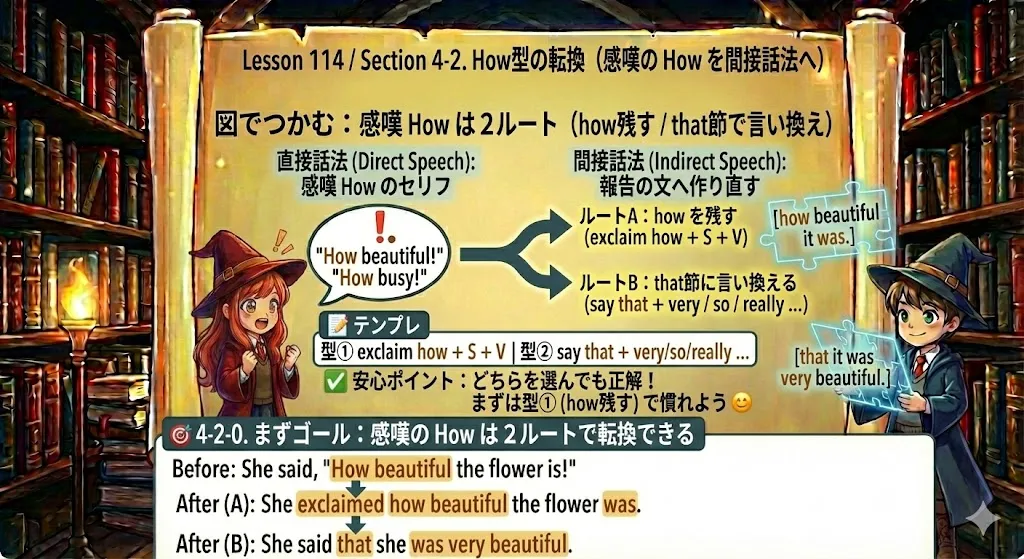
exclaim(ed) how + S + VルートB:that節に言い換える →
say that + very / so / really ...
🎯 4-2-0. まずゴール:感嘆の How は 2ルートで転換できる(how を残す / that節に言い換える)
感嘆の How は「すごい!」「なんて〜!」という
気持ちが中心です。
間接話法にするときは、次の2つのどちらかでOK😊
🅰️ ルートA:how を残す(直球で伝える)
感嘆の形をそのまま報告したいときに便利。
exclaim how ... が中心です。
exclaimed how + S + V
🅱️ ルートB:that節に言い換える(自然な報告にする)
「〜だ」と説明する感じでまとめたいときに便利。
very / so / really などで強さを足します。
said that + very/so/really ...
どちらを選んでも正解にできます✨
まずは ルートA(how を残す)で型を覚えて、慣れたらルートBも使い分けましょう😊
🧩 4-2-1. 型①:how を残して転換する(exclaim how + S + V)
いちばん覚えやすい型です😊
感嘆の How は「疑問」ではないので、
間接話法でも倒置しません。
つまり、平叙文の語順(S + V)でそのまま報告します。
直接話法:
How + 形容詞/副詞 + S + V!間接話法:
exclaimed how + 形容詞/副詞 + S + V
She said, "How beautiful the flower is!"
(彼女は「その花はなんてきれいなの!」と言った。)
→ She exclaimed how beautiful the flower was.
(その花はなんてきれいなことかと彼女は声を出した。)
She said, "How cold it is!"
(彼女は「なんて寒いの!」と言った。)
→ She exclaimed how cold it was.
(どれほど寒いかと彼女は声を上げた。)
"How beautifully she sings!" he said.
(彼は「彼女はなんて美しく歌うんだ!」と言った。)
→ He exclaimed how beautifully she sang.
(彼は彼女がなんて美しく歌うのかと感嘆した。)
感嘆なのに ask を使う/間接話法で 倒置のままにする。
→ 感嘆のHowは 平叙文語順でOKです😊
次は「that節に言い換えるルート(型②)」へ進むと、表現の幅が一気に広がります✨
🧩 4-2-2. 型②:that節へ言い換える(say that + very / so / really)
型①(exclaim how ...)は直球で分かりやすい一方で、
「ふつうの報告文として自然に言いたい」ときは
型②が便利です😊
感嘆の How を消して、that 節で
強さ(very / so / really)
を足して言い換えます。
※ that節=「〜だと」と言う形(セリフを説明文にするイメージ)
直接話法:
How + 形容詞/副詞 + S + V!間接話法:
said that + S + was/were + very/so/really + 形容詞(副詞なら:
... + V + very/really + 副詞)
💬 例文で覚える(that節ルート)
She said, "How happy I am."
(彼女は「私はなんて幸せなの」と言った。)
→ She said that she was very happy.
(彼女はとても幸福だと言った。)
He said, "How tired you look!"
(彼は「君、なんて疲れて見えるんだ!」と言った。)
→ He said that I looked really tired.
(彼は私が本当に疲れて見えると言った。)
How tired you look! は「質問」ではなく「気持ち」なので、that 節で自然に報告できます😊
She said, "How busy we are today!"
(彼女は「今日、私たちなんて忙しいの!」と言った。)
→ She said that they were so busy that day.
(彼女はその日はとても忙しいと言った。)
today は状況により that day に変えることが多いです(話している時点がズレるため)😊
「感嘆のHowをそのまま報告」ではなく、 “強さ(very/so/really)”で気持ちを訳すイメージにするとスムーズです✨
🎭 4-2-3. 動詞の選び方:気持ちに合わせて言い方を変える(admiringly / in surprise / complain など)
同じ感嘆の文でも、気持ちはいろいろあります😊
ほめているのか、
驚いているのか、
不満なのかで、
間接話法の動詞(または say + 副詞)を変えると
伝わり方が一気に自然になります✨
| 気持ち | よく使う言い方 | やさしい説明 |
|---|---|---|
| 😍 感心 |
say admiringly /
praise
|
すごい!とほめる (感心して言う) |
| 😲 驚き |
say in surprise /
exclaim
|
えっ!?とびっくり (驚いて言う) |
| 😤 不満 |
complain /
say angrily
|
イヤだな…という気持ち (文句を言う) |
感嘆の形(How/What)を残すなら
exclaim が万能。さらに気持ちを伝えたいなら、 say + 副詞(
admiringly など)や
complain を選ぶと上手に表現できます✨
💬 例文で確認(気持ちを“言い方”で乗せる)
"How beautifully she sings!" he said.
(彼は「彼女はなんて美しく歌うんだ!」と言った。)
→ He said admiringly that she sang very beautifully.
(彼は彼女の歌は本当に素晴らしいと感心して言った。)
She said, "How expensive this is!"
(彼女は「なんて高いの!」と言った。)
→ She said in surprise that it was really expensive.
(彼女は驚いて、それは本当に高いと言った。)
He said, "How noisy they are!"
(彼は「彼ら、なんてうるさいんだ!」と言った。)
→ He complained that they were so noisy.
(彼は彼らがとても騒がしいと不満を言った。)
exclaim は万能だけど、complain を使えると 「文句の気持ち」まで伝えられて自然です😊
🛠️ 4-2-4. 形の調整:時制・代名詞・指示語を整える(is→was, I→he/she, now→then など)
型①・型②が分かっても、ここでつまずく人が多いです😊
間接話法は「セリフ」を「報告」にするので、
時間と
立場(だれの話?)
がズレます。だから
形(時制・代名詞・指示語)
を整える必要があります✅
① 時制(is→was など)
② 代名詞(I→he/she, you→I など)
③ 指示語(now→then, today→that day など)
| 直接話法 | 間接話法 | メモ(やさしい説明) |
|---|---|---|
is / are |
was / were |
報告が過去なら「1つ過去」に寄せることが多い |
I |
he / she |
話している人が変わる(セリフの主語を入れ替える) |
you |
I / he / she |
だれに言ったかで決まる(聞き手が誰か) |
now |
then |
「今」は報告時点では「そのとき」になる |
today |
that day |
「今日」は報告時点では「その日」になりやすい |
💬 例文で確認(形の調整つき)
She said, "How beautiful the flower is!"
(彼女は「その花はなんてきれいなの!」と言った。)
→ She exclaimed how beautiful the flower was.
(その花はなんてきれいなことかと彼女は声を出した。)
said が過去なので、is を was に寄せるのが定番です😊
He said, "How lucky I am now!"
(彼は「今の僕はなんて運がいいんだ!」と言った。)
→ He said that he was really lucky then.
(彼はそのとき本当に運がよかったと言った。)
I は「セリフの話者」なので、報告では
he に変わります。now も報告の時点では then になりやすいです😊
She said to me, "How kind you are!"
(彼女は私に「あなたってなんて親切なの!」と言った。)
→ She exclaimed how kind I was.
(彼女は私がなんて親切かと感嘆した。)
you は「聞き手」を指すので、ここでは me(=I)に変わります😊
“いつの話?” と “だれの言葉?” を考えると、形の調整はほぼミスりません😊
✅ 4-2-5. まとめチェック:how を残す?that節にする?(3秒判定)
最後に「どっちを選ぶ?」を一瞬で決める練習です😊
次の3つのセリフを見て、まず
A:how を残すか
B:that節に言い換えるかを決めましょう。
🅰️ 気持ちをそのまま見せたい →
exclaim how ...🅱️ 自然な報告文にしたい →
say that ... very/so/really ...
She said, "How wonderful this is!"
(彼女は「これはなんてすてきなの!」と言った。)
→ She exclaimed how wonderful it was.(これはなんてすてきなことかと彼女は感嘆した。)
He said, "How nervous I am."
(彼は「僕はなんて緊張しているんだ」と言った。)
→ He said that he was really nervous.(彼は本当に緊張していると言った。)
She said, "How fast you can run!"
(彼女は「あなた、なんて速く走れるの!」と言った。)
→ She said in surprise that I could run really fast.(彼女は驚いて、私が本当に速く走れると言った。)
「2ルート選ぶ」→「動詞を決める」→「形を整える」まで、もう一連で回せています😊
4-3. What型の転換(感嘆の What を間接話法へ)
ここでは、感嘆の What(気持ちの What)を
直接話法 → 間接話法へ転換します😊
What は 名詞(もの)が主役!
だから a / an や
it / they の選び方がポイントになります。
※ 名詞=「もの・こと」の名前(dog / idea / flowers / weather など)
そして転換は、How型と同じく 2ルートでOK✨ ① What を残す(気持ちをそのまま)/② that節に言い換え(自然な報告)
🗺️ 図でつかむ:感嘆 What は 2ルート(Whatを残す / that節へ)
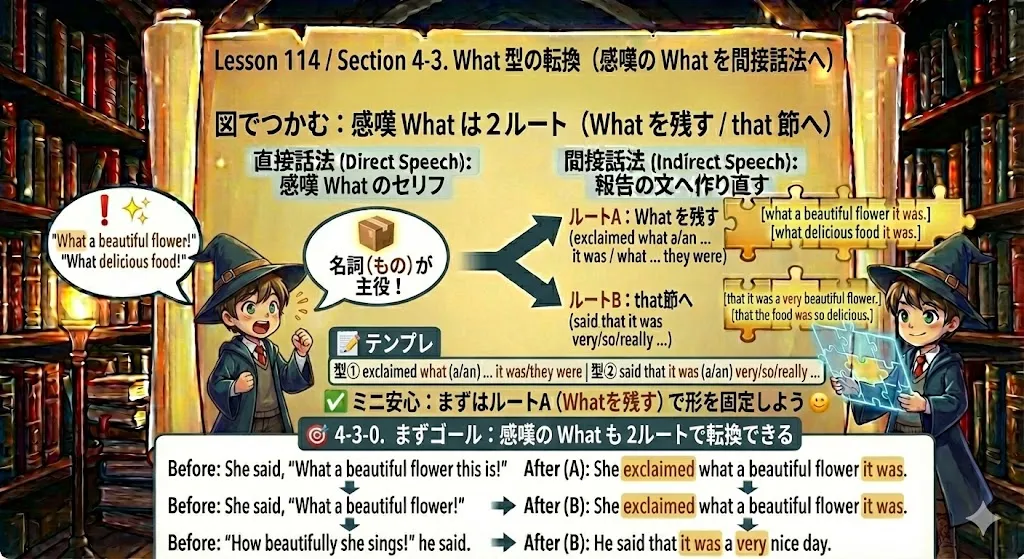
exclaimed what a/an ... it was / exclaimed what ... it wasルートB:that節へ →
said that it was very/so/really ...
🎯 4-3-0. まずゴール:感嘆の What も 2ルートで転換できる(Whatを残す / that節へ)
感嘆の What は「なんて〜なんだ!」という
気持ちを、
名詞(もの)に乗せて言います😊
間接話法では、次の2つのどちらかを選べばOKです。
🅰️ ルートA:What を残す(セリフ感を残す)
「What a/an ...」の形をそのまま報告して、気持ちを残したいときに便利✨
exclaimed what a/an ... it was
🅱️ ルートB:that節へ(自然な報告にする)
ふつうの説明文としてスッキリ言いたいときに便利😊 very / so / really で強さを足します。
said that it was very/so/really ...
まずは ルートA(What を残す)を覚えると、形が安定してミスが減ります😊
💬 例文(ゴール確認:2ルートどっちもOK)
She said, "What a beautiful flower this is!"
(彼女は「これはなんてきれいな花なの!」と言った。)
→ She exclaimed what a beautiful flower it was.
(それがなんてきれいな花なのかと彼女は感嘆した。)
He said, "What a nice day!"
(彼は「なんていい日なんだ!」と言った。)
→ He said that it was a very nice day.
(彼はとてもいい日だと言った。)
They said, "What delicious food!"
(彼らは「なんておいしい食べ物なんだ!」と言った。)
→ They exclaimed what delicious food it was.
(なんておいしい食べ物なのかと彼らは感嘆した。)
food / weather みたいに「数えにくい名詞」は、 ふつう a/an を付けません😊
🧩 4-3-1. 型①:Whatを残して転換(exclaim what a/an … it was / what … it was)
ここは「形」を固定してしまうのが勝ちです😊
単数の数えられる名詞なら
a/an を付けて
what a/an ... it was。
複数 / 不可算名詞なら
what ... they were / what ... it was の形でOKです✨
✅ What a/an + 形容詞 + 単数名詞! →
exclaimed what a/an + 形容詞 + 単数名詞 + it was✅ What + 形容詞 + 複数名詞! →
exclaimed what + 形容詞 + 複数名詞 + they were✅ What + 形容詞 + 不可算名詞! →
exclaimed what + 形容詞 + 不可算名詞 + it was
💬 例文で型①を固める(Whatを残す)
She said, "What a cute dog this is!"
(彼女は「これはなんてかわいい犬なの!」と言った。)
→ She exclaimed what a cute dog it was.
(それがなんてかわいい犬なのかと彼女は感嘆した。)
He said, "What an amazing idea that is!"
(彼は「それはなんてすごいアイデアなんだ!」と言った。)
→ He exclaimed what an amazing idea it was.
(それがなんてすごいアイデアなのかと彼は感嘆した。)
She said, "What beautiful flowers these are!"
(彼女は「これらはなんてきれいな花々なの!」と言った。)
→ She exclaimed what beautiful flowers they were.
(それらがなんて美しい花々なのかと彼女は感嘆した。)
these(複数)→ 報告では they にしやすいです😊
They said, "What terrible weather!"
(彼らは「なんてひどい天気なんだ!」と言った。)
→ They exclaimed what terrible weather it was.
(なんてひどい天気なのかと彼らは嘆いた。)
weather みたいな不可算名詞は a/an を付けない&it で受けるのが基本です😊
次は「that節への言い換え(型②)」で、もっと自然な報告文にもできます✨
🧩 4-3-2. 型②:that節へ言い換え(say that + very / so / really + 形容詞 + 名詞)
型①(exclaim what ...)はセリフ感を残せる一方で、
もっと 自然な説明文にしたいときは
型②が便利です😊
感嘆の What を消して、
強さ(very / so / really) を入れた
that 節で言い換えます。
※ that節=「〜だと」の形(セリフを“報告文”にするイメージ)
直接話法:
What a/an + 形容詞 + 名詞!間接話法:
said that it was a/an + very/so/really + 形容詞 + 名詞(複数/不可算のときは
a/an を外して形を調整)
💬 例文で覚える(that節ルート)
He said, "What a nice day!"
(彼は「なんていい日なんだ!」と言った。)
→ He said that it was a very nice day.
(彼はとてもいい日だと言った。)
She said, "What a wonderful performance!"
(彼女は「なんて素晴らしい演技なの!」と言った。)
→ She said that it was a really wonderful performance.
(彼女はそれは本当に素晴らしい演技だと言った。)
They said, "What beautiful flowers!"
(彼らは「なんてきれいな花々なんだ!」と言った。)
→ They said that the flowers were so beautiful.
(彼らはその花がとても美しいと言った。)
flowers は複数なので a/an を付けません😊報告文は
the flowers were so beautiful のように形を整えるのが自然です。
What の形にこだわるより、 “強さ(very/so/really)”で気持ちを表現するとスムーズです😊
🧠 4-3-3. 形のコツ:a/an・単数/複数/不可算・短い感嘆(What a pity! など)の扱い
What型は 名詞が主役なので、
ここを押さえるだけでミスが激減します😊
特に a / an と
単数/複数/不可算 が超重要です。
① 単数の数えられる名詞 →
a/an を付ける(例:What a day!)② 複数名詞 →
a/an は付けない(例:What beautiful flowers!)③ 不可算名詞(数えにくい) →
a/an は付けない(例:What delicious food!)
| タイプ | 直接話法の形 | 間接話法(型①の形) | ミニメモ |
|---|---|---|---|
| 🟦 単数(可算) | What a/an + adj + 名詞! |
exclaimed what a/an + adj + 名詞 + it was |
a/an が必要 |
| 🟩 複数 | What + adj + 複数名詞! |
exclaimed what + adj + 複数名詞 + they were |
they で受ける |
| 🟨 不可算 | What + adj + 不可算名詞! |
exclaimed what + adj + 不可算名詞 + it was |
it で受ける |
| 🟥 短い感嘆 | What a pity! / What a shame! |
said that it was a pity/shame |
that節が自然になりやすい |
💬 例文で確認(形のコツを実戦で)
She said, "What a lovely dress!"
(彼女は「なんて素敵なドレスなの!」と言った。)
→ She exclaimed what a lovely dress it was.
(それがなんて素敵なドレスなのかと彼女は感嘆した。)
He said, "What amazing pictures these are!"
(彼は「これらはなんてすごい写真なんだ!」と言った。)
→ He exclaimed what amazing pictures they were.
(それらがなんてすごい写真なのかと彼は感嘆した。)
a/an は不要。these → they で受けやすいです😊
They said, "What delicious food!"
(彼らは「なんておいしい料理なんだ!」と言った。)
→ They exclaimed what delicious food it was.
(なんておいしい料理なのかと彼らは感嘆した。)
food / weather / advice などは「数えにくい名詞」なので a/an を付けません😊
He said, "What a pity!"
(彼は「なんて残念なんだ!」と言った。)
→ He said sadly that it was a pity.
(彼は悲しそうに、それは残念だと言った。)
exclaim what ... より、say that ... の方が自然になりやすいです😊
次は「気持ちに合わせた動詞選び(admiringly / in surprise / complain)」で、表現をさらに自然にしていきましょう😊
🎭 4-3-4. 動詞の選び方:気持ちで言い方を変える(admiringly / in surprise / complain など)
What型は「名詞+気持ち」がセットなので、
どんな気持ちだったかを
動詞(または副詞)で表すと、英文がぐっと自然になります😊
exclaim は万能ですが、場面に合わせて
言い方
を変えられると一段上です✨
😍 ほめる →
say admiringly / praise😲 驚く →
say in surprise / exclaim😤 不満 →
complain / say angrily
| 気持ち | おすすめ動詞・言い方 | やさしい説明 |
|---|---|---|
| 😍 感心 |
say admiringly / praise
|
「すごい!」とほめる (感心して言う) |
| 😲 驚き |
say in surprise / exclaim
|
「えっ!?」とびっくり (驚いて言う) |
| 😤 不満 |
complain / say angrily
|
「イヤだな…」の気持ち (文句を言う) |
「型(Whatを残す / that節)」で形を決めたら、
次に 「気持ち(admiringly / in surprise / complain)」で“味つけ”すると覚えやすいです😊
💬 例文で確認(気持ちを“言い方”に乗せる)
"What a wonderful painting!" he said.
(彼は「なんて素晴らしい絵なんだ!」と言った。)
→ He said admiringly that it was a very wonderful painting.
(彼はそれは本当に素晴らしい絵だと感心して言った。)
She said, "What a huge house!"
(彼女は「なんて大きな家なの!」と言った。)
→ She said in surprise that it was a really huge house.
(彼女は驚いて、それは本当に大きな家だと言った。)
He said, "What terrible service!"
(彼は「なんてひどいサービスなんだ!」と言った。)
→ He complained that the service was so terrible.
(彼はサービスがとてもひどいと不満を言った。)
exclaim は万能。でも complain が使えると「文句」のニュアンスまで伝えられて自然です😊
✅ 4-3-5. まとめチェック:Whatを残す?that節にする?(3秒判定)
最後は「どっちにする?」を一瞬で決める練習です😊
A:Whatを残す(セリフ感)
か
B:that節にする(自然な報告)
を選びましょう。
🅰️ 「気持ちの形」を残したい →
exclaim what ...🅱️ 「説明文としてスッキリ」 →
say that ... very/so/really ...
She said, "What a lovely dress!"
(彼女は「なんて素敵なドレスなの!」と言った。)
→ She exclaimed what a lovely dress it was.(それがなんて素敵なドレスなのかと彼女は感嘆した。)
He said, "What a difficult problem!"
(彼は「なんて難しい問題なんだ!」と言った。)
→ He said that it was a really difficult problem.(彼はそれは本当に難しい問題だと言った。)
She said, "What a pity!"
(彼女は「なんて残念なの!」と言った。)
→ She said sadly that it was a pity.(彼女は悲しそうに、それは残念だと言った。)
「形(What/that)→ 言い方(気持ち)→ 形の調整」で完成です😊
4-4. “一言感嘆”の補い方(省略を補ってから間接話法へ)
“Amazing!” みたいな「一言だけの感嘆」は、
実は 文が省略(短く省いてある)されています😊
だから間接話法にするときは、まず
主語+be動詞
を補ってから、
say that ... の形に乗せるのがいちばん安全です✨
※ 省略=言葉を短くしていること(本当は “It was amazing.” みたいな形が隠れています)
🧩 図でつかむ:“一言感嘆”は「補って→報告」へ
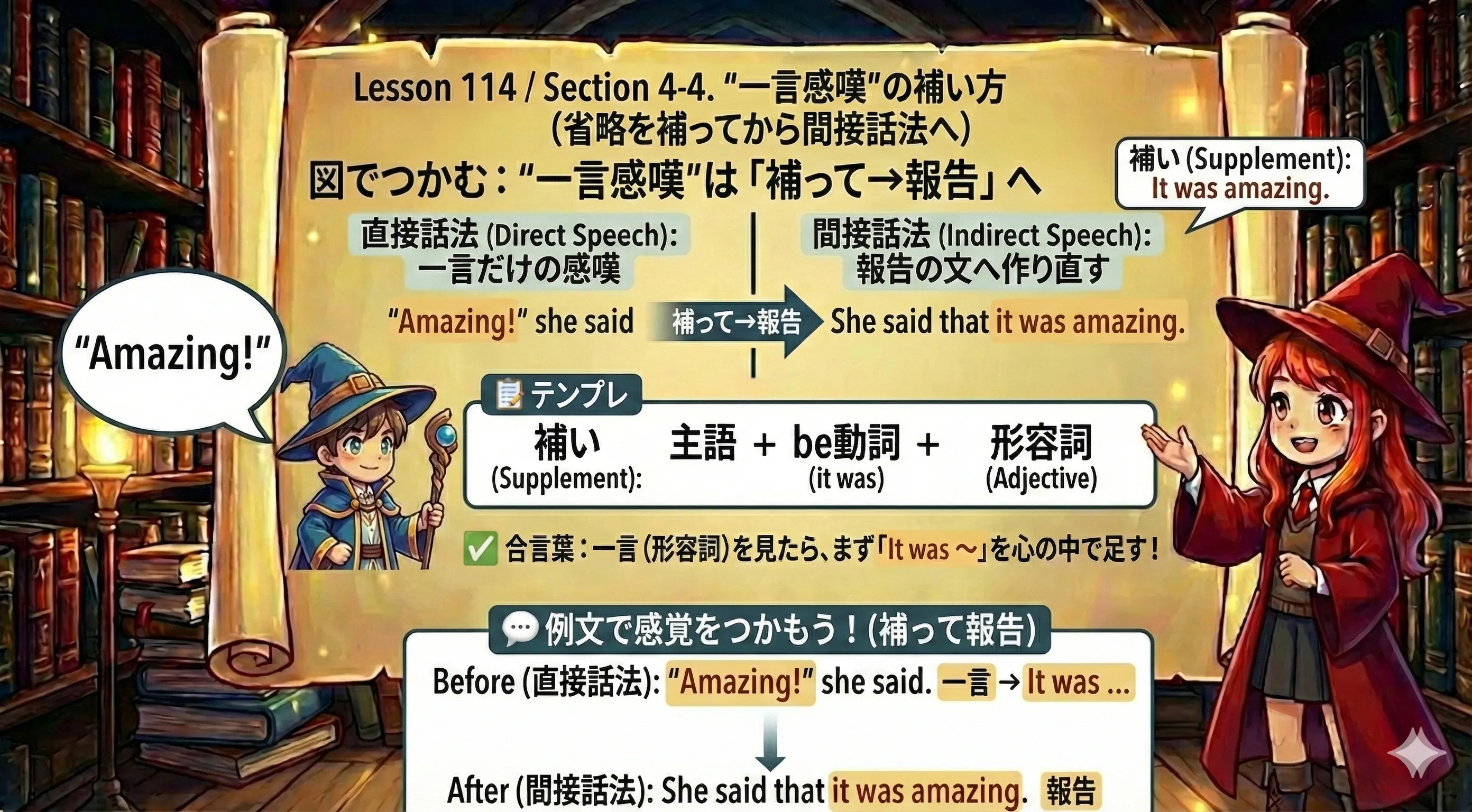
🎯 4-4-0. まずゴール:“一言感嘆”は「省略文」だから、補ってから間接話法にする
“Amazing!” のような一言は、気持ちだけがポン!と出ています😊
でも間接話法は「報告」なので、まず
何がどうだったの?
を補います。たいていは it was ~ でOKです。
一言(形容詞)を見たら、まず 「It was ~」 を心の中で足す!
💬 例文(ゴール確認:まず“補う”)
"Amazing!" she said.
(彼女は「すごい!」と言った。)
→ She said that it was amazing.
(彼女はそれがすごいと言った。)
"Beautiful!" he said.
(彼は「きれいだ!」と言った。)
→ He exclaimed that it was beautiful.
(彼はそれが美しいと感嘆した。)
"Terrible!" she said.
(彼女は「ひどい!」と言った。)
→ She said that it was terrible.
(彼女はそれはひどいと言った。)
🧩 4-4-1. パターンA:形容詞だけ系(Amazing! / Beautiful!)→「it was〜」を補う
形容詞だけの一言は、
「それは〜だった」
が隠れています😊
だから it was を補って、
say that ... に乗せれば完成!
さらに気持ちの強さは
very / so / really
で調整できます✨
直接話法:
"Adjective!"間接話法:
said (that) it was (very/so/really) adjective(adjective=形容詞=「きれい」「すごい」みたいな言葉)
💬 例文(形容詞だけ → it was ~)
"Incredible!" he said.
(彼は「信じられない!」と言った。)
→ He said that it was really incredible.
(彼はそれは本当に信じられないと言った。)
"So cute!" she said.
(彼女は「すっごく可愛い!」と言った。)
→ She said that it was so cute.
(彼女はそれはとても可愛いと言った。)
"Wonderful!" she said.
(彼女は「最高!」と言った。)
→ She said happily that it was a very wonderful day.
(彼女はうれしそうに、それはとても素晴らしい日だと言った。)
「Wonderful!」だけだと “何が?” が省略されています。
文にするときは
it was wonderful(または it was a wonderful day)のように
中身を補うと自然です😊
“一言(形容詞)” を見たら、 まず
it was を補って
that節で報告できればOKです😊
🧩 4-4-2. パターンB:What/How省略系(What a pity! / How nice!)→ What/How型として補う
What a pity! や How nice! は一言でも、
中身は 感嘆の What / How の仲間です😊
なので、What/How を残す型 で
間接話法にできます。
※ 「省略っぽいけど、実は “What/How型” が見えている」パターンです
What系:
exclaimed what a/an ... it was / said that it was a/an ...How系:
exclaimed how + adj + it was / said that it was very/so/really + adj(短い感嘆は that節が自然なことも多いです)
💬 例文(What/How省略系 → What/How型として補う)
He said, "What a pity!"
(彼は「なんて残念なんだ!」と言った。)
→ He said sadly that it was a pity.
(彼は悲しそうに、それは残念だと言った。)
She said, "How nice!"
(彼女は「なんて素敵なの!」と言った。)
→ She exclaimed how nice it was.
(それがなんて素敵なのかと彼女は感嘆した。)
She said, "What a surprise!"
(彼女は「なんて驚きなの!」と言った。)
→ She exclaimed what a surprise it was.
(それがなんて驚きなのかと彼女は感嘆した。)
What a pity! みたいな短い感嘆は、that節(It was a pity)が自然になりやすいです😊でも
How nice! は How を残すと学習効果が高いです✨
😱 4-4-3. パターンC:間投詞だけ系(Wow! / Oh no!)→ 感情+理由(that節)を補う
Wow! や Oh no! は、
気持ちだけが出ている表現です。
だから間接話法では
「なにに対してそう言ったのか」
を that 節で補うと安定します😊
※ 間投詞=「わぁ!」「うわっ!」みたいな短い反応のこと
直接話法:
"Wow!" / "Oh no!"間接話法:
exclaimed (in surprise) that ... / said worriedly that ...(that節の中身=状況の説明:it was / he had / she would ... など)
💬 例文(間投詞だけ → that節で理由を補う)
"Wow!" he said.
(彼は「わぁ!」と言った。)
→ He exclaimed in surprise that it was incredible.
(彼は驚いて、それは信じられないほどすごいと言った。)
"Oh no!" she said.
(彼女は「ああ、いやだ!」と言った。)
→ She said worriedly that it was serious.
(彼女は心配そうに、それは深刻だと言った。)
"Oops!" he said.
(彼は「あっ!」と言った。)
→ He said that he had made a mistake.
(彼は自分がミスをしたと言った。)
間投詞だけは、そのままだと “報告” にしにくいので、
that節の中に「状況」を1つ入れると安定します😊
🎭 4-4-4. パターンD:話し方で差が出る(admiringly / in surprise / angrily など)
“一言感嘆” は短いぶん、話し方(気持ち)が伝わると
英文がグッと自然になります😊
ポイントは、「動詞」か
「副詞」で
“気持ち”を足すことです。
※ 副詞=「どういうふうに言ったか」を表す言葉(admiringly=感心して、angrily=怒って)
形(it was / What / How / that節)を決めたら、次に
「どんな気持ち?」を 副詞や 動詞で足す!
| 気持ち | おすすめ表現 | 小学生向けの言い換え |
|---|---|---|
| 😍 感心 | said admiringly / praised |
「すごい!」とほめる |
| 😲 驚き | said in surprise / exclaimed |
「えっ!?」とびっくり |
| 😤 怒り | said angrily / shouted |
「怒って言う」 |
| 😞 しょんぼり | said sadly / sighed |
「悲しそうに言う」 |
💬 例文(話し方を足して自然にする)
"Amazing!" he said.
(彼は「すごい!」と言った。)
→ He said admiringly that it was amazing.
(彼は感心して、それはすごいと言った。)
"Wow!" she said.
(彼女は「わぁ!」と言った。)
→ She exclaimed in surprise that it was incredible.
(彼女は驚いて、それは信じられないほどすごいと言った。)
"Terrible!" he said.
(彼は「ひどい!」と言った。)
→ He said angrily that it was terrible.
(彼は怒って、それはひどいと言った。)
「文句」のときは
complain も便利です😊例:
He complained that it was terrible.
✅ 4-4-5. まとめチェック:何を補う?(it/that/主語)どの型?(What/How or that節)3秒判定
最後は “見た瞬間に処理が決まる” 状態を作ります😊
まず 何を補うか、
次に どの型に乗せるか を決めましょう。
① 形容詞だけ(Amazing!) → it was を補って
that節② What/Howが見える(What a pity! / How nice!) →
What/How型 か that節③ 間投詞だけ(Wow! / Oh no!) → 理由を
that節 で補う
"Amazing!" she said.
(彼女は「すごい!」と言った。)
→ She said that it was amazing.(彼女はそれがすごいと言った。)
He said, "How nice!"
(彼は「なんて素敵なんだ!」と言った。)
→ He exclaimed how nice it was.(それがなんて素敵なのかと彼は感嘆した。)
"Oh no!" she said.
(彼女は「ああ、いやだ!」と言った。)
→ She said worriedly that it was serious.(彼女は心配そうに、それは深刻だと言った。)
"So cute!" she said.
(彼女は「すっごく可愛い!」と言った。)
→ She said that the puppy was so cute.(彼女は子犬がとても可愛いと言った。)
①補う(it/that/主語)→ ②型を決める(What/How or that節)→ ③話し方で味つけ 😊
5. 祈願文の転換(May ...! を伝える:まずは全体像)
このセクションでは、直接話法の
He said to me, "May ...!"
のような文を、間接話法(だれかの言葉を「〜と言った」と伝える言い方)に
“自然に変換(転換)”できるようにします✨
キーワードは that節(that から始まる文のかたまり)と、
祈願を表す may / might(※ここでは「可能性」ではなく「祈り・願い」を表す使い方)です。
ここでは詳しい説明に入る前に、「まずはざっくりイメージをつかむ」ことを目標にしましょう。
むずかしい用語が出てきたら、 (かんたんな日本語の言いかえ) を一緒に置いていきます。例:時制の一致(時を合わせるルール)/転換(形を変えて伝えやすくすること)
🖼️ 図でつかむ:祈願文 “May ...!” を「伝える形」へ
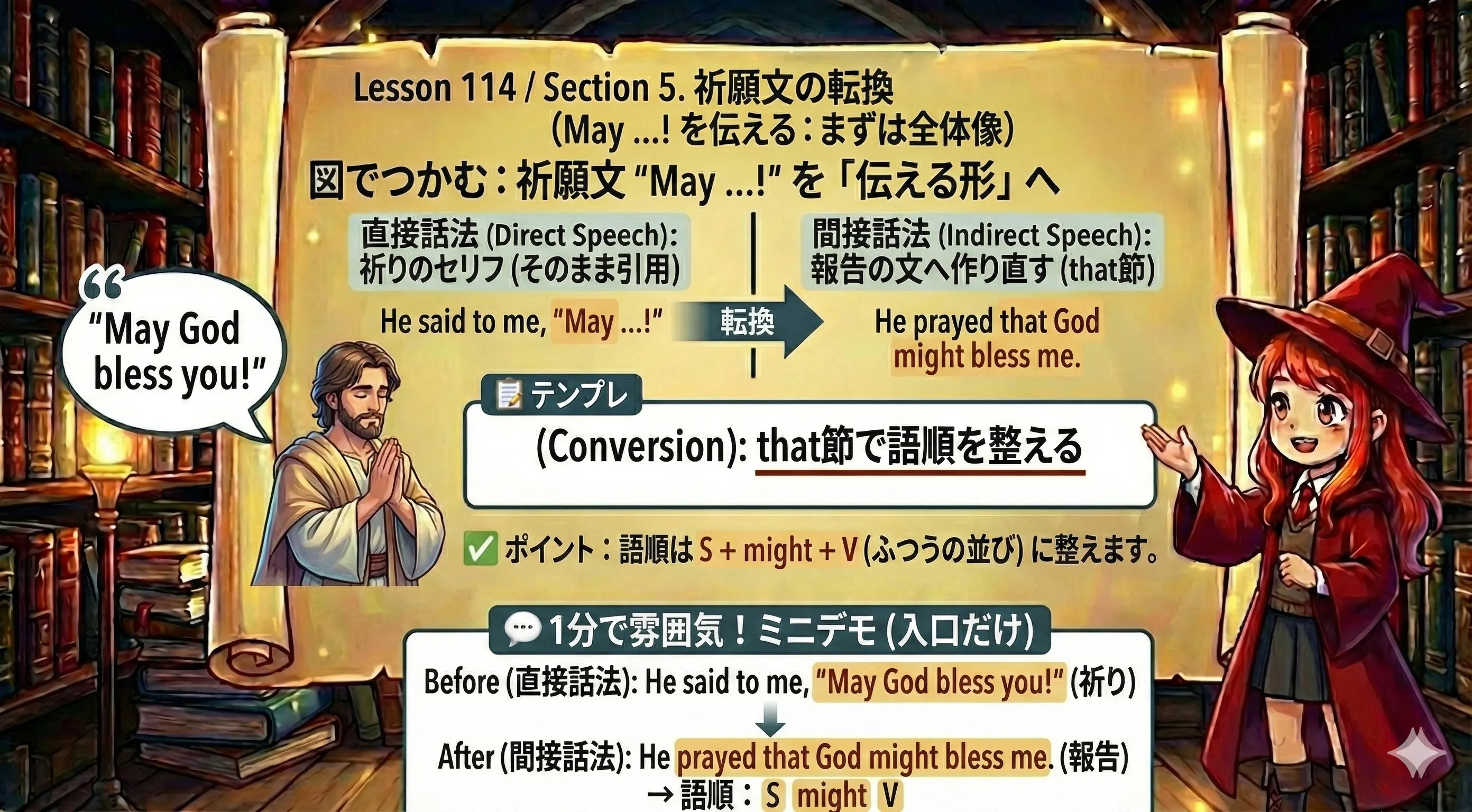
He said to me, "May ...!"間接話法では
that を使い、語順を整えて:... that S might V(※基本形の目安)
ここではまだ“入口”なので、細かいルールは 5-1〜5-4 でやさしく分解していきます😊
✨ 次はどちらから読む? 5-1 ~ 5-4 へのナビゲーション
ここは “入口ページ” なので、5-1〜5-4 はどこから読んでもOKです😊
「気になる」「使いそう!」と思ったところから進むと、勉強が続きやすいですよ。
まずはこのページで全体像だけつかんで、あとは必要なルートへジャンプしましょう!
He said, "May ...!" を、間接話法の that節 にして
「願い・祈りを伝える文」に変えられるようにすること。
※ 5-1〜5-4 では、各項で例文をしっかり(各3つ以上)扱いながら感覚を固めます👍
He said to me, “May God bless you!”
(彼は私に「神の祝福がありますように!」と言った。)
He prayed that God might bless me.
(彼は私に神の祝福がありますようにと祈った。)
S + might + V(ふつうの並び)に整えます。
ここまで読めたあなたは、もう準備はバッチリです😊✨
あとは 5-1〜5-4 で「型 → 使い分け → ルール → 場面別」と順に積み上げるだけ!
人は「完璧に分かってから始める」よりも、 「だいたい分かった状態でまず動いてみる」 方が、記憶に残りやすく学習が続きやすいです😊
まずは入口で全体像をつかんで、気になるカードから進めばOK!
5-1. まずは正体!祈願文 “May + S + V!” を見抜く&基本の転換手順
このパートは、祈願文(きがんぶん:「〜になりますように」と願う文)の
May + S + V! を
「直接話法 → 間接話法」
に変えるための入口です😊
まずは May の正体を見抜き、that節(that から始まる文のかたまり)に入れるときの
語順の整え方をつかみましょう。
※ 直接話法=「言った+そのまま引用」/間接話法=「〜と言ったと内容を伝える形」
ポイントは、 “May + S” の語順のまま that節に入れない こと! that節の中では S + might + V のように “ふつうの語順” に戻します✨
🧭 図でつかむ:祈願文 “May ...!” を that節で「伝える形」へ
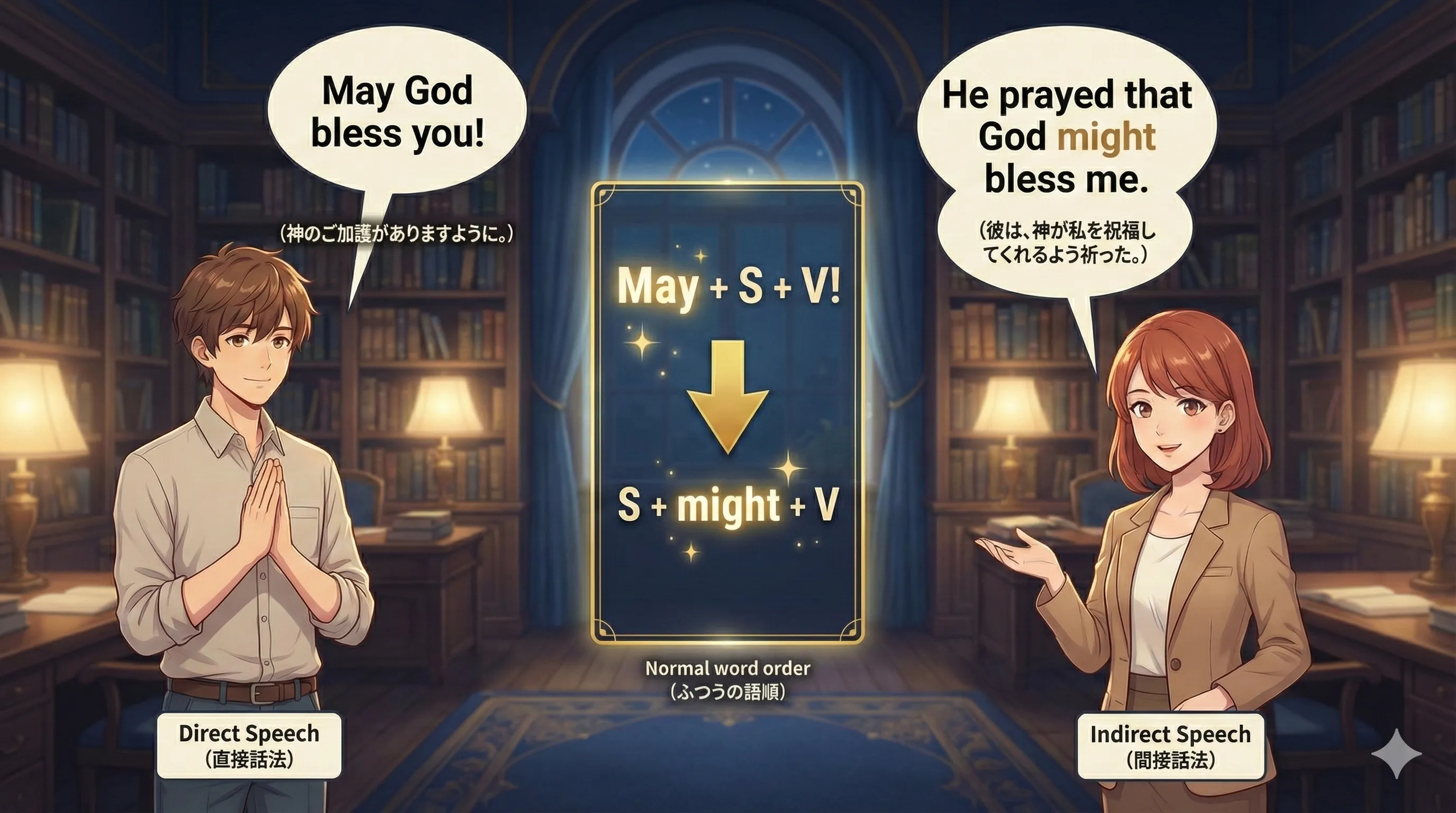
He said to me, “May God bless you!”間接話法:
He prayed that God might bless me.✅ 祈願の
May は、that節の中で might になることが多いです(時制の一致:時を合わせるルール)。
🔎 「May」の正体を見抜く(許可の May と区別)
May は 2つの顔を持ちます😊
① 許可(〜してもいい?)
と
② 祈願(〜になりますように!)
です。
このセクションで扱うのは ② 祈願 のほう!
that節に入れるときは、語順を
S + might + V
に整えます。
May I + V ... ?質問の形で、相手にOKをもらうイメージです。
May + S + V!that節の中では S + might + V に戻します(祈願の語順のまま入れない)。
「許可」は “May I …?” /「祈願」は “May + S + V!”
そして祈願を伝えるときは、that節で S + might + V に整える!
He said to me, “May God bless you!”
(彼は私に「神の祝福がありますように!」と言った。)
He prayed that God might bless me.
(彼は私に神の祝福がありますようにと祈った。)
She said, “May you recover soon!”
(彼女は「早く回復しますように!」と言った。)
She wished that I might recover soon.
(彼女は私が早く回復するようにと願った。)
They said, “May our team win!”
(彼らは「私たちのチームが勝ちますように!」と言った。)
They expressed their wish that their team might win.
(彼らは自分たちのチームが勝つようにと願いを表した。)
express one’s wish that ... は少しフォーマル(かたい言い方)で、説明文に相性◎です。
🧩 「直接話法」の形を確認(伝達部+引用部がセット)
直接話法は、「伝達部(He said ...)」+「引用部(“...”)」がセットです。
祈願文のときも同じで、引用部に May + S + V! が入ります。
間接話法にするときは、引用符を外して that節 にし、語順を整えて
S + might + V の形へ持っていきます😊
S + said (to 人),
“May + S + V!”
S + prayed / wished
that S + might + V.
He said to me, “May God bless you!”
(彼は私に「神の祝福がありますように!」と言った。)
He prayed that God might bless me.
(彼は私に神の祝福がありますようにと祈った。)
The host said, “May everyone enjoy the ceremony!”
(司会者は「皆さんが式典を楽しめますように!」と言った。)
The host wished that everyone might enjoy the ceremony.
(司会者は皆が式典を楽しめるようにと願った。)
She said, “May you have a safe trip!”
(彼女は「安全な旅になりますように!」と言った。)
She expressed her wish that I might have a safe trip.
(彼女は私が安全な旅をできるようにと願いを表した。)
express one’s wish that ... は「願いを表す」の少しかたい言い方(文章で便利)です😊
「祈願の May を見抜く」+「直接話法は 伝達部+引用部」まで分かれば、 次の 5-2 以降がスイスイ進みます✨
🧠 基本の転換手順(3ステップで“型”にする)
祈願文の転換は、「3ステップ」で機械的にできます😊
直接話法の He said, "May ...!" を見たら、
伝達動詞 → that節 → 語順&may
の順に整えましょう。
said のままだと「ただ言った」になりがち。祈願は
pray / wish / express (one's wish) を使うと意味が伝わります✨
" " を外して that + 文 へ。(that節=that から始まる文のかたまり)
that節では S + might + V にします。
(時制の一致:時を合わせるルール)
「祈願の May」は that節で “S + might + V” に整える(May + S の並びのまま入れない)😊
He said to me, “May God bless you!”
(彼は私に「神の祝福がありますように!」と言った。)
He prayed that God might bless me.
(彼は私に神の祝福がありますようにと祈った。)
said → prayed / 引用 → that /
God might bless(語順を整える)
She said, “May you recover soon!”
(彼女は「早く回復しますように!」と言った。)
She wished that I might recover soon.
(彼女は私が早く回復するようにと願った。)
He said, “May she lead a happy life!”
(彼は「彼女が幸せな人生を送れますように!」と言った。)
He expressed his wish that she might lead a happy life.
(彼は彼女が幸せな人生を送るようにと願いを表した。)
express one's wish that ... は少しフォーマル(かたい言い方)で、説明文や文章に便利です。
🧯 “ありがちミス”を先に潰す(成功率アップ)
ここを先に押さえると、ミスが激減します😊
とくに多いのは
① 語順
と
② may → might
と
③ 代名詞(you→me など)
です。
語順(May + S のまま?)→ might(時制の一致)→ 代名詞(視点に合ってる?)
He said, “May you be happy!”
(彼は「幸せでありますように!」と言った。)
He said that may you be happy.
(× that節の中に「May you」の語順を残してしまう)
He wished that I might be happy.
(彼は私が幸せであるようにと願った。)
She said, “May you recover soon!”
(彼女は「早く回復しますように!」と言った。)
She wished that I may recover soon.
(× said 系が過去なら、that節も時を合わせて might が基本)
She wished that I might recover soon.
(彼女は私が早く回復するようにと願った。)
might は「可能性」ではなく、祈願の may を
時制の一致で整えた形です😊
He said to me, “May God bless you!”
(彼は私に「神の祝福がありますように!」と言った。)
He prayed that God might bless you.
(× 「私に」と言われたのに you のままだと、だれのことかズレやすい)
He prayed that God might bless me.
(彼は私に神の祝福がありますようにと祈った。)
祈願文の転換は 「語順 → might → 代名詞」 の順にチェックすると失敗しにくいです😊
🎯 5-1 のまとめ(この1つだけ覚えればOK)
祈願の “May + S + V!” は、that節では “S + might + V” に整える 😊
He said (to me), "May ...!"
S + said (to 人),
“May + S + V!”
that で内容を伝える。
祈願のときは pray / wish / express (one's wish) を使うのがコツ✨
S + prayed / wished
that S + might + V.
🧠 3ステップで復習(迷ったらここに戻る)
-
伝達動詞を変更:
said→pray / wish / express(祈る・願うをはっきりさせる) -
that節にする:
" "を外してthat + 文(that節=that から始まる文のかたまり) - 語順&助動詞を整える: May + S のまま入れず、 S + might + V (時制の一致:時を合わせるルール)
💬 ミニ例で最終チェック(これが言えたら合格!)
He said to me, “May God bless you!”
(彼は私に「神の祝福がありますように!」と言った。)
He prayed that God might bless me.
(彼は私に神の祝福がありますようにと祈った。)
God might bless)/may → might OK/you → me OK
「全部を完璧に覚えてから」じゃなくて大丈夫😊
まずはこの “S + might + V” の型 だけ持って、例文を見ながら慣れていきましょう!
5-2. 伝達動詞の使い分け:express / pray / wish(どれを選ぶ?)
祈願文(きがんぶん:「〜になりますように」と願う文)を間接話法で伝えるとき、
said のままだと「ただ言った」になりやすいので、
“祈る・願う” を表す動詞を選びます😊
ここでは pray / wish / express (one's) wish の
得意分野をつかんで、
「どれを使う?」の迷いをなくしましょう✨
まずはざっくり、場面(宗教・日常・式典)で選ぶのがコツです。
🗺️ 図でイメージ:3つの動詞の「担当エリア」
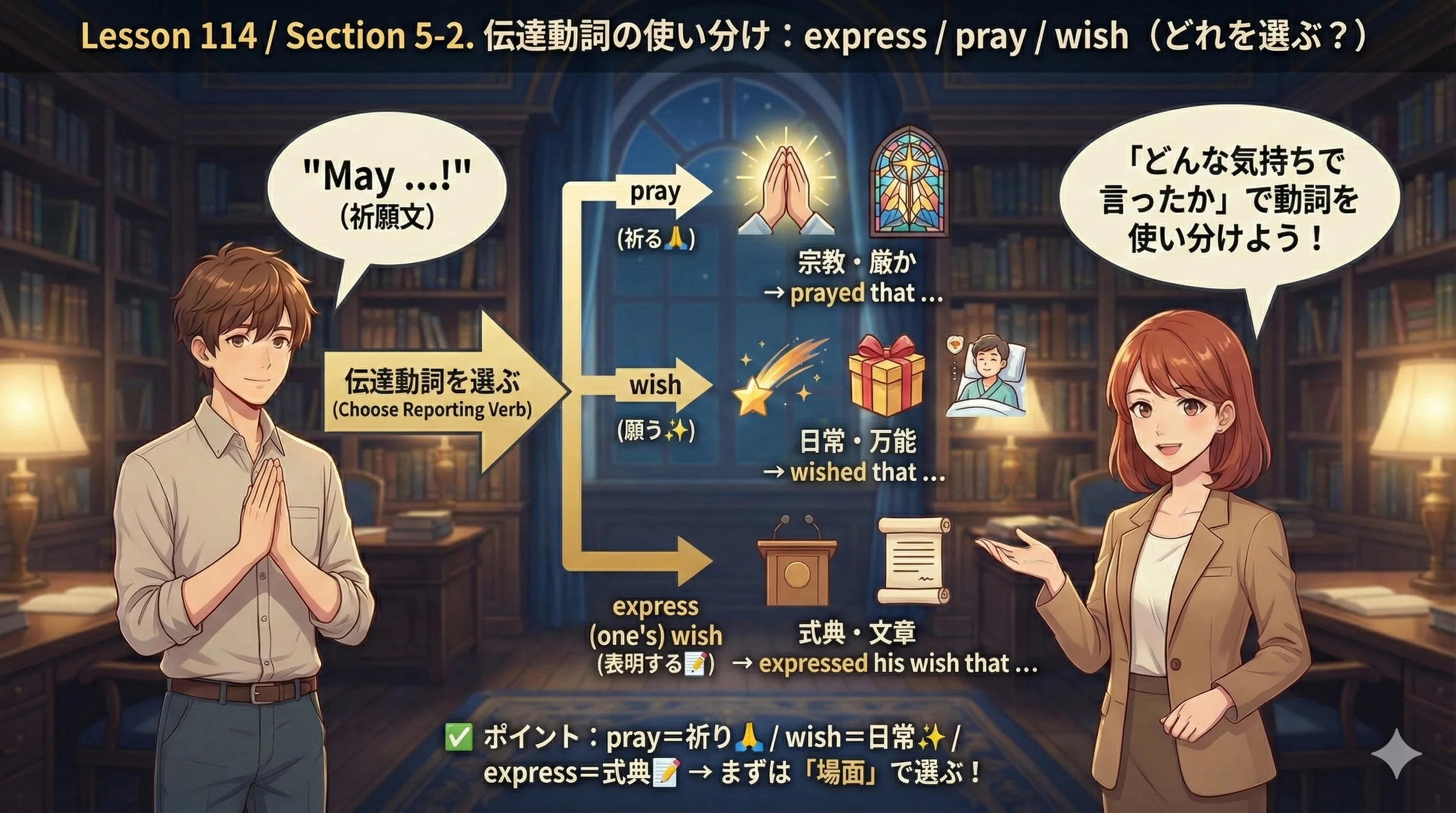
pray=祈り(厳か)🙏 /
wish=日常の願い✨ /
express (one's) wish=文章・式典向け📝
まずはこの「ざっくり地図」を持って、例文で感覚を固めましょう😊
🧭 まずは全体像:3語の“得意分野”をつかむ(選び方の軸)
迷ったら、まずは 「場面」で選びましょう📌
(場面=どういうシーンか、のこと)
💡 pray=宗教・厳か/ wish=日常・万能/ express=式典・文章
God / peace / safe などと相性◎
回復・成功・旅行など、ふつうの願いにピッタリ。
スピーチ・式典・説明文で強い。
祈りっぽい → pray / 日常の願い → wish / 文章・式典 → express (one’s) wish
He said to me, “May God bless you!”
(彼は私に「神の祝福がありますように!」と言った。)
He prayed that God might bless me.
(彼は私に神の祝福がありますようにと祈った。)
She said, “May you recover soon!”
(彼女は「早く回復しますように!」と言った。)
She wished that I might recover soon.
(彼女は私が早く回復するようにと願った。)
The host said, “May everyone enjoy the ceremony!”
(司会者は「皆さんが式典を楽しめますように!」と言った。)
The host expressed his wish that everyone might enjoy the ceremony.
(司会者は皆が式典を楽しめるようにと願いを表した。)
express one’s wish that ... は「願いを表す」の少しかたい表現(文章向き)です。
🙏 pray を選ぶのはどんな時?(“祈り”が主役の場面)
pray は「祈る」なので、
宗教・厳かな雰囲気や
心から祈る場面でぴったりです。
(厳か=まじめで静かな雰囲気)
God, peace, forgive, safe など(神・平和・許し・無事)
式典・教会・重大な場面でも自然です。
“祈っている感じ”が強いなら pray(日常の軽い願いなら wish へ)
He said, “May God forgive us.”
(彼は「神が私たちをお許しくださいますように」と言った。)
He prayed that God might forgive them.
(彼は神が彼らを許すようにと祈った。)
They said, “May there be peace in the world.”
(彼らは「世界に平和がありますように」と言った。)
They prayed that there might be peace in the world.
(彼らは世界に平和があるようにと祈った。)
She said, “May everyone be safe tonight.”
(彼女は「今夜みんなが無事でありますように」と言った。)
She prayed that everyone might be safe that night.
(彼女はその夜みんなが無事であるようにと祈った。)
tonight → that night のように、状況に合わせて言い方が変わることもあります(ここは Section 4 の復習ポイント)。
✨ wish を選ぶのはどんな時?(いちばん万能:日常の「願い」)
wish は「願う」で、いちばん使いやすい万能選手です😊
日常の気づかい(回復・成功・旅行・応援など)にピッタリで、
pray ほど厳か(まじめで静かな雰囲気)ではないけれど、
気持ちはしっかり伝えたいときに使います。
recover / feel better✅ 旅行:
safe trip / enjoy your stay✅ 新生活:
new job / new school
相手の幸せを願う気持ちは十分に出せます✨
迷ったら wish! (日常の願い・気づかい・応援はだいたいOK😊)
She said, “May you have a safe trip!”
(彼女は「安全な旅になりますように!」と言った。)
She wished that I might have a safe trip.
(彼女は私が安全な旅をできるようにと願った。)
He said, “May your new job go well!”
(彼は「新しい仕事がうまくいきますように!」と言った。)
He wished that my new job might go well.
(彼は私の新しい仕事がうまくいくようにと願った。)
go well は「うまくいく」。会話でも文章でも使いやすい表現です😊
They said, “May you enjoy your stay.”
(彼らは「滞在を楽しめますように」と言った。)
They wished that we might enjoy our stay.
(彼らは私たちが滞在を楽しめるようにと願った。)
you → we / our のように、間接話法では「だれ目線か」で代名詞が変わります。
📝 express (one’s) wish を選ぶのはどんな時?(文章・公式っぽさ)
express (one's) wish は「願いを表す」という
少しかたい表現です😊
スピーチ・式典・公式コメントなど、
文章っぽい場面でとても相性がよく、
「ちゃんと気持ちを表明している」感じが出ます✨
(「スピーチ・文章」っぽいとき)
express + (one's) wish + that + S + might + V(that節の中は S + might + V)
「文章っぽく丁寧に言いたい」→ express (one’s) wish 📝
The host said, “May this event be a great success.”
(司会者は「このイベントが大成功しますように」と言った。)
The host expressed his wish that the event might be a great success.
(司会者はそのイベントが大成功するようにと願いを表した。)
The principal said, “May you all have a wonderful future.”
(校長は「皆さんの未来がすばらしいものになりますように」と言った。)
The principal expressed his wish that they all might have a wonderful future.
(校長は彼らの未来がすばらしいものになるようにと願いを表した。)
express は「表す」。ここでは「気持ち(願い)を文章として伝える」感じです😊
The spokesperson said, “May the victims recover soon.”
(報道担当者は「被害者の方々が早く回復しますように」と言った。)
The spokesperson expressed their wish that the victims might recover soon.
(担当者は被害者が早く回復するようにと願いを表した。)
🧩 どれを選ぶ?ミニ判定(“選ぶ練習”で定着させる)
ここは“暗記”じゃなく“判断”でOK😊
直接話法 He said, "May ...!" を見たら、
場面(宗教/日常/公式)を見て
pray・wish・express (one's) wish を選びましょう。
God・peace など祈りっぽい? → pray / 日常の気づかい? → wish / 式典・公式コメント? → express (one’s) wish
👀 これを見たらどれを選ぶ?(答えは上のバッジ)
He said, “May God protect you.”
(彼は「神があなたを守りますように」と言った。)
He prayed that God might protect me.
(彼は神が私を守るようにと祈った。)
God が出てくる+厳かな願い → pray 🙏
👀 これを見たらどれを選ぶ?(答えは上のバッジ)
She said, “May you feel better soon.”
(彼女は「早く元気になりますように」と言った。)
She wished that I might feel better soon.
(彼女は私が早く元気になるようにと願った。)
👀 これを見たらどれを選ぶ?(答えは上のバッジ)
The chairperson said, “May the project succeed.”
(議長は「プロジェクトが成功しますように」と言った。)
The chairperson expressed his wish that the project might succeed.
(議長はプロジェクトが成功するようにと願いを表した。)
👀 迷ったらどうする?(答えは上のバッジ)
He said to her, “May your day be great.”
(彼は彼女に「すてきな1日になりますように」と言った。)
He wished that her day might be great.
(彼は彼女の1日がすてきなものになるようにと願った。)
🎯 5-2 のまとめ(迷ったらこの3行)
例:
God, peace, safe
迷ったらこれが安全😊
型:
express one’s wish that ...
“正解を当てる”より、“場面で判断する”方が英語はスッと身につきます😊
次の 5-3 では、may → might の感覚をさらに安定させます!
5-3. 時制の一致:may → might("祈願の might" を怖がらない)
祈願文(きがんぶん:「〜になりますように」と願う文)を間接話法で伝えるとき、
may が might に変わるのを見て
「えっ…might って “可能性(かもしれない)” じゃないの?」と不安になる人が多いです😳
でも大丈夫😊 ここでの might は
“可能性” ではなく
「時制の一致(時をそろえるルール)」で出てくる形です。
まずは「怖くない理由」をつかんで、次に「過去の伝達なら might が基本」を型で固めましょう✨
🧠
図で安心:祈願の might は「可能性」じゃなく「時を合わせる」
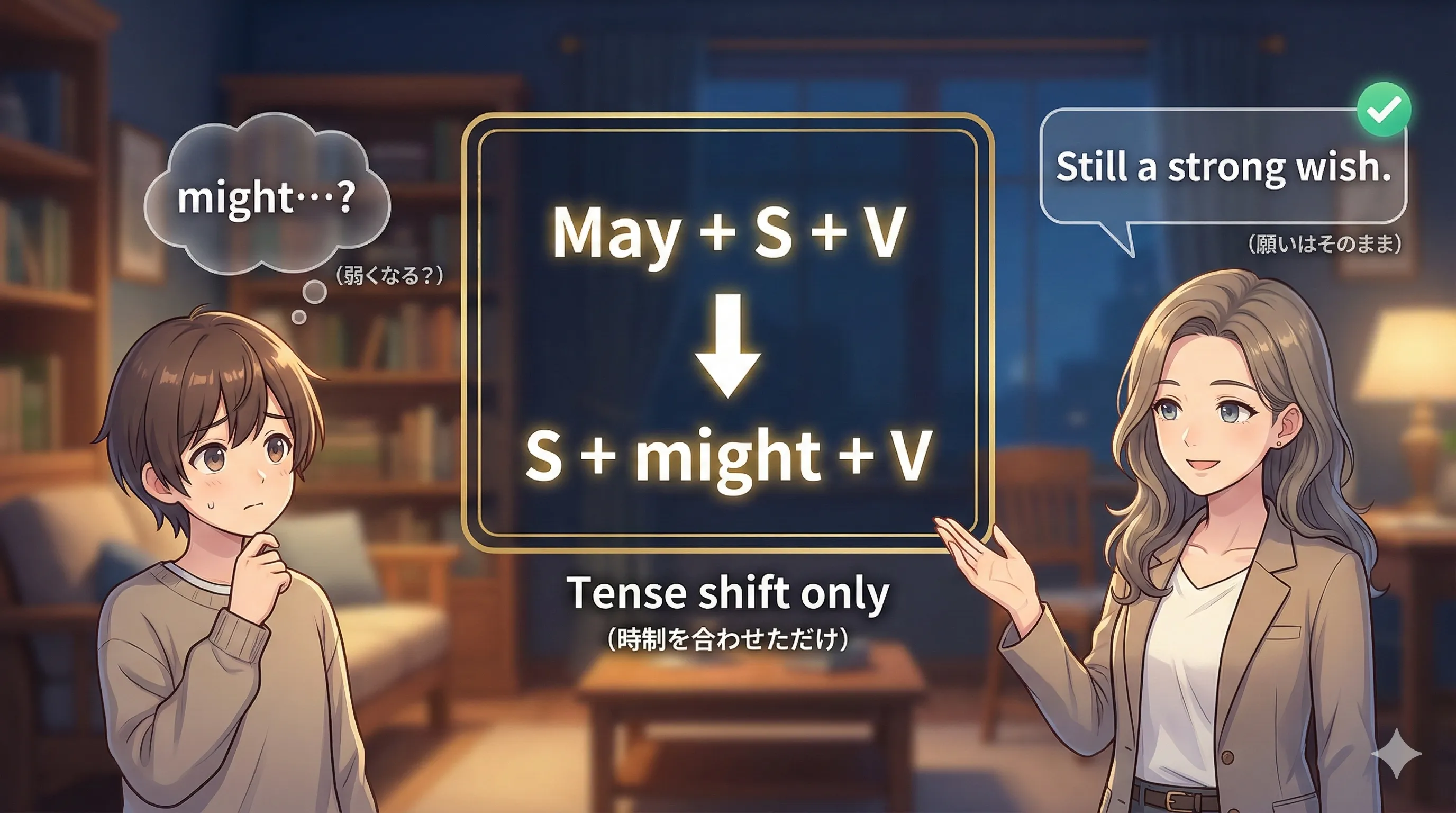
might は「かもしれない」じゃなくて、
may(祈願)を過去に合わせた形です😊
🧯 まず誤解をほどく:祈願の might は「可能性」じゃない
ふだんの might は「たぶん〜かも(可能性)」のイメージがありますよね🤔
でも、祈願文の転換で出てくる might は別物です✨
「願いの may」が
過去の伝達(said / prayed など)に引っぱられて
might になっているだけで、気持ちは弱くなりません😊
「might だから、願いが弱い/可能性が低い」
✅ 正解:
「過去に合わせた may(祈願)の形」
He said, “May God bless you!”
(彼は「神の祝福がありますように!」と言った。)
He prayed that God might bless me.
(彼は神が私を祝福するようにと祈った。)
might は「かもしれない」ではなく、祈願の may を過去に合わせた形です。
She said, “May you recover soon!”
(彼女は「早く回復しますように!」と言った。)
She wished that I might recover soon.
(彼女は私が早く回復するようにと願った。)
might は「時を合わせた」だけです😊
They said, “May there be peace in the world.”
(彼らは「世界に平和がありますように」と言った。)
They prayed that there might be peace in the world.
(彼らは世界に平和があるようにと祈った。)
there might be は「〜があるように」の祈願でよく使われます(ここでも可能性ではありません)。
🕒 ルールの核:時制の一致(過去の伝達 → might が基本)
時制の一致は「時(とき)をそろえるルール」です🕒
(時制=現在・過去などの “時” の形)
祈願文を伝えるとき、伝達動詞が過去(said / prayed / wished など)なら、
that節の may は 基本は might にそろえます。
may → might にそろえる😊
(that節の中は “S + might + V”)
said(過去)→ that節の may は might(祈願の型)
He said, “May you be happy!”
(彼は「幸せでありますように!」と言った。)
He wished that I might be happy.
(彼は私が幸せであるようにと願った。)
She said, “May your dream come true!”
(彼女は「夢が叶いますように!」と言った。)
She wished that my dream might come true.
(彼女は私の夢が叶うようにと願った。)
come true は「叶う」。祈願でよく使う定番フレーズです✨
The host said, “May this event be a success!”
(司会者は「このイベントが成功しますように!」と言った。)
The host expressed his wish that the event might be a success.
(司会者はそのイベントが成功するようにと願いを表した。)
said)なので、that節は might が基本です😊
💪 「might にすると意味が弱い?」への答え(気持ちは弱くならない)
「might って “弱そう” …」と感じるのは自然です😳
でも、ここでの might は
“可能性の might” ではなく、
“祈願の may を過去に合わせた might” です。
だから願いの気持ちは弱くなりません😊✨
可能性の might(たぶん〜かも) と 祈願の might(〜しますように) は別物!
He said, “May you pass the exam!”
(彼は「試験に受かりますように!」と言った。)
He wished that I might pass the exam.
(彼は私が試験に受かるようにと願った。)
might は時を合わせただけです😊
She said, “May your family be safe.”
(彼女は「ご家族が無事でありますように」と言った。)
She prayed that my family might be safe.
(彼女は私の家族が無事であるようにと祈った。)
might でも気持ちは弱くなりません。
They said, “May the project succeed.”
(彼らは「プロジェクトが成功しますように」と言った。)
They expressed their wish that the project might succeed.
(彼らはそのプロジェクトが成功するようにと願いを表した。)
might でもしっかり伝わります😊
🕊️ may のまま残ることはある?(“今も有効”の感覚)
基本は said(過去)→ might でOKです😊
ただ、英語では「今も続く祈り・今も有効な願い」として
may を残す書き方を見かけることもあります。
ここでは混乱しないために、
「見かけても驚かない」くらいの感覚で覚えておきましょう✨
学習段階では 過去の伝達なら might にそろえるのが安全。
may が残る例は「今も続く願い」などのニュアンスとして理解すればOK😊
said / prayed)なら、that節は
might にそろえるのが基本🕒
may を残す書き方も見かける🕊️
He said, “May God bless you!”
(彼は「神の祝福がありますように!」と言った。)
He prayed that God might bless me.
(彼は神が私を祝福するようにと祈った。)
He prayed that God may bless me.
(彼は神が私を祝福してくださるようにと祈った。)
may を残すのは「今も続く祈り」っぽいニュアンスとして見かけます。学習ではまず might でOK😊
She wished that I might recover soon.
(彼女は私が早く回復するようにと願った。)
She wishes that I may recover soon.
(彼女は私が早く回復するように願っている。)
wishes)なら may が自然になります。
They prayed that there might be peace in the world.
(彼らは世界に平和があるようにと祈った。)
They pray that there may be peace in the world.
(彼らは世界に平和があるように祈っている。)
may。ただし学習ではまず might を基本にすると迷いません😊
🧷 ミス防止:チェック項目(語順/might/代名詞)
祈願文の転換は、実はミスの型がほぼ決まっています😊
だから「チェックする場所」を先に固定すると、正答率が一気に上がります✨
① that節の語順:
S + might + V② 伝達が過去:
may → might(学習では基本これでOK)③ 代名詞:
you → me など「だれ目線?」を確認
that節の中は、祈願でも May + S の形を残さないのが基本です。
He prayed that may you be happy.
He prayed that I might be happy.
S + might + V)
伝達動詞が過去(said など)なら、
学習では may → might にそろえるのが安全です😊
He prayed that God may bless me.
might に統一すると迷いません)
He prayed that God might bless me.
said が過去 → that節も might に)
祈願文は 相手に言うことが多いので、 間接話法にするときは 目線(だれ向け?)をチェックします👀
He said to me, "May God bless you!"
He prayed that God might bless me.
you(相手)→ me(話し手側)など、間接話法では「誰の立場で報告するか」で変わります。
🎯 5-3 のまとめ(“祈願の might” は怖くない)
祈願の
might は「可能性」じゃない。過去の伝達に合わせた “祈願の may” の形です😊
S + prayed / wished + that + S + might + V
S + might + V②
may → might(過去なら)③
you → me(目線)
「
might=弱い」と思って止まらなくてOK😊“時を合わせるだけ” と分かれば、祈願文の転換は一気にラクになります✨
5-4. 場面別に自然化:祝福・乾杯・式典・メッセージの祈願文を“報告”する
祈願文(きがんぶん:「〜になりますように」と願う文)の May ...! は、
そのまま直訳で“報告”すると少し不自然になることがあります😅
そこでこの小セクションでは、場面(シーン)に合わせて
pray / wish / express (one’s) wish を選び、
英語らしい“報告のしかた”に自然化するコツをつかみます✨
「乾杯なら乾杯っぽく🍷」「式典なら式典っぽく🎤」のように、場面語をちょい足しできると一気に自然になります😊
🗺️ 図でつかむ:場面によって“報告のしかた”が変わる
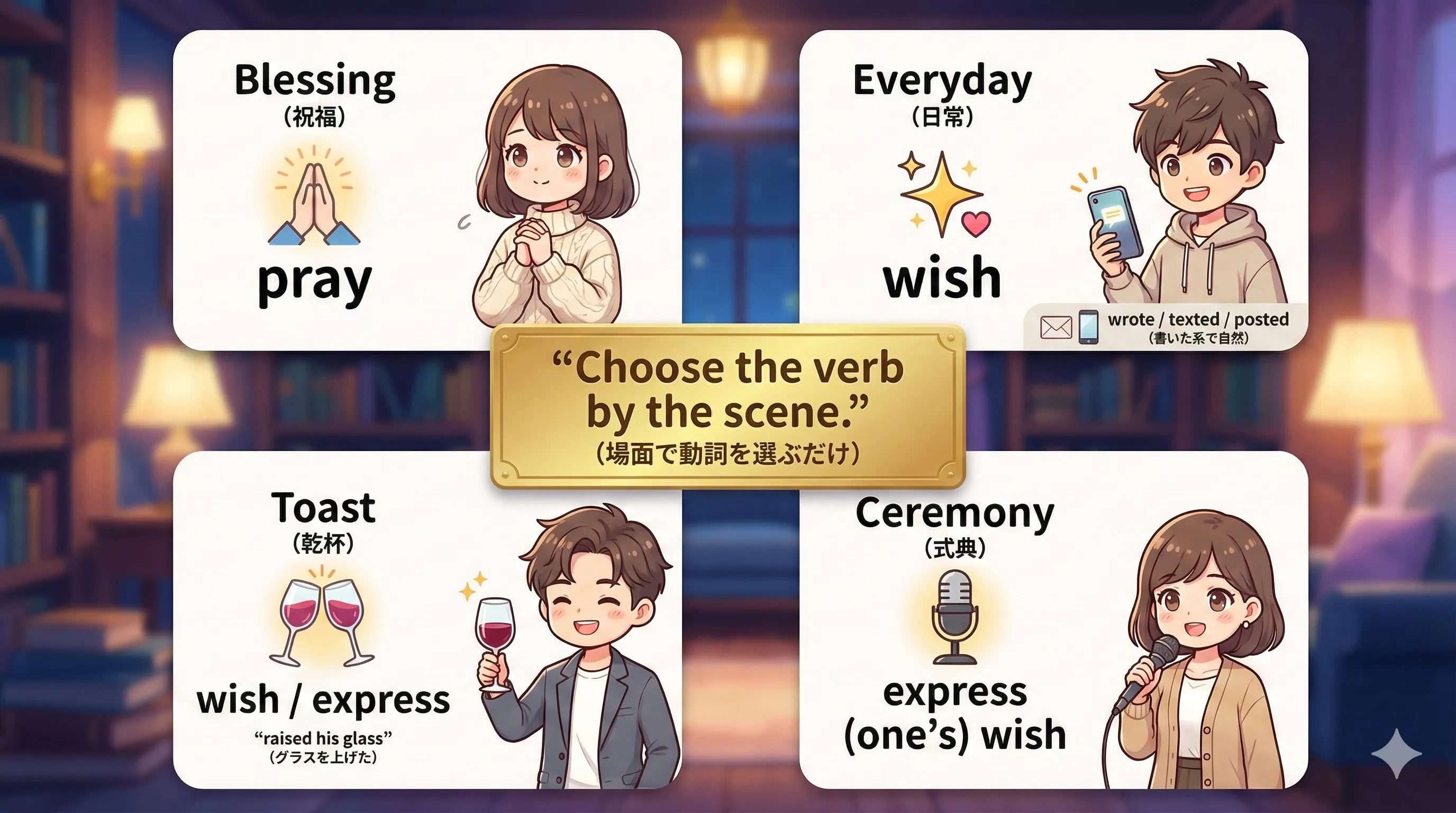
場面(宗教/日常/公式/乾杯)を見て、 動詞(pray / wish / express)を選ぶだけ😊
🧭 まず全体像:場面で「報告のしかた」が変わる(自然化の地図)
同じ May ...! でも、場面が変わると“報告のしかた”も変わります😊
ざっくり言うと、厳かなら pray、
日常なら wish、
公式なら express (one’s) wish が得意です✨
「自然化」=(英語らしく言い直して、場面にピッタリの“報告”にすること)です。
God / peace などが出やすい。
raised his glass(グラスを上げた)などを足すと一気に自然😊
あとは例文で「場面 → 動詞」を反射で選べるようにしていきましょう✨
He said to me, "May God bless you!"
(彼は私に「神の祝福がありますように!」と言った。)
He prayed that God might bless me.
(彼は神が私を祝福するようにと祈った。)
God が出る厳かな祝福 → pray 🙏
She said, "May you recover soon!"
(彼女は「早く回復しますように!」と言った。)
She wished that I might recover soon.
(彼女は私が早く回復するようにと願った。)
The host said, "May this event be a success!"
(司会者は「このイベントが成功しますように!」と言った。)
The host expressed his wish that the event might be a success.
(司会者はそのイベントが成功するようにと願いを表した。)
🙏 祝福(Blessing):宗教・厳かな場面は pray がしっくり
祝福の May ...! は、祈る(pray)がいちばん自然になりやすいです😊
特に God / Heaven / mercy などが出るときは、
「願う」というより「祈る」感覚が強いので pray がピタッとハマります✨
なお、to me があるときは you → me の視点変更も忘れずに👀
God / Heaven / mercy / peace などが出たら、まず pray を疑う🙏
He said to me, "May God bless you!"
(彼は私に「神の祝福がありますように!」と言った。)
He prayed that God might bless me.
(彼は神が私を祝福するようにと祈った。)
to me → you が me に変わる点もチェック👀
She said, "May God protect you."
(彼女は「神があなたをお守りになりますように」と言った。)
She prayed that God might protect him.
(彼女は神が彼をお守りになるようにと祈った。)
They said, "May there be peace in the world."
(彼らは「世界に平和がありますように」と言った。)
They prayed that there might be peace in the world.
(彼らは世界に平和があるようにと祈った。)
there might be は「〜があるように」の祈願でよく使う形です(可能性の might ではありません)。
🍷 乾杯(Toast):乾杯は “場面語” を足すと一気に自然
乾杯の May ...! は、内容そのものよりも
「乾杯の場面だ」と伝える一言を足すと、報告が一気に自然になります😊
例えば raised his glass(グラスを上げた)や
at the reception(披露宴で)などです。
祈りっぽくない乾杯は、まず wish が万能✨
ちょっと改まるなら express (one’s) wish も相性が良いです🍷
raised his glass(グラスを上げた) / proposed a toast(乾杯を提案した) / at the reception(披露宴で)
He raised his glass and said, "May the bride and groom be happy!"
(彼はグラスを上げて「新郎新婦が幸せでありますように!」と言った。)
He wished that the bride and groom might be happy.
(彼は新郎新婦が幸せであるようにと願った。)
wish が自然🍷
At the party, she said, "May your new year be full of joy!"
(パーティーで彼女は「新年が喜びに満ちますように!」と言った。)
At the party, she wished that my new year might be full of joy.
(パーティーで彼女は私の新年が喜びに満ちるようにと願った。)
be full of joy=「喜びに満ちている」。乾杯・挨拶で使える定番✨
The manager proposed a toast and said, "May our team succeed!"
(部長は乾杯を提案して「我がチームが成功しますように!」と言った。)
The manager expressed his wish that their team might succeed.
(部長はチームが成功するようにと願いを表した。)
express his wish がキレイにハマります🎤
🎤 式典(Ceremony):公式っぽさ=express (one’s) wish が強い
卒業式・開会式・表彰などの式典では、
「公式に願いを述べる」感じが強いので
express (one’s) wish がとても自然です😊
(express=「表す」/wish=「願い」)
「言った」だけでなく in his speech(スピーチで)など
式典っぽい場面語を添えると、さらに報告が上品になります✨
in his speech(スピーチで) / at the opening ceremony(開会式で) / the principal(校長) などが出たら
express (one’s) wish を疑う🎤
In his speech, the principal said, "May you all have a wonderful future."
(スピーチで校長は「皆さんの未来がすばらしいものになりますように」と言った。)
The principal expressed his wish that they all might have a wonderful future.
(校長は彼らの未来がすばらしいものになるようにと願いを表した。)
express his wish が一番しっくり🎤
The chairperson said, "May this conference inspire new ideas."
(議長は「この会議が新しい発想を生みますように」と言った。)
The chairperson expressed her wish that the conference might inspire new ideas.
(議長はその会議が新しい発想を生むようにと願いを表した。)
inspire=「刺激する/生み出すきっかけになる」。式典・スピーチで便利✨
At the ceremony, the speaker said, "May today be a memorable day for you."
(式典でスピーカーは「今日が思い出深い日になりますように」と言った。)
The speaker expressed his wish that the day might be memorable for them.
(スピーカーはその日が彼らにとって思い出深い日になるようにと願いを表した。)
express (one’s) wish が鉄板です🎤
💌 メッセージ(Message):カード・メール・SNS は “書いた” を足して自然化
メッセージの May ...! は、会話の said よりも
「書いた」系の動詞を使うと一気に自然です😊
たとえば wrote(書いた) / texted(メッセージした) / posted(投稿した)。
中身が日常の願いなら wish が万能✨
少し改まるなら express (one’s) wish もきれいにハマります📝
in his email(メールで) / in the card(カードに) / on social media(SNSで) / texted(SMS・LINE風)
In his email, he wrote, "May your business grow."
(メールで彼は「事業が発展しますように」と書いた。)
In his email, he wished that my business might grow.
(メールで彼は私の事業が発展するようにと願った。)
wrote が報告として自然💌
She texted me, "May you get home safely."
(彼女は私に「無事に帰れますように」とメッセージした。)
She wished that I might get home safely.
(彼女は私が無事に帰れるようにと願った。)
get home safely=「無事に帰宅する」。気づかいメッセージで超便利😊
He posted, "May this year bring you happiness."
(彼は「今年が幸せをもたらしますように」と投稿した。)
He expressed his wish that the year might bring them happiness.
(彼はその年が彼らに幸せをもたらすようにと願いを表した。)
express his wish がきれい✨
✅ 5-4 まとめ(場面で“報告”を英語らしくする)
May ...! をそのまま訳すのではなく、
「その場面なら、英語ではこう報告する」に直す(=自然化)✨
God / peace などが合図。→ prayed that S might V
raised his glass / proposed a toast を足すと自然。→ 日常寄りなら wish、改まるなら express
in his speech が合図。→ expressed his/her wish that S might V
wrote / texted / posted。→ 基本は wish が万能✨
「どの動詞にするか」で迷ったら、まずは 場面(祝福・乾杯・式典・メッセージ)を思い出すだけ😊
それだけで、あなたの英語の“報告”は一気に自然になります✨
6. 重文の転換(and / but / or でつながる文)
このセクションでは、
「A そして B」 のように
and / but / or でつながる文(=重文:文が2つ以上くっついた形)
を、間接話法(だれかの言ったことを文の中に入れて伝える言い方)にするときの
that の入れ方を、まずはざっくり案内します😊
ここでは詳しい説明に入る前に、
「まずは全体像(どこが難所か)」をつかむのがゴールです。
とくにコツになるのが、
2つ目以降の節(=文のかたまり(パーツ))で
that が 省略しにくい 場面があること。
「どこまでが1セットの報告なのか」を見失わないように、先に地図を作っておきます🧭
🧩 図でつかむ:2つの文を「ひとつの報告文」にまとめる
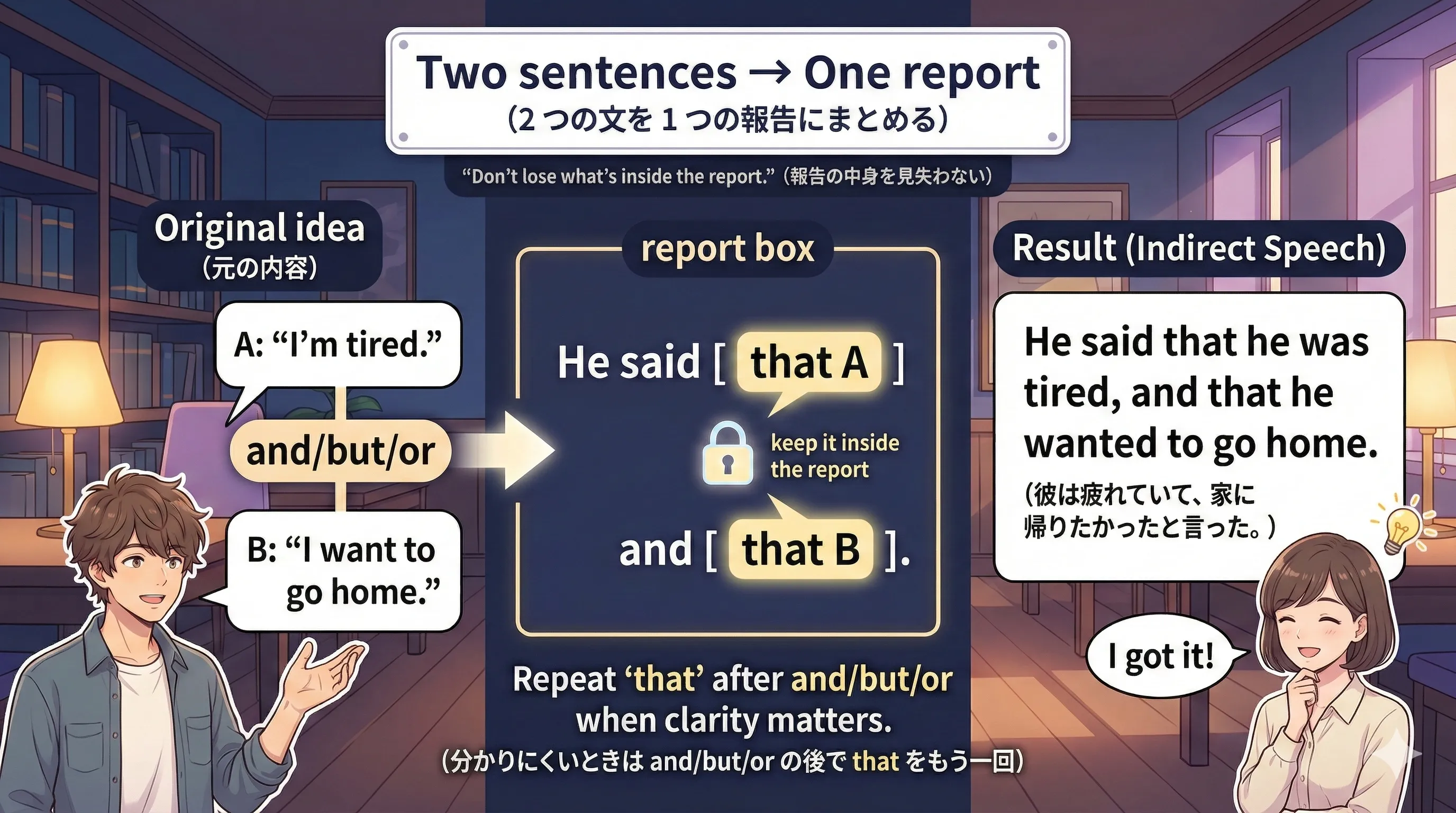
🚀 次はどちらから読む? 6-1 ~ 6-3 へのナビゲーション
ここから先は 6-1〜6-3 の3ルートに分かれます。
どれから読んでもOKですが、迷ったら 6-1 → 6-2 → 6-3 がスムーズです😊
※「接続詞(せつぞくし)」=文と文をつなぐ言葉(and / but / or など)
He said that he was tired, and that he wanted to go home.
(彼は疲れていて、家に帰りたかったと言った。)
and の後ろで that をもう一回置く」感じだけ先にチラ見せです👀
人は「完璧に分かってから始める」よりも、 「だいたい分かった状態でまず動いてみる」ほうが、記憶に残りやすく続きやすいです。
そして――ここまで読めたあなたは、もう準備はバッチリです✨ 気になるカードからサクッと進みましょう😊
6-1. 一般的な重文(and / but / or)
このセクションでは、
文が2つ以上つながる「重文」
(=主語+動詞のセットが複数ある文)を
間接話法(「〜と言った」を文の中に入れて伝える言い方)にするときの
that の置き方を整理します😊
目標:and / but / or の後ろで、
that を「置くべき場所」を迷わず選べるようにする。
特に大事なのは、
2つ目以降の節で
that が
省略しにくい理由(=読み手の迷子防止)です🧭
🧩
図でつかむ:and / but / or の後ろで that を「もう一回」置く
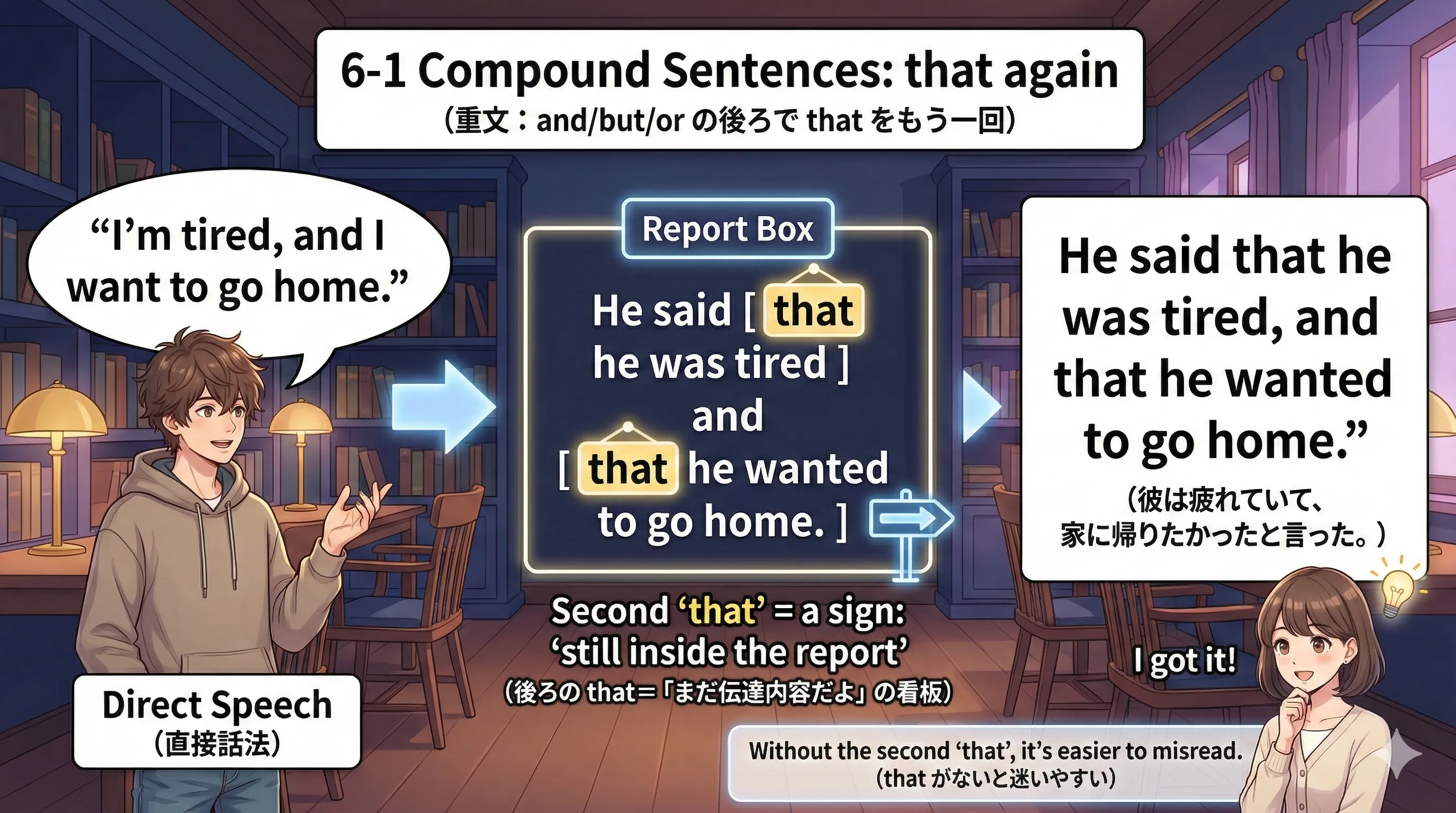
that で合図します。
2つ目以降の節ほど、この合図があると読みやすくなります✨
✅ 6-1-1. まず結論:and / but / or の後ろに that を置く(基本ルール)
重文を間接話法にするときは、
接続詞(and / but / or)の後ろに that を置く
のが基本です😊
※ 接続詞(せつぞくし)=文と文をつなぐ言葉(and / but / or など)
S said (that) S V, and/but/or that S V.💡 最初の
that は省略されることも多いけれど、
後ろの that は目印として置きやすいです。
He said, “It is not raining and I can go.” → He said (that) it was not raining and that he could go.
(彼は「雨が降っていないし、出かけられる」と言った。)※ and の後ろで that が合図✨
that を置きます。
She said to me, “I phoned you many times, but you didn’t answer at all.” → She told me (that) she had phoned me many times but that I hadn’t answered at all.
(彼女は「何度も電話したけれど、あなたは全然出なかった」と私に言った。)
but の後ろでも that を置くと、伝達の続きがクリアになります。
He said, “You can wait here, or you can come with me.” → He said (that) I could wait there, or that I could come with him.
(彼は「そこで待ってもいいし、私と一緒に来てもいい」と言った。)
or は選択肢が並ぶので、that があると区切りが見えやすいです😊
🧭 6-1-2. なぜ「後ろの that」は省略しにくいの?(読みやすさの目印)
最初の that は省略しても文脈で分かることが多いですが、
2つ目以降の節は “どこまでが伝達内容か” がブレやすいです。
そこで and / but / or の後ろに that を置くと、
「ここからも引用の中身だよ」
とハッキリ示せます😊
後ろの that = “伝達の看板(かんばん)”
看板があると、読み手は迷子になりません✨
✅ He said (that) he was tired and that he wanted to go home. (比較)He said (that) he was tired and he wanted to go home.
(彼は疲れていて、家に帰りたかったと言った。)※ that があると「言った内容」が続くのが一瞬で分かる
that があると、「2つ目も報告の中身」と読めます。
✅ She said (that) she understood, but that she couldn’t accept it. (比較)She said (that) she understood, but she couldn’t accept it.
(彼女は理解したけれど、それを受け入れられないと言った。)※ but の後ろは「話が切り替わる」ので that が効く
but は対比なので、後ろの節が「説明」っぽく見えることがあります。
だから that を置くと安全です😊
✅ He said (that) we could take a taxi, or that we could walk. (比較)He said (that) we could take a taxi, or we could walk.
(彼はタクシーでもいいし、歩いてもいいと言った。)※ 選択肢が2本あるとき、that が「2本目の合図」になる
「省略できる・できない」を暗記するより、 “読み手が迷うかどうか”で判断できるようになるのが強いです✨
⏳ 6-1-3. 節ごとに変わる:時制の一致(バックシフト)を整理
間接話法では、伝達動詞(said / told など)が過去のとき、
中身の動詞も 1つ過去にずらすことが多いです。
これを 時制の一致(=「時のそろえ方」)、
バックシフト(=「時制を後ろへずらす」)と呼びます。
重文は節が2つ以上あるので、節ごとに変化が起きます😊
| 🧩 直→間の変化 | ✅ 例(かんたん) | 💡 メモ |
|---|---|---|
🕰️
is / am / are → was / were
|
例:is → was
|
「今の話」を「その時の話」にする感じ |
🧠
can → could
|
例:can → could
|
可能・能力が1つ過去へ |
📅
will → would
|
例:will → would
|
未来の話を「過去から見た未来」へ |
✅
have/has + p.p. → had + p.p.
|
例:have finished → had finished
|
完了形(今までに〜した)が1つ過去へ |
「接続詞の前も後ろも、どっちも伝達内容」なので、 両方の節でバックシフトが起きる、と覚えるとスムーズです✨
He said, “It is safe and I can relax.” → He said (that) it was safe and that he could relax.
(彼は「安全だし、安心できる」と言った。)※ 2つの節どちらも過去へスライド
is→was / can→could をセットで確認!
She said, “I will call you, but I will be late.” → She said (that) she would call me, but that she would be late.
(彼女は「電話するけど、遅れる」と言った。)※ 未来→過去から見た未来(would)
but で話が切り替わっても、両方とも「言った内容」なのでバックシフトが起きます。
He said, “I have finished it and I have sent it.” → He said (that) he had finished it and that he had sent it.
(彼は「それを終えて、送った」と言った。)※ 完了形(今までに〜した)が1つ過去へ
🧍♂️🗺️ 6-1-4. 節ごとに整える:主語・代名詞・場所/時間語の変換
間接話法では、文の中身を「そのままコピペ」ではなく、
話す立場(だれ目線?)に合わせて調整します。
ここも重文だと節が2つ以上あるので、節ごとに整えるのが大事です😊
| 🧩 変換ポイント | ✅ 例 | 💡 やさしい説明 |
|---|---|---|
| 👤 代名詞(I / you / my) |
I→he/she / my→his/her
|
「だれが言ったか」に合わせて主語を入れ替える |
| 📍 場所(here) |
here→there
|
“ここ” は話し手の場所。報告では “そこ” になることが多い |
| 🕒 時間(now / today / tomorrow) |
now→then /
today→that day /
tomorrow→the next day
|
“今/今日/明日” を「その時/その日/次の日」に言い換える |
「だれが」「どこで」「いつ」を、報告文の目線に合わせるだけ。
迷ったら、“その場で説明できる言い方”に直すと自然です😊
He said, “I lost my key and I cannot enter.” → He said (that) he had lost his key and that he could not enter.
(彼は「鍵をなくして、入れない」と言った。)※ I/my を “彼目線” に入れ替え
She said, “I will stay here, but you should go.” → She said (that) she would stay there, but that I should go.
(彼女は「私はここにいるけど、あなたは行ったほうがいい」と言った。)※ 報告では here が there になりやすい
but で話が切り替わると、場所の目線もズレやすいので要チェック!
He said, “I am busy now, and I cannot meet you today.” → He said (that) he was busy then, and that he could not meet me that day.
(彼は「今忙しくて、今日は会えない」と言った。)※ now→then / today→that day
「時制」だけじゃなく、人・場所・時間まで整うと、 間接話法が一気に読みやすくなります✨
⚠️ 6-1-5. よくあるミス集:重文じゃない and/or の扱い/nor のコツ
ここでは、学習者がつまずきやすいポイントを
先回りしてまとめます😊
合言葉は
「節(主語+動詞)が2つあるか?」。
これで that を増やすべきかが見えます。
and / but / or の前後に「主語+動詞」があるなら重文っぽい!
そのときは
and/but/or + that が基本です。
🧩 名詞をつなぐ and に that を増やさない
and がつないでいるのが
名詞だけなら、
そもそも節が増えていません。
なので that は増やさず、普通に間接話法へ✨
He said, “I bought a pen and a notebook.” → He said (that) he had bought a pen and a notebook.
(彼は「ペンとノートを買った」と言った。)※ 節が増えていないので that は追加しない
🧭 or が節を2本つなぐなら that で区切る
or の後ろが
別の節(主語+動詞)なら、
or + that を置くと
「2本目の伝達内容」がハッキリ見えます😊
She said, “You can email me, or you can call me.” → She said (that) I could email her, or that I could call her.
(彼女は「メールしてもいいし、電話してもいい」と言った。)※ 2本目の節の合図に that
🧠 nor は「そのまま」より、言い換えると読みやすいことが多い
nor は堅い(=フォーマル)表現で、会話では少しレアです。
間接話法では
否定を2つ並べる形にするとスッキリすることが多いです😊
※ フォーマル=かたい言い方(書き言葉っぽい)
He said, “I don’t like coffee, nor do I like tea.” → He said (that) he didn’t like coffee and that he didn’t like tea either.
(彼は「コーヒーも好きじゃないし、紅茶も好きじゃない」と言った。)※ nor を “否定+否定” に整理
nor を無理に残さず、読みやすい形に整えるのも立派な戦略です✨
ルールを「全部暗記」しなくて大丈夫!
節(主語+動詞)が2つあるか?だけ確認できれば、 that を置くべき場所は見えてきます😊
✅ 6-1. まとめ:迷ったら「that は看板」思考でOK!
🧭 いちばん大事な結論
等位接続詞(and / but / or)で節が続くときは、
接続詞の後ろに that を置くのが基本。
後ろの that は
「ここからも伝達内容だよ」
という看板になります✨
🧱 型(テンプレ)
S said (that) S V, and/but/or that S V.
最初の that は省略されることも多いけれど、
後ろは残すと読みやすい😊
✅ チェックリスト
- 節が2つある?(主語+動詞が2セット?)
-
接続詞の後ろは
thatで目印を付けた? - 節ごとに 時制/代名詞/場所・時間 を整えた?
6-2 では
for / so の「残すパターン」へ。6-3 では命令文+
and/or を間接話法で整えるコツへ進みます😊
6-2. 接続詞が for / so のとき(残すパターン)
ここでは for / so を使って「理由→結果」をつなぐ重文を、
間接話法(だれかの言葉を「〜と言った」と報告する言い方)にするときのコツを整理します😊
ポイントは、
for / so は “つなぎ言葉としてそのまま残す”こと。
that は基本的に 文の先頭で1回 でOKです✨
for は少しかたい(=書き言葉っぽい)理由の言い方。
so は「だから」の結果のつなぎ。
まずは “読みやすい形” を作ることから始めましょう🧭
🧩
図でつかむ:for は「理由」、so は「結果」— どちらも “残す”
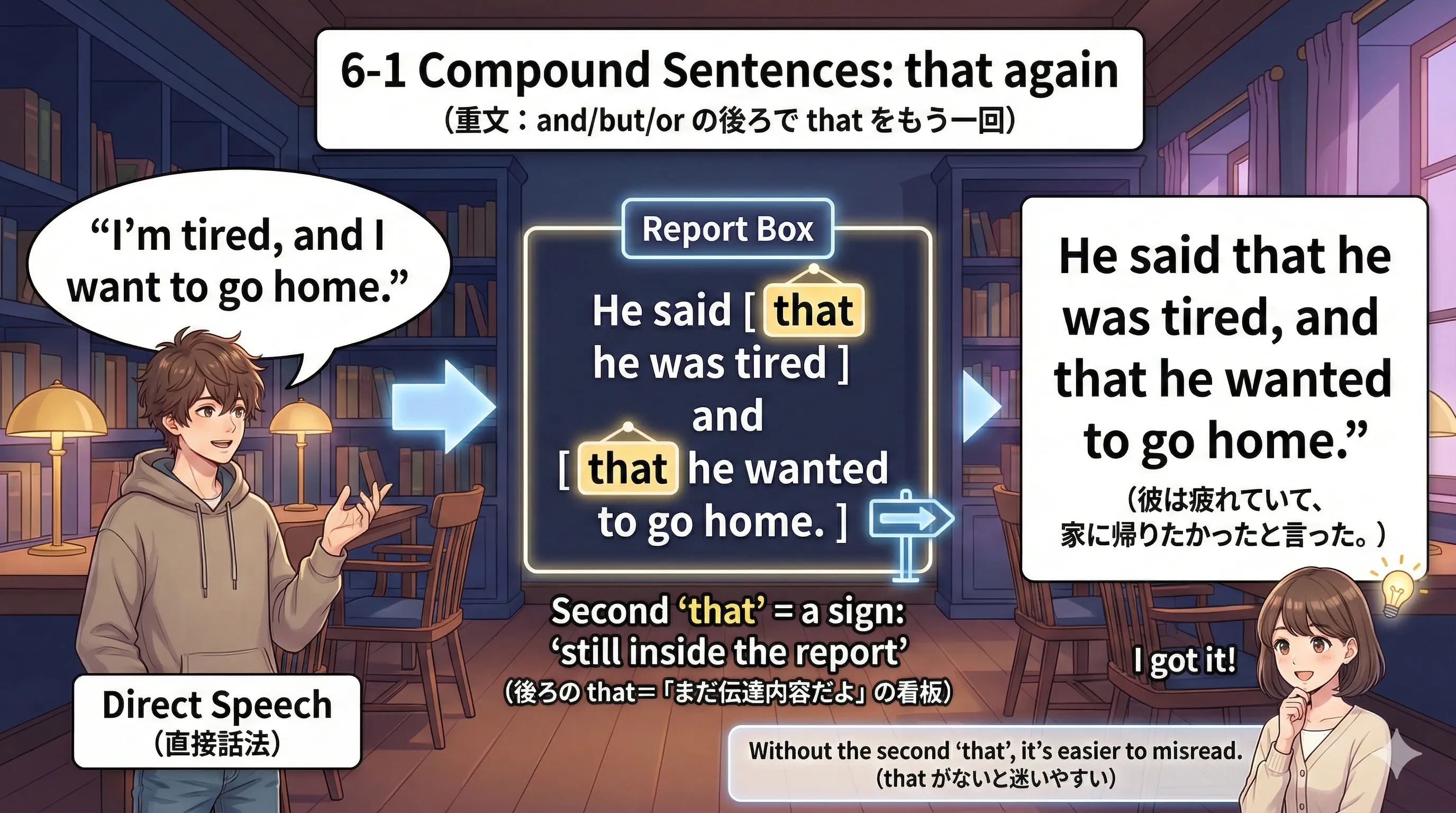
✅ 6-2-1. まず結論:for / so は“そのまま残す”+that は先頭でOK
for / so は、
文と文をつなぐ接続詞(せつぞくし)として働きます。
間接話法にするときは、
He said (that) ...
の形を作ってから、for / so をそのまま残すのが基本です😊
※ 接続詞=文と文をつなぐ言葉(ここでは for / so)
S said (that) S V, for S V.S said (that) S V, so S V.
and / but / or の話とセットで覚えると混乱しません😊)
「for=理由」と「so=結果」の流れを 消さずに残すと、読み手が一瞬で理解できます✨
He said, “I am hungry, so I will order pizza.” → He said (that) he was hungry, so he would order pizza.
(彼は「お腹がすいたから、ピザを頼む」と言った。)※ so を残すと因果が見えやすい
He said, “I cannot come, for I have to work.” → He said (that) he could not come, for he had to work.
(彼は「仕事があるので行けない」と言った。)※ for は理由を後から足す感じ
She said, “I have finished early, so I can help you.” → She said (that) she had finished early, so she could help me.
(彼女は「早く終わったから、手伝える」と言った。)※ so を残して、結果がスッと伝わる
said (that) を作ったら、あとは for / so を「そのまま」置くイメージ😊
🧠 6-2-2. for は「理由のあと出し」= because に近い(少しかたい)
for は「理由(=because に近い)」を表しますが、
会話よりも文章でよく見る “少しかたい”言い方です😊
イメージは
「言い切ってから、理由を足す」。
だから、間接話法でも for を消さずに残すと自然に読めます✨
for =(だって〜 / というのも〜 / なぜなら〜)理由をあとから付け足す感覚だと思うと掴みやすいです😊
“A と言った。というのも B だからだ。” みたいなイメージ✨
He said, “I did not call you, for I lost your number.” → He said (that) he had not called me, for he had lost my number.
(彼は「番号をなくしたので、電話しなかった」と言った。)※ “あとから理由” が読みやすい
They said, “We are staying home, for the weather is terrible.” → They said (that) they were staying home, for the weather was terrible.
(彼らは「天気がひどいので、家にいる」と言った。)※ “A。というのもB” の流れ
for の前後はどちらも伝達内容。だから時制の一致(are→were など)も起きます😊
She said, “I have decided to quit, for I have found a better job.” → She said (that) she had decided to quit, for she had found a better job.
(彼女は「もっと良い仕事が見つかったので、辞めることにした」と言った。)
for=理由のあと出しがイメージできればOK!
“かたい言い方だけど、仕組みはシンプル” です😊
🚦 6-2-3. so は「結果・結論」= therefore / so(だから)
so は「だから/その結果」という
結論(けつろん)へのつなぎです😊
かたい言い方だと therefore(=だから/それゆえ)に近いイメージ。
間接話法では、so を残すと
「原因→結果」の流れがそのまま見えます✨
S said (that) A, so B.✅ A が原因(前半)/B が結果(後半)という流れを保つのがポイントです。
He said, “I missed the train, so I’m taking a taxi.” → He said (that) he had missed the train, so he was taking a taxi.
(彼は「電車に乗り遅れたから、タクシーで行く」と言った。)※ 結果の流れがスッと読める
They said, “We have no money, so we can’t travel this year.” → They said (that) they had no money, so they couldn’t travel that year.
(彼らは「お金がないので、その年は旅行できない」と言った。)※ this year→that year もポイント
so の前後はどちらも伝達内容なので、時制の一致もきちんと起きます😊
She said, “I’m late, so I will take a taxi.” → She said (that) she was late, so she would take a taxi.
(彼女は「遅れているから、タクシーに乗る」と言った。)※ “結論へ進む” のが so
so は「だから」。間接話法でも残すと因果がはっきりします✨
⚠️ 6-2-4. よくあるミス:so that にしちゃう/for が前置詞の for
6-2 は「接続詞の for / so」の話です。
ここでよくある混同は2つ👇
① so(だから)を so that にしてしまう(意味が変わりやすい)
② for(接続詞=理由)と for(前置詞=〜のために)を混ぜてしまう
🚫 so は「結果」なのに、so that にすると別物になりやすい
so は「だから(結果)」ですが、
so that は「〜するために(目的)」っぽく聞こえやすいです。
6-2 では基本的に so をそのまま残すのが安全😊
He said, “I am busy, so I can’t go.” → He said (that) he was busy, so he couldn’t go.
(彼は「忙しいから行けない」と言った。)※ ここで so that にしない
🔍 for は「接続詞」と「前置詞」で役割が違う
6-2 の for は接続詞(=理由)。
でも for you のような for は前置詞(=〜のために)です。
見分け方はカンタンで、
for の後ろに “文(主語+動詞)” が来るなら接続詞です😊
She said, “I bought a gift for you, so I hope you like it.” → She said (that) she had bought a gift for me, so she hoped I would like it.
(彼女は「あなたのためにプレゼントを買ったから、気に入ってくれるとうれしい」と言った。)
※ for me は前置詞(〜のために)
for は「for の後ろに節が来る」形で登場します。
🌀 so(とても)+ so(だから)を見分けよう
He said, “I’m so tired, so I’m going home.” → He said (that) he was so tired, so he was going home.
(彼は「すごく疲れたから、帰る」と言った。)
※ 1個目の so=とても/2個目の so=だから
6-2 は “for / so を残す” セクション。
だから、むやみに
that を足したり、so that に変えたりしないでOKです😊
✅ 6-2. まとめ:that は先頭、for / so は残す!
🧭 いちばん大事な型
S said (that) A, for B.S said (that) A, so B.
✅ for は理由(少しかたい)/so は結果(だから)。
どちらも “つなぎ” として残すのがポイントです😊
✅ 3つのチェック
- that は先頭で1回でOK?
-
for/soを消していない? -
so thatに変えて意味をズラしていない?
📝 ミニ復習(例文3つ)
He said (that) he couldn’t join us, for he had to work.
(彼は「仕事があるので参加できない」と言った。)
She said (that) she had lost her phone, so she was using email.
(彼女は「スマホをなくしたから、メールを使っている」と言った。)
They said (that) they were late, so they would take a taxi.
(彼らは「遅れているから、タクシーに乗る」と言った。)
命令文+
and/or(「急げ、そうすれば…」)を
間接話法で整えるコツへ進みます😊
6-3. 命令文+and / or(「急げ、そうすれば…」)
ここでは、命令文(=「〜しなさい」と言う形)と
and/or がセットになった文を、
間接話法(「〜と言った」を文の中で報告する形)に変えるコツを学びます😊
合言葉は
命令 → to
+
後半=結果。
「急げ、そうすれば…」「気をつけろ、さもないと…」の型がスッと作れます✨
and は「そして」ではなく、
文脈によって 「そうすれば(良い結果)」 になりやすいのがポイント。
or は 「さもないと(悪い結果)」 の気持ちで読むと迷いません🧭
🧩
図でつかむ:命令→to/and・or の後半は「結果」のゾーン
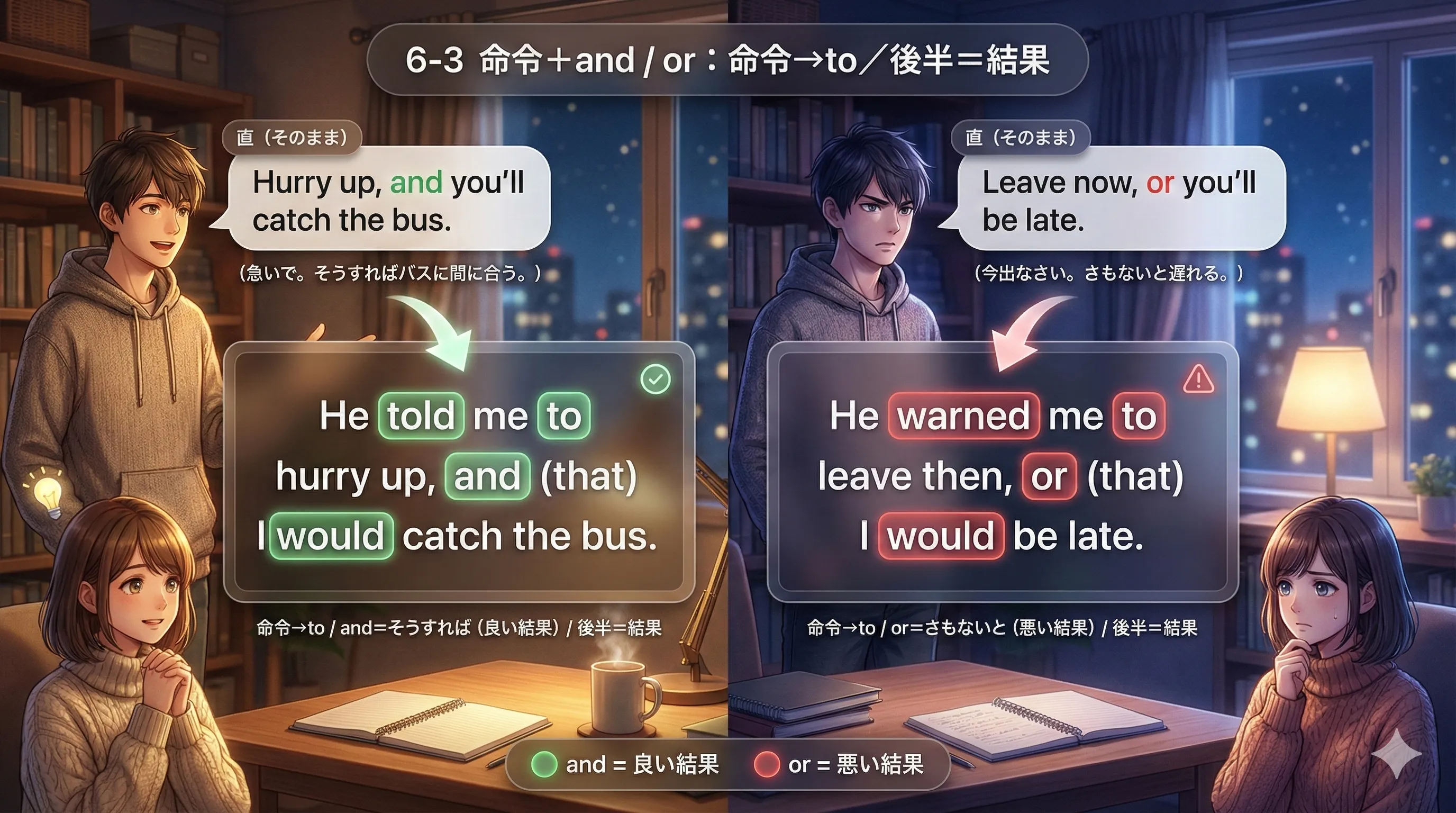
to + 動詞 に。
後半は 「そうなる(結果)」なので、時制も整えて報告します😊
✅ 6-3-1. まず結論:基本の「型」を先に覚える(命令→to / 後半は結果)
命令文があるときは、間接話法で
tell / ask / warn + 人 + to
の形にするのが基本です😊
後半は「結果」なので、will → would など
時制(=いつの話か)を整えてつなぎます。
S told + 人 + to V, and (that) S would V.
S warned + 人 + to V, or (that) S would V.
命令の部分は to で「〜するように」とまとめる。
後半は 結果の報告なので、普通の文として時制を整える✨
He said, “Hurry up, and you’ll catch the bus.” → He told me to hurry up, and (that) I would catch the bus.
(彼は「急げ。そうすればバスに間に合う」と私に言った。)
She said, “Leave now, or you’ll be late.” → She warned me to leave then, or I would be late.
(彼女は「今出なさい。さもないと遅れる」と私に注意した。)
now→then のように時間語(いつ?)も報告の目線に合わせます😊
He said, “Don’t touch it, or you’ll get hurt.” → He warned me not to touch it, or I would get hurt.
(彼は「触るな。さもないとケガをする」と警告した。)
「Don’t 〜」→ not to 〜(〜しないように)
🚀 6-3-2. and のコア:and は「そして」じゃなくて「そうすれば(結果)」になりやすい
命令文+and は、ただの「A そして B」ではなく、
「A しなさい。そうすれば B になる」
という “結果ルート” になりやすいです😊
だから間接話法でも and を残すと、
原因→結果がそのまま伝わります✨
and =(もし〜したら)に近い気持ち。and は “成功ルートの矢印” と覚えると迷いません🧭
He said, “Press this button, and the door will open.” → He told me to press that button, and the door would open.
(彼は「このボタンを押して。そうすればドアが開く」と言った。)
this→that(指示語)も“報告目線”に合わせています。
She said, “Call me, and I’ll help you.” → She told me to call her, and she would help me.
(彼女は「電話して。そうすれば手伝う」と言った。)
will→would のように時制を整えます😊
He said, “Take a break, and you’ll feel better.” → He advised me to take a break, and I would feel better.
(彼は「休憩しなよ。そうすれば気分がよくなる」と助言した。)
命令+
and を見たら、頭の中で
「そうすれば(結果)」に読み替えられたらOKです😊
⚠️ 6-3-3. or のコア:or は「選択」じゃなくて「さもないと(悪い結果)」になりやすい
命令文+or は、ふつうの「A か B」ではなく、
「A しなさい。さもないと B(悪いこと)になる」
という “警告ルート” になりやすいです😅
だから間接話法でも、後半は「結果の報告」として
will→would などを整えつつ、
or の雰囲気(=危ない未来の予告)を残します。
or = or else(さもないと)に近い気持ち。or は “危険ルートの矢印” と覚えると迷いません🧭
warn(警告する)/
tell(強く言う)/
advise(助言する)命令部分は to / not to にするのが基本です😊
He said, “Study hard, or you’ll fail the test.” → He warned me to study hard, or I would fail the test.
(彼は「一生懸命勉強しろ。さもないとテストに落ちる」と私に警告した。)
She said, “Wear a jacket, or you’ll catch a cold.” → She told me to wear a jacket, or I would catch a cold.
(彼女は「上着を着て。さもないと風邪をひくよ」と私に言った。)
He said, “Don’t be late, or the meeting will start without you.” → He warned me not to be late, or the meeting would start without me.
(彼は「遅れるな。さもないと会議は君抜きで始まる」と私に警告した。)
「Don’t 〜」→ not to 〜(〜しないように)
🧾 6-3-4. もう1パターン:命令+and/or+命令(指示が2つ並ぶだけのとき)
ここまでの and/or は「結果ルート」でしたが、
場合によっては 結果ではなく “指示が2つ並んでいるだけ”のことがあります😊
このときは、後半が「結果」ではないので、
to を2つの動詞にかけるイメージでまとめるとスッキリします。
S told + 人 + to V and (to) V.S told + 人 + to V or (to) V.
後半は「結果」?それとも「2つ目の指示」?
結果なら
would などが出やすい。指示なら
to が続くのが自然です✨
He said, “Turn off the lights and lock the door.” → He told me to turn off the lights and to lock the door.
(彼は「電気を消して、ドアに鍵をかけて」と私に言った。)※ 結果ではなく “指示が2つ”
She said, “Call me or send me an email.” → She told me to call her or to send her an email.
(彼女は「電話するか、メールして」と私に言った。)※ “結果” ではなく “選べる指示”
or は “さもないと” ではなく、文字通り「どっちでもOK」です😊
He said, “Take it or leave it.” → He told me to take it or leave it.
(彼は「受け入れるか、やめるかだ」と私に言った。)※ 2つの指示(選択)として並ぶ形
後半が「結果」なら would、後半が「指示」なら to。
これだけで 6-3 はほぼ勝ちです😊
⚡ 6-3-5. よくあるミス集(ここは短く刺さる形が◎)
6-3 は「命令→to」と「後半=結果 or 指示」の見分けさえできればOK😊
でも、ミスはだいたい 同じ場所で起きます。
ここで一気に潰しましょう💪
🚫 say me はNG → ✅ told me / said to me
He said me to hurry up.
He told me to hurry up.(または)
He said to me, “Hurry up.”
He told me to hurry up.
(彼は私に急ぐように言った。)
🧩 命令文はそのまま残さない → ✅ to で包む
He told me hurry up.
He told me to hurry up.
He told me to hurry up.
(彼は私に急ぐように言った。)※ 命令は to へ
🚫 “Don’t 〜” → ✅ not to 〜
He warned me don’t touch it.
He warned me not to touch it.
He warned me not to touch it.
(彼はそれに触らないよう私に警告した。)
⏳ 後半が「結果」なら will → would を忘れない
He told me to hurry up, and I will catch the bus.
He told me to hurry up, and I would catch the bus.
He told me to hurry up, and I would catch the bus.
(彼は私に急ぐよう言い、そうすればバスに間に合うと言った。)※ 結果は would
命令 → to / not to と 後半が結果なら would。この2つでミスが激減します😊
✅ 6-3 まとめ:命令→to、後半は「結果」か「指示」かを見分けよう!
🧭 一番大事な結論
命令文が来たら、まず
to(〜するように)
に変換。
そのあと、後半が「結果」なら
would を意識します。
S told/warned + 人 + to V, and/or S would V.
✅ 見分けチェック(超シンプル)
-
後半は 結果(〜になる)? →
wouldが出やすい -
後半は 2つ目の指示? →
toが続くのが自然 - or(さもないと)は警告ルートになりやすい
📝 ミニ復習(例文3つ)
He told me to hurry up, and I would catch the bus.
(彼は私に急ぐよう言い、そうすればバスに間に合うと言った。)
She warned me to leave then, or I would be late.
(彼女は私にそのとき出るよう警告し、さもないと遅れると言った。)
He told me to turn off the lights and to lock the door.
(彼は私に電気を消してドアに鍵をかけるよう言った。)
6-3 は形が混ざりやすい分、「to にする → 後半が結果か指示か」だけで一気に整理できます😊
7. 複文の転換(従属節がある文)|まずは全体像
セクション7では、複文(=文が2つ以上くっついた形)を
間接話法にするコツをまとめます😊
カギは、接続詞(because / if / when / although など)を
基本はそのまま残しつつ、
節(文のかたまり)ごとに
時制や代名詞を「報告の形」へ整えることです✨
ここでは詳しい説明に入る前に、「まずはざっくりイメージをつかむ」ことを目標にしましょう。
むずかしい文法用語が出てきたら、
(かんたんな日本語の言いかえ)
をいっしょに添えます。たとえば
・従属節(主役の文にくっつく“おまけの文”)
・名詞節(「内容そのもの」が入る文のかたまり)
🧩 図でつかむ:接続詞は残して、節ごとに“報告モード”へ切り替える

🗺️ 次はどこから読む? 7-1 ~ 7-5 へのナビゲーション
7-1 ~ 7-5 は、どこから読んでもOKです😊
「自分がよく使う接続詞」や「苦手なタイプ」から入ると、最短で理解が進みます。
そして… ここまで読めたあなたは、もう準備はバッチリです✨
あとは “節を1つずつ” 整えるだけ!
例:If it rains, we will stay home. のような文も、
接続詞 if は残しつつ、全体を「彼は〜と言った」の形にまとめていきます😊
人は「完璧に分かってから始める」よりも、 「だいたい分かった状態でまず動いてみる」 方が、記憶に残りやすく学習が続きやすいと言われています😊
このセクションでは、まず “地図” を手に入れてから、7-1〜7-5で1つずつ深掘りしていきましょう!
7-1. まず全体像:従属節(おまけの文)もまとめて「報告」する
ここでは、複文(=文が2つ以上くっついた形)を
間接話法で扱うときの基本の道すじを作ります😊
ポイントは、接続詞(because / if / when など)を
基本はそのまま残し、
節(文のかたまり)の中身だけを「報告モード」に整えること✨
ここで“地図”ができると、7-2〜7-5の理解が一気にラクになります。
むずかしい用語はやさしく言い換えます:
・従属節(主役の文にくっつく“おまけの文”)
・節(主語+動詞がある文のかたまり)
🧩 図でつかむ:接続詞はそのまま、節の中身だけを“報告モード”へ

✅ 7-1-1. まず結論:接続詞は“残す”、直すのは節の中身だけ
複文の間接話法は、最初にこのルールを決めると一気にラクです😊
接続詞は基本そのまま残す(because, if, when など)。
そして、変えるのは節の中身(時制・代名詞・時間/場所語)だけ✨
接続詞は「どんな関係?」を示す標識です🚥
だから消さずに残して、内容だけ報告の形に直します。
複文でも、やることは結局 「節を1つずつ直す」だけです。ここまで読めたあなたは、もう準備はバッチリです😊
He said, “If it rains, we will stay home.” → He said (that) if it rained, they would stay home.
(彼は「雨が降ったら家にいる」と言った。)
if はそのまま。中身だけ rains→rained, will→would に整えています😊
She said, “I’m happy because you are here.” → She said (that) she was happy because I was there.
(彼女は「あなたがここにいるのでうれしい」と言った。)
because は残す。you→I, here→there のように目線を直します😊
He said, “I’ll call you when I get home.” → He said (that) he would call me when he got home.
(彼は「家に着いたら電話する」と言った。)
接続詞はそのまま、中身だけ整える。 これが複文の間接話法の土台です😊
🔎 7-1-2. 形をつかむ:主役(メイン節)と“おまけ”(従属節)を分けて見る
複文が苦手に感じる理由は、「文が長い」からではなく、
主役とおまけが混ざって見えるからです😊
まずは 接続詞(because, if, when など)に注目して、
そこから後ろを「おまけ(従属節)」として分けて見ましょう。
例:We stayed home because it rained.
主役=We stayed home(家にいた)
おまけ=because it rained(雨が降ったから)
He said, “I stayed home because I was sick.” → He said (that) he had stayed home because he had been sick.
(彼は「病気だったので家にいた」と言った。)
She said, “If you need help, I will come.” → She said (that) if I needed help, she would come.
(彼女は「助けが必要なら行く」と言った。)
They said, “We will start when everyone arrives.” → They said (that) they would start when everyone arrived.
(彼らは「全員が着いたら始める」と言った。)
接続詞を見つけて「前=主役/後ろ=おまけ」に分けられたら、 複文の間接話法はもう半分できたようなものです😊
⏳ 7-1-3. “節ごと”に直す:バックシフト(時制の一致)の優先順位
複文の間接話法でいちばん混乱しやすいのが、どこを過去にする?問題です😵💫
ここは「全部いっぺんに直す」より、節ごとに順番を決めるとラクになります😊
- まず He said (that) ... の枠を作る
- 次に 主役(メイン節)の動詞をバックシフト(1つ過去へ)
- 最後に おまけ(従属節)も同じ目線でそろえる
ただし、今も変わらない事実は現在形を残すこともあります(補足)😊
主役を直してから、おまけを直す。
いきなり全部を直そうとすると、目線がグチャっとなります😅
He said, “If I have time, I will visit you.” → He said (that) if he had time, he would visit me.
(彼は「時間があればあなたを訪ねる」と言った。)
will visit→would visit/おまけ:have→had(目線をそろえる)
She said, “I’m tired because I worked late.” → She said (that) she was tired because she had worked late.
(彼女は「遅くまで働いたので疲れている」と言った。)
had worked に寄せています😊
The teacher said, “If water reaches 100°C, it boils.” → The teacher said (that) if water reaches 100°C, it boils.
(先生は「水は100℃に達すると沸騰する」と言った。)
今も変わらない事実(科学・一般常識など)は、現在形のままでも自然です😊
👀 7-1-4. “節ごと”に整える:代名詞・時間/場所語の変換(目線チェンジ)
複文でよくあるミスは、主役だけ直して安心してしまうこと😅
でも実は、従属節(おまけ)にも I / you / here / today などが入ってきます。
ここは “目線チェンジ” の発想で、節ごとに同じルールで整えましょう😊
「誰の目線で話しているか」を、報告者の目線に切り替えるだけです😊
I / here / today は “話している本人の近く” の言葉。
報告では距離ができるので、there / that day などに変わりやすいです🧭
She said, “If you wait here, I’ll come back soon.” → She said (that) if I waited there, she would come back soon.
(彼女は「ここで待てば、すぐ戻る」と言った。)
you と here を忘れずに直すのがコツです😊
He said, “Because I’m busy today, I’ll do it tomorrow.” → He said (that) because he was busy that day, he would do it the next day.
(彼は「今日は忙しいので、明日やる」と言った。)
today が出るので、そこも “報告目線” に直します😊
She said, “If you like this song, I’ll send you these files.” → She said (that) if I liked that song, she would send me those files.
(彼女は「この曲が好きなら、これらのファイルを送る」と言った。)
目線チェンジは 主役だけじゃなく、おまけ(従属節)にも同じようにかかる と思えばOKです😊
⚠️ 7-1-5. よくある落とし穴:接続詞を消す/節の片方だけ直す/主語がズレる
7-1 のミスは、内容が難しいというより
“目線の切り替え忘れ”で起きがちです😅
ここは短く、でも刺さる形でつぶしておきましょう💪
🚫 接続詞を消すと、関係が消える
if/because/when は
「条件・理由・時」の標識🚥
消すと、文が “ただ並んだだけ” に見えてしまいます。
He said (that) it rained, they would stay home.
He said (that) if it rained, they would stay home.
He said that if it rained, they would stay home.
(彼は「雨が降ったら家にいる」と言った。)
🧩 主役だけ直して安心しない(おまけも直す)
「節ごとに直す」がキーワード。
主役だけ過去化して、
従属節が現在のままだと “目線が混ざる” ことがあります😵💫
He said (that) if it rains, they would stay home.
He said (that) if it rained, they would stay home.
He said that if it rained, they would stay home.
(彼は「雨が降ったら家にいる」と言った。)※ おまけ側(if節)も報告目線に
👀 主語・代名詞がズレると、誰の話か分からなくなる
報告では “話した人” と “聞いた人” の立場が変わります。
you → I のように、
従属節(おまけ)にも同じ変換がかかるのを忘れがちです😅
She said (that) because you were there, she was happy.
She said (that) because I was there, she was happy.
you は I になりやすい
She said that because I was there, she was happy.
(彼女は「私がそこにいたのでうれしかった」と言った。)
接続詞は残す/主役もおまけも直す/目線(主語)をそろえる。これだけで事故が激減します😊
✅ 7-1 まとめ:接続詞は残す。あとは“節ごと”に同じ作業をするだけ!
🧭 まず覚える3ステップ
- He said (that) ... の枠を作る
- 接続詞は残す(because / if / when など)
- 節ごとに整える(時制・代名詞・時間/場所)
✅ 迷ったらこのチェック
-
接続詞(
because,ifなど)は消してない? - 主役だけじゃなく、おまけ(従属節)も “報告目線” に直した?
-
I/you/hereなど、目線がズレてない?
📝 ミニ復習(例文3つ)
He said that if it rained, they would stay home.
(彼は「雨が降ったら家にいる」と言った。)
She said that she was happy because I was there.
(彼女は「私がそこにいたのでうれしかった」と言った。)
He said that he would call me when he got home.
(彼は「家に着いたら電話する」と言った。)
複文は「特別なルール」ではなく、節を1つずつ同じ手順で整えるだけです😊 次の 7-2〜7-5 で、接続詞タイプ別にさらにラクにしていきましょう!
7-2. 時・条件の従属節:when / before / after / if / unless の整理
このパートは、「〜したら/〜する前に/もし〜なら」などの
時・条件の文を、間接話法でスッキリ報告できるようにする練習です😊
キーワードは when / before / after / if / unless。
これらは道しるべ(関係を示す標識)なので、
基本は残すのがコツ✨
ここでは詳しい説明に入る前に、「まずはざっくり型と迷いポイント」を押さえましょう。
むずかしい用語はやさしく言い換えます:
・従属節(主役の文にくっつく“おまけの文”)
・条件(もし〜なら、という話)/時(〜したら・〜する前に、という話)
⏰ 図でつかむ:時・条件の接続詞は残して、未来の報告は「will → would」
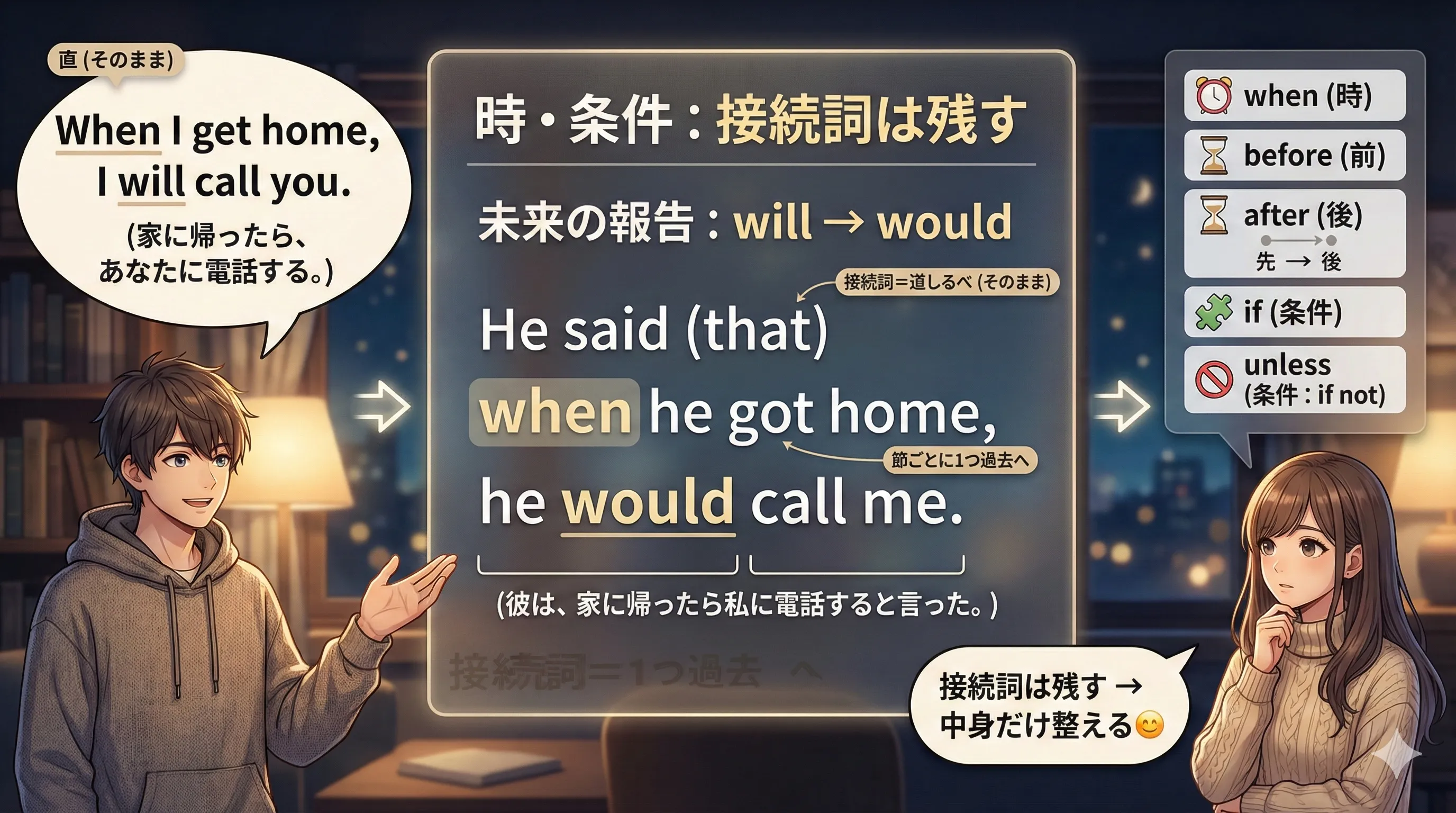
✅ 7-2-1. まず結論:接続詞は残す+未来の話は「will → would」が基本
時・条件の文が出てきたら、まずこれでOKです😊
接続詞(when/if/unless など)は残す。そして「未来の話」を過去の報告として言い直すなら、
will → would に寄せるのが基本✨
どの接続詞でも、考え方は同じ。
まず「関係(時/条件)」は残して、内容だけ報告モードに整えます😊
未来っぽい話が混ざっても、やることは 「will を would に寄せる」だけ。ここまで来たあなたは、もう準備バッチリです😊
He said, “I will call you when I get home.” → He said (that) he would call me when he got home.
(彼は「家に着いたら電話する」と言った。)
will call → would call。接続詞 when はそのまま😊
She said, “If you study hard, you will pass.” → She said (that) if I studied hard, I would pass.
(彼女は「一生懸命勉強すれば合格する」と言った。)
will は would に寄せます😊
He said, “Unless you hurry, you will miss the train.” → He said (that) unless I hurried, I would miss the train.
(彼は「急がないと電車に乗り遅れる」と言った。)
unless は if not(もし〜でなければ) に近い意味です😊
🧠 7-2-2. まず整理:従属節は“未来の意味でも”形が変わりやすい(迷いポイント)
ここが「ややこしい」と感じる理由はシンプルです😊
時・条件の従属節(when/before/after/if/unless)は、
未来の意味でも
直話の時点で形が少し特殊になりやすいからです(例:“〜したら”の節が現在形 など)。
- 直話:when I finish(未来の意味でも finish)
- 報告:when he finished(報告目線で1つ過去に寄る)
- 結論:「節ごとに報告目線へ」で全部解決します😊
「未来なのに現在形?」はルールとしてそうなることがあります。
間接話法では その“直話の形”を土台にして、節ごとにバックシフトすれば大丈夫です😊
He said, “When I finish, I will send it.” → He said (that) when he finished, he would send it.
(彼は「終わったら、それを送る」と言った。)
when I finish(未来の意味)。報告では finished に寄せます😊
She said, “After I get home, I will call you.” → She said (that) after she got home, she would call me.
(彼女は「家に帰ったら電話する」と言った。)
after I get home の get も、報告では got に寄せます😊
He said, “Before you leave, you will need to sign this.” → He said (that) before I left, I would need to sign that.
(彼は「出る前に、これにサインする必要がある」と言った。)
未来の意味でも、時・条件の従属節は “形がシンプル” になりやすいです。
報告では、その形を土台にして 節ごとに1つ過去へ整えましょう😊
⏰ 7-2-3. when:時の合図(〜したら)→ “起きるタイミング”を残して報告する
when は「その瞬間を合図にして、次が起きる」という
タイミングのスイッチです🔁
だから間接話法でも when は残す。
変えるのは節の中身(時制・代名詞など)だけです😊
✅ when節:合図(〜したら)
✅ 主節:そのあとに起きること(電話する/出発する など)
when は残す → 両方の節を「報告目線」に整える(
will → would など)😊
He said, “When I arrive, I will text you.” → He said (that) when he arrived, he would text me.
(彼は「着いたらメッセージする」と言った。)
arrive も、報告目線で arrived に寄せます😊
She said, “When you see him, tell him the truth.” → She said (that) when I saw him, I should tell him the truth.
(彼女は「彼に会ったら、本当のことを言って」と言った。)
should を使う形もよく出ます😊
(命令文の報告は 7-3 でも扱います)
They said, “We will start when everyone arrives.” → They said (that) they would start when everyone arrived.
(彼らは「全員が着いたら始める」と言った。)
when は残す。 あとは節の中身を「報告目線」にそろえればOKです😊
🔁 7-2-4. before / after:順番を見失わない(どっちが先?を図で)
before/after は意味自体は簡単でも、
間接話法になると どっちが先? が混ざりやすいです😵💫
ここは「図(タイムライン)」で固定すると一気にスッキリします😊
before you leave(出る前に)
after I get home(帰った後に)
before は「先にやること」を強調、after は「終わったあと」を強調。
接続詞は残し、節の中身だけ報告目線に整えます😊
He said, “Please finish it before you leave.” → He asked me to finish it before I left.
(彼は「出る前にそれを終えて」と私に頼んだ。)
She said, “After I get home, I will call you.” → She said (that) after she got home, she would call me.
(彼女は「家に帰ったら電話する」と言った。)
They said, “We will check it before we sign.” → They said (that) they would check it before they signed.
(彼らは「署名する前に確認する」と言った。)
before=先→後/after=先→後(“後に”がポイント)。
タイムラインで固定すると、報告の形でも迷いません😊
🧩 7-2-5. if / unless:条件の節(if not の言い換えも含めて整理)
if は「もし〜なら」の万能ルール、unless は「もし〜でなければ」(=
if not)です😊
間接話法では、どちらも 接続詞は残す。
そして条件節・主節を 節ごとに報告目線へ整えます✨
- unless は、だいたい if not に言い換えできる
- ただし、unless は1語でスッキリする(英語は好むことが多い)
- 間接話法はどちらでも同じ:条件節も主節も整える😊
条件節(if/unless)だけ現在のままにならないように注意!
「主役+おまけ」を セットで 報告目線にそろえます😊
She said, “If you help me, I will finish early.” → She said (that) if I helped her, she would finish early.
(彼女は「手伝ってくれたら早く終わる」と言った。)
you→I/主節:will→would 😊
He said, “Unless you hurry, you will miss the train.” → He said (that) unless I hurried, I would miss the train.
(彼は「急がないと電車に乗り遅れる」と言った。)
unless は if not に近い意味ですが、unless の方が短くて自然になりやすいです😊
She said, “If you don’t hurry, you will be late.” → She said (that) if I didn’t hurry, I would be late.
(彼女は「急がないと遅れる」と言った。)
unless でも if not でも、間接話法では
節ごとに報告目線へ整えるだけです😊
✅ 7-2 まとめ:時・条件は「道しるべ+節ごと整形」で勝てる!
🧭 7-2 の合言葉(3行で)
- 接続詞は残す(when / before / after / if / unless)
- 未来の報告は will → would が基本
- 主役もおまけも 節ごとに 報告目線へ(時制・代名詞・時間/場所語)
🧠 迷ったときのチェック
- 接続詞を消してない?(関係が見えなくなる)
- 条件節だけ現在のままになってない?
-
you/here/todayなど、目線がズレてない?
📝 ミニ復習(例文3つ)
He said that he would call me when he got home.
(彼は「家に着いたら電話する」と言った。)
She said that if I studied hard, I would pass.
(彼女は「一生懸命勉強すれば合格する」と言った。)
He asked me to finish it before I left.
(彼は「出る前にそれを終えて」と私に頼んだ。)
時・条件は “ルールが多い” よりも “見分けが大事” な分野です。
ここまで押さえたあなたは、7-3(理由)や 7-4(譲歩)にもスムーズに進めます😊
7-3. 理由の従属節:because / since / as(理由の言い方)
このパートは、「なぜそう言ったのか?」という
理由(わけ)を含む文を、
間接話法で自然に“報告”できるようにする練習です😊
キーワードは because / since / as。
これらは理由をつなぐ接続詞なので、
基本はそのまま残すのがコツ✨
ここでは詳しい比較に入る前に、「まずは型と使い分けの感覚」をつかみましょう。
むずかしい用語はやさしく言い換えます:
・従属節(主役の文にくっつく“おまけの文”)
・バックシフト(報告の目線に合わせて、動詞を1つ過去へ寄せる)
🧠 図でつかむ:理由の接続詞は残す(because / since / as)

✅ 7-3-1. まず結論:because / since / as は“残す”、直すのは節の中身だけ
7-3 の結論はこれです😊
because / since / as は消さない(理由が分からなくなるから)。
間接話法で直すのは、
節の中身だけ(時制・代名詞・時間/場所語)です✨
✅ 主役(メイン節)だけ直して満足しがちですが…
理由節(because節)にも同じ作業が必要です😊
「接続詞は残す」→「節ごとに整える」。これだけで事故が激減します😊
He said, “I can’t go because I’m sick.” → He said (that) he couldn’t go because he was sick.
(彼は「病気だから行けない」と言った。)
can’t→couldn’t/理由節:am→was(両方直す)😊
She said, “Since it’s raining, we will stay home.” → She said (that) since it was raining, they would stay home.
(彼女は「雨なので家にいる」と言った。)
since は「理由」でも使えます(ここでは “前提として” 置く感じ)😊
Tom said, “As I have a meeting, I will leave early.” → Tom said (that) as he had a meeting, he would leave early.
(トムは「会議があるので早く帰る」と言った。)
because / since / as は残す。 そして主役も理由節も 同じルールで整えるだけです😊
🔥 7-3-2. because:理由をハッキリ言う(いちばんストレート)
because は理由を いちばんハッキリ伝える言い方です😊
「理由を強調したい」「会話で分かりやすく言いたい」なら、
まず because を選べばOK✨
✅ because は「だから〜なんだよ」という説明感が強め。
しかも間接話法でも 接続詞はそのままだから扱いやすいです😊
理由節にも “目線チェンジ” が入ることが多いです。
I/you/here が理由節に出たら要注意👀
She said, “I’m staying home because it’s cold.” → She said (that) she was staying home because it was cold.
(彼女は「寒いから家にいる」と言った。)
am→was(主役も理由節も、報告目線へ)😊
He said, “I will call you because I need your help.” → He said (that) he would call me because he needed my help.
(彼は「助けが必要だから電話する」と言った。)
will call→would call/理由節:need→needed 😊
She said, “I’m happy because you are here.” → She said (that) she was happy because I was there.
(彼女は「あなたがここにいるからうれしい」と言った。)
because は理由をハッキリ言える最強カード。ただし理由節にも
I/you/here が出るので、そこも必ず整えると完璧です😊
🧾 7-3-3. since / as:理由を“前提”として添える(少しかため・前置き)
since / as も「理由」ですが、ニュアンスは
前提(前置き)っぽくなりやすいです😊
「理由を強く押す」というより、状況をサラッと説明してから本題へ行く感じ✨
語注:前提=「こういう状況だからね(…ということで)」という置き方。
-
since:少しかためでも自然(「〜なので、では」みたいな前置き) -
as:短くサラッと添える(文章寄りでスッキリ) -
理由を強調したいなら、まず
becauseが安心😊
since / as も接続詞は残す。
そして「主役だけ」じゃなく、理由節も同じルールで整えるのが間接話法の基本です😊
He said, “Since it’s late, I will go home.” → He said (that) since it was late, he would go home.
(彼は「遅いので帰る」と言った。)
will は would に寄せます😊
She said, “As I don’t know him well, I can’t judge.” → She said (that) as she didn’t know him well, she couldn’t judge.
(彼女は「よく知らないので判断できない」と言った。)
as は「理由」でも使えます(ここでは前置き)。ただし別の意味(〜として)もあるので 7-3-5 で注意します😊
They said, “Since we have no time, we will skip lunch.” → They said (that) since they had no time, they would skip lunch.
(彼らは「時間がないので昼食を抜く」と言った。)
since/as は「前提として理由を添える」感じ。でも間接話法の操作は同じで、接続詞は残して節の中身だけ整えるだけです😊
🛠️ 7-3-4. 節ごとに整える:バックシフト+代名詞+時間語(理由節にも同じ)
ここは「やり方の型」です😊
理由節(because/since/as の中)にも、I/you/today/here が入ります。
だから 主役だけ直して終わりだと、
理由節が“直話のまま”になって 目線がズレるんです👀
🧩 3点セット(どの節にも同じ)
am/is → waswill → would
I / you / we→ 報告者の立場に合わせて変更
today → that dayhere → there
主役(メイン節)も、理由節も、この3点セットで整えるだけです😊
She said, “I’m happy because you are here.” → She said (that) she was happy because I was there.
(彼女は「あなたがここにいるからうれしい」と言った。)
you→I、here→there がポイント👀
He said, “Since I’m busy today, I will do it tomorrow.” → He said (that) since he was busy that day, he would do it the next day.
(彼は「今日は忙しいので、明日それをする」と言った。)
today→that day/主節:tomorrow→the next day 😊
She said, “I was upset because you didn’t call me yesterday.” → She said (that) she had been upset because I hadn’t called her the day before.
(彼女は「あなたが昨日電話しなかったので腹が立った」と言った。)
どの接続詞でも同じ。主役も理由節も「時制・代名詞・時間語」を整えると、読みやすい報告文になります😊
⚠️ 7-3-5. よくあるミス:because of / since(以来)/ as(〜として)に引っぱられる
ここは見た目が似てる別物が混ざるポイントです😵💫
「理由の because / since / as」だと思って処理すると、
変換がズレたり、意味が変わったりします。
まずは “何の品詞(形)?” をチェックしましょう✅
🧭 3つの“ひっかけ”早見表
because vs because of
because + 文because of + 名詞
since(理由) vs since(以来)
以来:since + 年/時点
as(理由) vs as(〜として)
〜として:as + 名詞
後ろが「文」か「名詞」かを見るだけで、かなり判定できます😊
He said, “I stayed home because of the rain.” → He said (that) he had stayed home because of the rain.
(彼は「雨のため家にいた」と言った。)
because of の後ろは 名詞(the rain)。
ここは「理由の節」ではなく「理由の名詞句」です😊
She said, “I have lived here since 2010.” → She said (that) she had lived there since 2010.
(彼女は「2010年からここに住んでいる」と言った。)
これは理由ではなく「いつから(以来)」の
since です。だから “理由としての since” と同じ扱いにしないのがポイント😊
He said, “As your manager, I must tell you this.” → He said (that) as my manager, he had to tell me that.
(彼は「君の上司として、これを言わねばならない」と言った。)
as + 名詞(as my manager)です😊
✅ 7-3 まとめ:理由の報告は「道しるべ+節の中身」
🧭 合言葉(3つ)
- because / since / as は残す(理由の道しるべ)
- 主役だけじゃなく、理由節も同じルールで整える
- 迷ったら「後ろが文?名詞?」で判定😊
🧠 事故防止チェック
-
理由節の
I/you/here/todayを直し忘れてない? -
since 2010など「以来」を理由だと勘違いしてない? -
as + 名詞(〜として)を「理由」扱いしてない?
📝 ミニ復習(例文3つ)
He said that he couldn't go because he was sick.
(彼は「病気だから行けない」と言った。)
She said that since it was raining, they would stay home.
(彼女は「雨なので家にいる」と言った。)
Tom said that as he had a meeting, he would leave early.
(トムは「会議があるので早く帰る」と言った。)
理由の節を扱えるようになると、「説明がある報告文」が一気に自然になります。
次の 7-4(譲歩:although/though/even if)でも、同じ “節ごと整える” が効いてきます😊
7-4. 譲歩の従属節:although / though / even if(逆風でも…)
このパートは、「じゃま(逆風)があるのに、それでも…」という
逆風(でも)の気持ちを、
間接話法で自然に“報告”できるようにする練習です😊
キーワードは although / though / even if。
これらは「でも」を表す接続詞なので、
基本はそのまま残すのがコツ✨
ここでは詳しい違いに入る前に、「逆風マークを消さない」ことを最優先にしましょう。
むずかしい用語はやさしく言い換えます:
・譲歩(じゃまがあっても、それでもやる)
・従属節(主役の文にくっつく“おまけの文”)
🌪️ 図でつかむ:逆風(でも)を残す(although / though / even if)
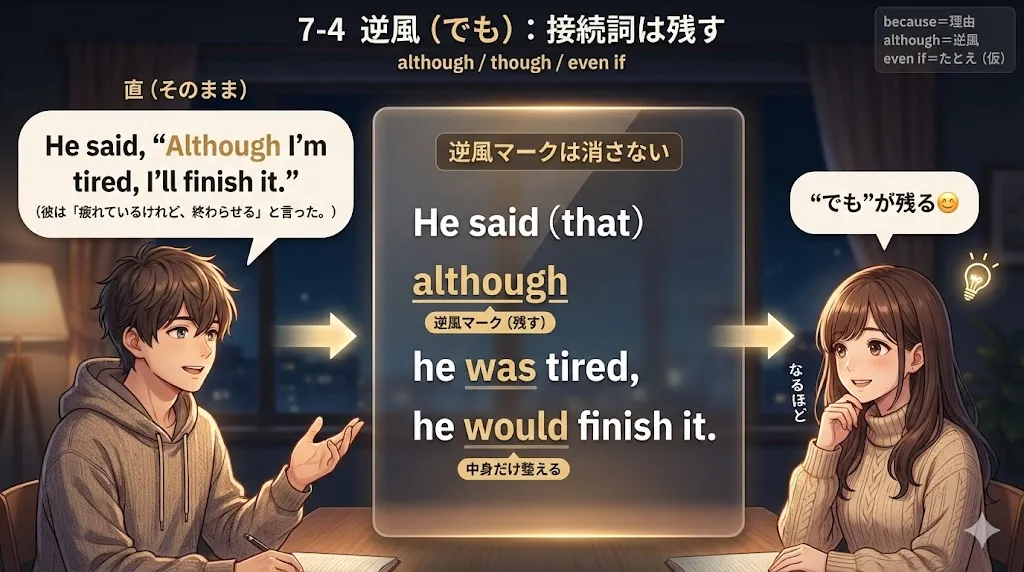
これを消すと「でも」が消えて意味が弱くなるので、残して、 時制や代名詞など 節の中身だけを整えます😊
✅ 7-4-1. まず結論:接続詞は“残す”+逆風(でも)を残して報告する
7-4 の結論はシンプルです😊
although / though / even if は消さない(“でも”が消えるから)。
間接話法で直すのは、
節の中身だけ(時制・代名詞・時間/場所語)です✨
✅ 「逆風(でも)」は文の意味を決める大事なパーツ。
主役だけ直して、逆風の節を直し忘れると、
“報告の目線”がズレて読みにくいので注意です👀
「逆風マークを残す」→「節ごとに整える」。これで意味がブレません😊
He said, “Although I’m tired, I will finish it.” → He said (that) although he was tired, he would finish it.
(彼は「疲れているけれど、終わらせる」と言った。)
She said, “Though it’s expensive, I want it.” → She said (that) though it was expensive, she wanted it.
(彼女は「高いけど欲しい」と言った。)
though は会話寄りで軽い「〜だけどね」感も出ます(詳しくは 7-4-3 で)😊
Tom said, “Even if it rains, we will go.” → Tom said (that) even if it rained, they would go.
(トムは「たとえ雨が降っても行く」と言った。)
逆風マーク(although/though/even if)を残して、節の中身だけ整えればOK😊
📌 7-4-2. although:かために「〜だけれども」
although は「〜だけれども」を
きちんと文章っぽく言える表現です📄✨
会話でも使えますが、ややかためで、
「説明のある報告文」や「文章」で見かけやすいタイプです😊
✅ 逆風(although節)を前に出して、状況→結論の順で伝えると読みやすいです😊
although があるのに but を足さない(二重に“でも”になってしまう)
※この注意は 7-4-5 でもまとめます😊
She said, “Although I don’t like it, I will do it.” → She said (that) although she didn’t like it, she would do it.
(彼女は「好きじゃないけど、やる」と言った。)
He said, “Although I’m busy today, I can meet you.” → He said (that) although he was busy that day, he could meet me.
(彼は「今日は忙しいけど会える」と言った。)
today があると、そこも報告用に変わります😊
They said, “Although we tried hard, we failed.” → They said (that) although they had tried hard, they had failed.
(彼らは「一生懸命やったけど失敗した」と言った。)
although は「文章っぽくきちんと逆風」を出せる表現。接続詞は残して、節の中身だけ報告目線に整えればOKです😊
🗣️ 7-4-3. though:会話寄りで「〜だけどね」/文末 though も注意
though は、会話っぽい軽さがある「〜だけどね」です😊
さらに、though は
文末に置けるのも特徴(「…だけどね。」のニュアンス)✨
語注:文末 = 文のいちばん最後。会話では「一言そえる」感じで使われます。
🧩 though の2つの形(どっちもOK)
Though + S V, S V.
S V, though.
文末 though は「主役の文を言ってから、でもね」と添える感じ。
間接話法でも though は残して、節の中身だけ整えます😊
He said, “Though I’m nervous, I’ll try.” → He said (that) though he was nervous, he would try.
(彼は「緊張してるけど、やってみる」と言った。)
She said, “I don’t like it, though.” → She said (that) she didn’t like it, though.
(彼女は「でも、それ好きじゃない」と言った。)
文末 though は「でもね」くらいの軽さ。
間接話法でも、その軽さごと残せます😊
They said, “We will go, though it’s late.” → They said (that) they would go, though it was late.
(彼らは「遅いけど行く」と言った。)
will→would/is→was。逆風は位置が変わっても残します😊
🌧️ 7-4-4. even if:仮の逆風(本当かどうか不明)=「たとえ〜でも」
even if は「もし本当にそうだとしても」という
仮の逆風を置く表現です😊
つまり「起きるかどうか分からないけど、起きたとしても…」という気持ち。
語注:仮=まだ本当か決まってない想像。天気や失敗など、未来の不確実な話でよく使います。
🔍 ここだけは区別(超重要)
起きるかは不明(想像)
すでに事実(確定)
未来の不確実なら
even if。すでに起きた事実なら
even though(7-4-5 でも復習)😊
He said, “Even if I fail, I will try again.” → He said (that) even if he failed, he would try again.
(彼は「たとえ失敗しても、もう一度やる」と言った。)
even if が自然😊
She said, “Even if it snows, I will come.” → She said (that) even if it snowed, she would come.
(彼女は「たとえ雪でも来る」と言った。)
even if(仮の逆風)😊
They said, “Even if it’s not perfect, we will ship it.” → They said (that) even if it wasn’t perfect, they would ship it.
(彼らは「完璧でなくても出荷する」と言った。)
even if は「起きるか不明だけど、起きても…」の 仮の逆風。間接話法では even if を残して、節の中身(時制・代名詞など)を整えるだけです😊
⚠️ 7-4-5. よくあるミス:even though と混同/but を足す/逆風が消える
7-4 は、意味が強いぶん ミスが目立ちやすいところです😵💫
とくに even if と even though の混同や、
although/though の後に but を足してしまう事故が多発します。
ここで「やりがち3点セット」をまとめて潰しましょう🛡️
🧯 ミス3点セット(ここだけでOK)
though 事実(確定)
Although ... の中にbut を入れると「でもでも」😵
though を取ると「逆風(でも)」が見えなくなる👀
「逆風マークは残す」+「if は仮、though は事実」😊
She said, “Even though it was raining, I went out.” → She said (that) even though it was raining, she had gone out.
(彼女は「雨だったのに出かけた」と言った。)
even though が自然😊even if にすると「雨かどうか分からない」ニュアンスになりズレます。
× He said, “Although I’m tired, but I will go.” → He said (that) although he was tired, he would go.
(彼は「疲れているけど行く」と言った。)
although/though があるなら but は基本いらない(“でも”が二重になります)😊
They said, “Though we’re busy, we will help you.” → They said (that) though they were busy, they would help me.
(彼らは「忙しいけど助ける」と言った。)
though を消すと「忙しいのに助ける」という
えらさ(逆風でも)が見えにくくなります😊
✅ 7-4 まとめ:逆風(でも)を残すと、意味がブレない
🧭 合言葉(3つ)
- although / though / even if は残す(逆風マーク)
- 主役だけでなく、逆風の節も時制・代名詞を整える
- if=仮(未確定) / though=事実(確定) を忘れない😊
🧠 事故防止チェック
-
although/thoughがあるのにbutを入れてない? -
even if(仮)をeven though(事実)にしてない? - 逆風マークを消して、意味を弱くしてない?
📝 ミニ復習(例文3つ)
He said that although he was tired, he would finish it.
(彼は「疲れているけれど終わらせる」と言った。)
She said that though it was expensive, she wanted it.
(彼女は「高いけど欲しい」と言った。)
Tom said that even if it rained, they would go.
(トムは「たとえ雨が降っても行く」と言った。)
「逆風(でも)」を残して報告できる人は、英文が一気に“大人っぽく”読みやすくなります😊
次の 7-5(名詞節:think/know/hope + that節・wh節)でも、この「節ごと整える」が効いてきます✨
8. 種類の違う文の転換(平叙文+疑問文など)
このセクションは、「言い切り(平叙文)」と
「質問(疑問文)」や
「お願い(命令文)」が
1つの発言に混ざっているときの、間接話法のまとめ方を扱います😊
キーワードは said (that) / asked if(whether) / asked + wh- / told/asked + to。
それぞれが得意な役割(言い方の道具)を持っているイメージです✨
ここでは詳しい作り方に入る前に、「どの道具を選ぶ?」をざっくりつかむことが目標です。
むずかしい用語はやさしく言い換えます:
・報告動詞(「言った/聞いた/頼んだ」を表す動詞)
・倒置(語順をひっくり返すこと。間接疑問では基本しません)
🧰 図でつかむ:文の種類ごとに“言い方の道具”を切り替える
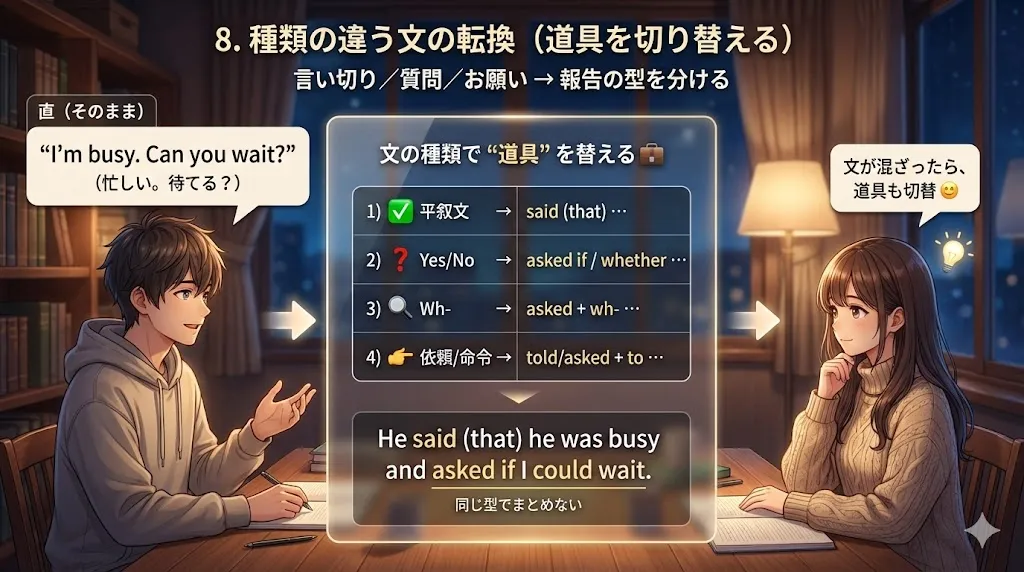
「言い切り」「質問」「お願い」で、報告の道具を切り替えると読みやすくなります😊
🧭 次はどこから読む? 8-1 ~ 8-5 へのナビゲーション
8-1 から順番に読むのがおすすめですが、気になるところから読んでも大丈夫です😊
「今まさに困ってる形」から入ると、理解がグッと早くなります。
-
平叙文 →
said (that) ...(「〜だ」と言った) -
Yes/No疑問文 →
asked if/whether ...(「〜かどうか」) -
Wh疑問文 →
asked + wh-(what/where/whyなど) -
命令文(依頼) →
told/asked + to ...(「〜するように言った」)
He said, “I’m busy. Can you wait?” → He said (that) he was busy and asked if I could wait.
(彼は「忙しい。待てる?」と言った。)
said (that) /「質問」→ asked if。文の種類が違うから、道具も切り替える😊
人は「完璧に分かってから始める」よりも、 「だいたい分かった状態でまず動いてみる」 方が、記憶に残りやすく学習が続きやすいと言われます😊
あとは 8-1〜8-5 で「型」を少しずつ増やすだけ。混ざった文も怖くなくなります✨
8-1. まず結論:文の種類が違うなら“報告動詞”も分ける(型を先に)
間接話法(だれかの言葉を「〜と言った」と報告する形)で、
平叙文・疑問文・命令文が混ざるときは、
文の種類ごとに動詞(道具)を持ち替えるのがコツ😊
たとえば said (that)(言い切り)/asked if/whether(Yes/No質問)/asked + wh-(Wh質問)/told/asked + to(お願い・指示)を、
ムリに同じ形にしないのがポイントです。
ここでは詳しい説明に入る前に、「まずは型を見て、全体の地図を作る」ことを目標にしましょう。
むずかしい用語が出てきたら、 (小学生向け:言い切り=言葉を言い切る/疑問文=質問/命令文=お願い・指示) のように、やさしい言いかえも一緒に添えます😊
間接話法 混合(文の種類が違う) Lesson 114 / Section 8-1🧰 図でつかむ:「文の種類」→「使う道具(報告動詞)」
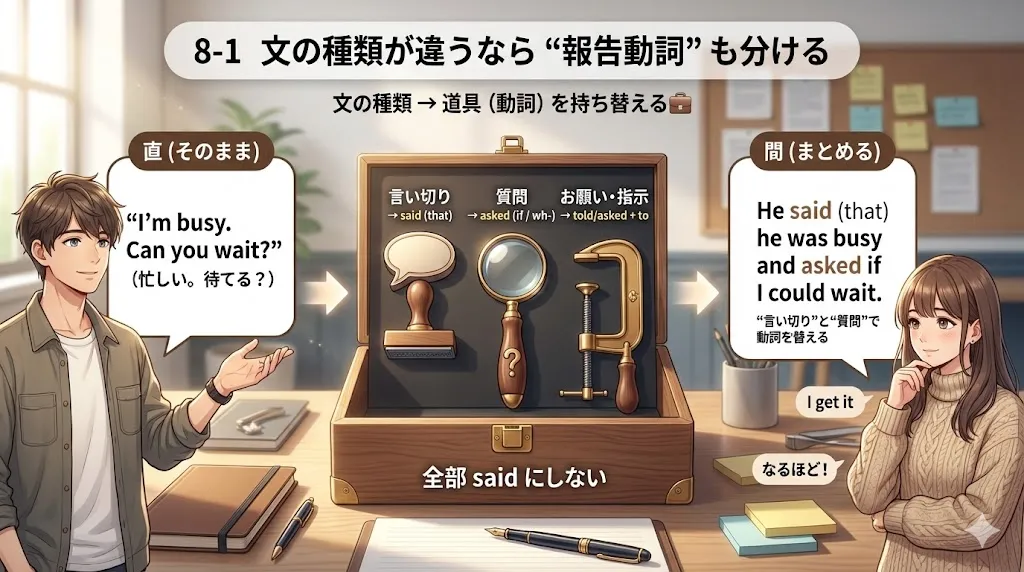
「文の種類が変わったら、道具(動詞)も変える!」😊
🧭 8-1-1. まず結論:文の種類 → 報告動詞を切り替える(3つの道具)
混ざった発言をキレイにまとめるコツは、「文の種類で動詞を切り替える」こと。
小学生向けに言うと「言い方の道具を持ち替える」です😊
🧩 3つの道具(まずこれだけ!)
| 文の種類 | 使う報告動詞(道具) | イメージ(やさしい言い換え) |
|---|---|---|
| 平叙文(言い切り) |
said (that) ...told + 人 + (that) ...
|
「〜だ」と言った |
| 疑問文(質問) |
asked if/whether ...asked + wh- ...
|
「〜かどうか」を聞いた/「何・どこ…」を聞いた |
| 命令文(お願い・指示) |
told/asked + 人 + to ...told/asked + 人 + not to ...
|
「〜して」と言った(頼んだ/指示した) |
「全部
said でまとめよう」とすると、質問・依頼の形が崩れやすいです。まずは said / asked / told(asked) to の3本でOK😊
💬 ミニ例で感覚をつかもう(混ざった発言の“整え方”)
He said, “I’m busy. Can you wait?” → He said (that) he was busy and asked if I could wait.
(彼は「忙しい。待てる?」と言った。)
🔎 コツ:言い切りは said、質問は asked if に持ち替え!
She said, “Where are you now? I’ll call you.” → She asked where I was then and said (that) she would call me.
(彼女は「今どこ?電話するよ」と言った。)
✅ Wh疑問は asked + wh-。疑問形の語順にしないのが大事!
He said to me, “Open the window. Is it hot?” → He told me to open the window and asked if it was hot.
(彼は私に「窓を開けて。暑い?」と言った。)
🧠 命令は to に変換(「〜するように」)。質問は asked if。
🗣️ 8-1-2. 平叙文(言い切り)= said / told(that の基本もここで)
平叙文(言い切りの文)は、
said (that) か
told + 人 + (that) が基本です😊
違いはシンプル:told は 相手(人)を置くのがルール。
例:She told me ... はOK / She told ...(相手なし)は基本NG
📌 まず覚える型(ここだけでOK)
S + said (that) + S + Vthat は省略されやすい
S + told + 人 + (that) + S + V人がないと不自然
that は「これから内容(中身)が来ますよ」の目印。入口の8-1では、まず 型を崩さないことを優先しましょう😊
💬 例文で確認(said / told)
He said, “I like this job.” → He said (that) he liked that job.
(彼は「その仕事が好きだ」と言った。)
🔎 said は相手なしでも自然。that は( )でOK。
She said to me, “I don’t know him.” → She told me (that) she didn’t know him.
(彼女は私に「彼を知らない」と言った。)
✅ told は “誰に” が基本セット(相手が必要)。
They said, “We will start soon.” → They said (that) they would start soon.
(彼らは「もうすぐ始める」と言った。)
🌟 まずは「said (that) の形」を崩さず言えるようにしましょう。
「平叙文=said/told」が固まると、次の 8-2〜8-5 が一気にラクになります😊
❓ 8-1-3. 疑問文(質問)= asked / wondered(if/whether・wh を選ぶ)
質問は that ではつながりません(内容のつながり方が違うため)😊
代わりに、質問の種類で つなぎ方(選び方)を変えます。
・asked=「聞いた」
・wondered=「〜かなと思った」(ひとりごと寄り/やわらかい)
🧭 まずはこの分岐だけ!if / whether / wh
→
asked if ...if = 〜かどうか
→
asked whether ...whether = 〜かどうか
→
asked where ... などwh語をそのまま使う
つまり、主語 → 動詞 の「ふつうの語順」でOK。
(倒置=語順をひっくり返すこと。ここでは基本しない)
💬 例文で確認(3パターン)
He said, “Are you ready?” → He asked if I was ready.
(彼は「準備できた?」と尋ねた。)
✅ if は「〜かどうか」。I was の語順でOK(疑問形にしない)。
She said, “Do you want tea?” → She asked whether I wanted tea.
(彼女は「紅茶がほしい?」と尋ねた。)
💡 whether は少しかため。「〜かどうか」を丁寧に言う感じです😊
He said, “Where do you live?” → He asked where I lived.
(彼は「どこに住んでるの?」と尋ねた。)
He wondered where I lived.(彼は私がどこに住んでいるのか不思議に思った/気になっていた。)
🫱 8-1-4. 命令文(お願い・指示)= told / asked + to(not to も)
命令文(「〜して」「〜しないで」)は、
that 節にしません😊
代わりに to を使って
「〜するように」と形を整えます(小学生向けに言うと「やることを“to”で包む」感じ)。
🧱 まず覚える型(肯定・否定)
S + told + 人 + to + 動詞S + asked + 人 + to + 動詞
asked 依頼・丁寧寄り
S + told/asked + 人 + not to + 動詞not to = 〜しないように
told/asked は “誰に(人)” が必要です😊
(例:He told me to ... / She asked him to ...)
💬 例文で確認(肯定・依頼・否定)
He said to me, “Close the door.” → He told me to close the door.
(彼は私に「ドアを閉めて」と言った。)
✅ 命令文は to に変換して「〜するように」。
She said to him, “Please wait here.” → She asked him to wait there.
(彼女は彼に「ここで待ってください」と頼んだ。)
🌿 please があるときは asked が自然になりやすいです。
The teacher said, “Don’t talk.” → The teacher told us not to talk.
(先生は私たちに「しゃべらないで」と言った。)
⚠️ not の位置に注意:not to + 動詞 で1セットです。
質問は asked / 命令は to が固まると、8-2〜8-5がスラスラ進みます😊
🧩 8-1-5. “混ざる”ときの型:A said that… and asked if… / told to…(並べ方)
1つの発言に「言い切り・質問・お願い」が混ざるときは、
文の種類ごとに“報告動詞”を切り替えて並べるのがコツです😊
小学生向けに言うと「パーツごとに道具を持ち替えて、順番に並べる」イメージです。
🧠 まずはこの3テンプレだけ!
said (that) ...and asked if/whether ...
asked wh/if ...and said (that) ...
told/asked + 人 + to ...and asked if / and said (that) ...
つなぎはだいたい
and でOK。
でも 動詞(said/asked/told)を同じにしないのがポイントです😊
💬 例文で「並べ方」を体に入れよう(3つ)
He said, “I’m leaving now. Are you coming?” → He said (that) he was leaving then and asked if I was coming.
(彼は「今出る。来る?」と言った。)
✅ 平叙文は said (that)、Yes/Noは asked if。
She said, “Where are you going? I’ll come with you.” → She asked where I was going and said (that) she would come with me.
(彼女は「どこ行くの?一緒に行く」と言った。)
💡 会話の流れが「質問→宣言」なら、順番をそのまま並べると自然です😊
He said to me, “Sit down. Are you okay?” → He told me to sit down and asked if I was okay.
(彼は私に「座って。大丈夫?」と言った。)
✅ 命令は to、質問は if。道具の持ち替えが成功のカギ!
「文の種類ごとに said / asked / told(to) を並べる」だけで整います。
⚠️ 8-1-6. よくあるミス:asked that/疑問語順のまま/命令文を that 節にする
ここは「短く刺さる」でいきます😊
間接話法で崩れやすいポイントは、実はこの3つにほぼ集約されます。
🧯 ミス3兄弟(これだけチェック!)
that でつながない→
asked if / asked wh-
→
I was / I lived
to で整える→
told/asked + to
質問は if / wh、命令は to、そして語順は 普通😊
🧪 誤り → 正解で確認(3つ)
✗ He asked that I liked it. ✓ He asked if I liked it.
(彼は私がそれを好きかどうか尋ねた。)
✅ 質問は if / whether / wh- でつなぐ。
✗ She asked where did I live. ✓ She asked where I lived.
(彼女は私がどこに住んでいるか尋ねた。)
✅ 間接疑問は「ふつうの語順」= I lived。
✗ He told me that close the window. ✓ He told me to close the window.
(彼は私に窓を閉めるように言った。)
✅ 命令は to で整える(「〜するように」)。
質問=if / wh、命令=to、語順=普通 の3点セットだけ守ればOK😊
✅ 8-1. まとめ:文の種類が変わったら、道具(動詞)も持ち替える
🎒 今日の持ち物(3点セット)
-
平叙文(言い切り):
said (that) .../told + 人 + (that) ...(told は「相手」が必要) -
疑問文(質問):
asked if/whether .../asked + wh- ...(語順は普通。疑問形にしない) -
命令文(お願い・指示):
told/asked + 人 + to .../... not to ...(命令は that 節にしない。to で整える)
「Yes/No疑問」「Wh疑問」「命令+追加の文」をもっとスムーズに組み立てられるようにしていきます😊
ここまで読めたあなたは、もう準備はバッチリです😊✨
あとは「型」を少しずつ増やしていくだけ。焦らず、気になるところから進みましょう!
8-2. 平叙文+Yes/No疑問文:said + that / asked if(whether) を並べる
1つの発言に「言い切り」と「質問(Yes/No=はい・いいえで答える質問)」が混ざるときは、
平叙文は said (that)、
質問は asked if/whetherで、
and でスッと並べるのが王道です😊
ここでは詳しい説明に入る前に、「まずはテンプレで形を固定する」ことを目標にしましょう。
むずかしい用語が出てきたら、 (節=文のパーツ/語順=単語の並び) のように、短い語注も添えて迷子を防ぎます😊
間接話法 平叙文+Yes/No疑問 Lesson 114 / Section 8-2🧩 図でつかむ:said(言い切り)+ asked if(質問)
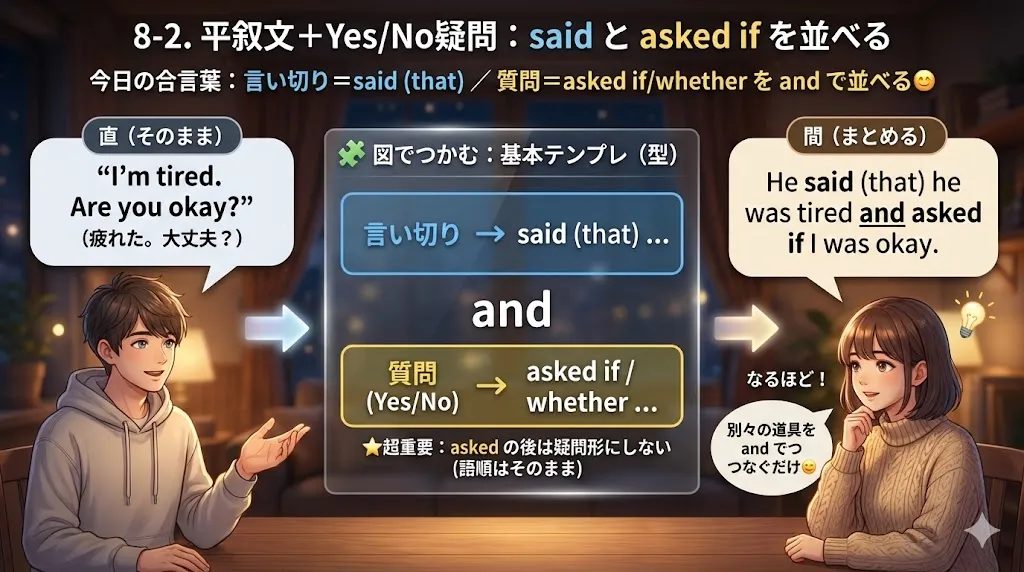
言い切り=
said (that) / 質問=asked if/whether を
and で並べる😊
🧭 8-2-1. まず結論:said (that) … and asked if/whether …(基本テンプレ)
混ざる発言のいちばんラクな整え方はこれです😊
「言い切り」+「質問」を別の動詞で書き分けて、andでつなぐ。
小学生向けに言うと「言ったこと/聞いたことを2個ならべる」イメージです。
🧱 まず覚える1行テンプレ(これが土台)
S + said (that) + S + V
and
asked if/whether + S + V
that は( )でOKなことが多い。💡
if/whether は「〜かどうか」の合図(ここは省略しないのが安全)。
asked の後は疑問形にしない😊
(倒置=語順をひっくり返すこと。ここでは基本しない)
例:×
asked if was I ... / 〇 asked if I was ...
💬 例文で「基本テンプレ」を確認(3つ)
He said, “I’m tired. Are you okay?” → He said (that) he was tired and asked if I was okay.
(彼は「疲れた。大丈夫?」と言った。)
✅ 言い切り=said、質問=asked if。
She said, “I can help you. Do you need anything?” → She said (that) she could help me and asked if I needed anything.
(彼女は「手伝えるよ。何か必要?」と言った。)
💡 can → could のように形が変わっても、テンプレは同じです。
They said, “We will leave soon. Are you ready?” → They said (that) they would leave soon and asked whether I was ready.
(彼らは「もうすぐ出る。準備できた?」と言った。)
🌿 whether は少しかため。「〜かどうか」を丁寧に言う感じです。
🔀 8-2-2. 並べる順番:会話の流れどおりでOK(言い切り→質問 / 質問→言い切り)
順番は、元の会話の流れに合わせてOKです😊
大事なのは順番よりも、「言い切り=said」「質問=asked if/whether」と
動詞を持ち替えること。
🗺️ 2つの並べ方(どっちでもOK)
said (that) ... and asked if ...
asked if ... and said (that) ...
人は「完璧に分かってから」より、「だいたい分かった型でまず書いてみる」方が 記憶に残りやすいです😊
💬 例文で「順番の違い」を確認(3つ)
He said, “I’m leaving now. Are you coming?” → He said (that) he was leaving then and asked if I was coming.
(彼は「今出る。来る?」と言った。)
✅ まず言い切ってから確認する、会話でよくある流れ。
She said, “Are you free tonight? I want to talk.” → She asked if I was free that night and said (that) she wanted to talk.
(彼女は「今夜空いてる?話したい」と言った。)
💡 「まず確認→次に本題」もすごく自然です😊
He said to me, “I finished it. Did you check it?” → He told me (that) he had finished it and asked if I had checked it.
(彼は私に「終わった。確認した?」と言った。)
✅ told は相手つき(me)で、言い切りを担当。
🤔 8-2-3. if と whether:どっちを選ぶ?(ニュアンス・選び方)
どちらも「〜かどうか」ですが、空気感が少し違います😊
if はふつうの会話でよく使う万能タイプ。
whether は少しかためで、(文章っぽい/丁寧な感じ)が出ます。
🧭 迷ったらこう選ぶ!
迷ったら if
asked if I was ready
文章・フォーマル寄り
asked whether I was ready
意味はほぼ同じなので、最初は if だけでOK😊
余裕が出たら「文章っぽくしたいときは whether」と覚えるとラクです。
💬 例文でニュアンスをつかむ(3つ)
He said, “I can drive you. Do you want a ride?” → He said (that) he could drive me and asked if I wanted a ride.
(彼は「送れるよ。乗る?」と言った。)
✅ ふだんの会話なら if がいちばん自然。
She said, “I will wait here. Are you sure?” → She said (that) she would wait there and asked whether I was sure.
(彼女は「ここで待つ。本当にいいの?」と言った。)
🌿 少し丁寧に響くのが whether。
He said, “I’ll call you later. Do you prefer email?” → He said (that) he would call me later and asked whether I preferred email.
(彼は「あとで電話する。メールのほうがいい?」と言った。)
💡 「どっちがいい?」の空気を、whether が少し支えます😊
🛠️ 8-2-4. 代名詞・時制・時間語:2つの節を“別々に”直す(節ごとメンテ)
混合文が崩れる最大の原因はこれです👇
「片方の節だけ直して、もう片方が置き去り」になりがち😢
だから、said の節とasked の節を
“別々に”点検しましょう。
(節=文のかたまり。小学生向けに言うと「文のパーツ」)
🧾 チェック項目はこの3つだけ
am/is → waswill → wouldcan → could
I → he/shemy → his/heryou → I/he/she
now → thentoday → that dayhere → there
said節に1回、asked節に1回、この3点を見直すだけ😊
「節ごとメンテ」をやると、ミスが一気に減ります。
💬 例文で「節ごとメンテ」を確認(3つ)
He said, “I’m busy now. Can you wait?” → He said (that) he was busy then and asked if I could wait.
(彼は「今忙しい。待てる?」と言った。)
✅ said節:am → was、now → then/ asked節:can → could
She said, “I’m working today. Are you free?” → She said (that) she was working that day and asked if I was free.
(彼女は「今日は仕事。空いてる?」と言った。)
✅ 時間語は「その日」へ:today → that day。
He said, “I will stay here. Will you come back?” → He said (that) he would stay there and asked if I would come back.
(彼は「ここにいる。戻ってくる?」と言った。)
✅ 場所:here → there、未来:will → would(2節とも点検!)
「said節を直す → asked節を直す」の順で、 3点(時制・代名詞・時間語)だけ見ればOK😊
⚠️ 8-2-5. よくあるミス:asked that/that を2つ目に入れ忘れる/疑問語順にする
ここは「3つだけ」覚えれば十分です😊
混合(平叙文+Yes/No疑問)で崩れる原因は、ほぼこの3つに集約されます。
🧯 ミス3兄弟(これだけチェック!)
that でつながない。✅
asked if / asked whether
asked の直後に合図が必要。✅
asked if S + V
✅
asked if I was ...
質問は if/whether の旗を立てる📍
そして語順は ふつうの並び(疑問の並びにしない)😊
🧪 誤り → 正解で確認(3つ)
✗ He asked that I was ready. ✓ He asked if I was ready.
(彼は私が準備できているかどうか尋ねた。)
✅ 質問は if/whether でつなぎます。
✗ She asked I needed help. ✓ She asked if I needed help.
(彼女は私が助けが必要かどうか尋ねた。)
✅ asked のあとに「〜かどうか」の合図が必要です。
✗ He asked if was I okay. ✓ He asked if I was okay.
(彼は私が大丈夫かどうか尋ねた。)
✅ 間接疑問は「ふつうの語順」= I was。
asked の後は if/whether、そして 語順は普通😊
✅ 8-2 まとめ:テンプレ3本+チェックリスト
8-2 は「平叙文+Yes/No疑問」を、安全に並べる型でした😊
ここを固めると、混合文が一気にラクになります✨
🧱 テンプレ3本(ここだけ持ち帰ればOK)
said (that) ...and asked if/whether ...
asked if/whether ...and said (that) ...
told + 人 + (that) ...and asked if/whether ...
✅ 仕上げチェックリスト(節ごとに見る)
- that は( )で省略OKなことが多い
- 時制:
am/is → was、will → wouldなど - 代名詞:
I → he/sheなど(目線合わせ)
- if/whether を必ず入れる(旗を立てる📍)
- 語順は普通:
I was(疑問形にしない) - 時制・代名詞・時間語も同じくチェック
「said節 → asked節」の順でチェックできれば、8-2はもう完成です😊✨
8-3. 平叙文+Wh疑問文:asked + wh語(語順は疑問形にしない)
What / Where / When / Who / Why / How
みたいな「Wh疑問文(なに?どこ?いつ?だれ?なぜ?どうやって?の質問)」が混ざるときは、
質問パートを asked + wh語 で受け止めるのが基本です😊
そして最大のコツは、
語順を疑問形にしないこと(=ふつうの並びに戻す)✨
ここでは詳しい説明に入る前に、「型を固定してミスを減らす」ことを目標にしましょう。
むずかしい用語が出てきたら、 (語順=単語の並び/倒置=語順をひっくり返すこと) のように、短い語注も一緒に添えます😊
間接話法 Wh疑問文 Lesson 114 / Section 8-3
🧠 図でつかむ:asked + wh語 + S + V(疑問形にしない)
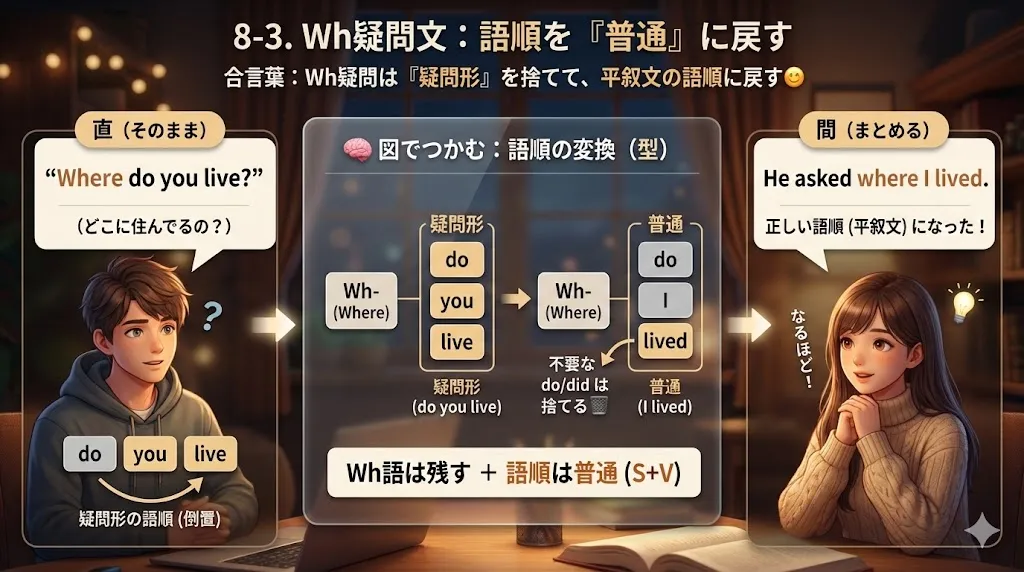
🧭 8-3-1. まず結論:asked + wh語 + S + V(疑問形にしない)【基本テンプレ】
Wh疑問が来たら、まずはこの1行テンプレに当てはめればOKです😊
質問の合図(wh語)を残したまま、
後ろは「ふつうの語順」で書きます。
(ふつうの語順=平叙文の並び)
🧱 まず覚える1行テンプレ
S + asked + wh- + S + V
wh- + do/did + S ... の形はここでは使いません。
| 区分 | 形 | メモ |
|---|---|---|
| ✅ 正解 |
asked where I lived
|
wh語のあとが S + V(ふつうの語順) |
| ❌ ありがち |
asked where did I live
|
疑問形のまま(倒置が残る) |
「wh語は残す」「語順は普通」の2点だけで勝てます😊
💬 例文でテンプレを確認(3つ)
He said, “Where do you live?” → He asked where I lived.
(彼は私がどこに住んでいるのか尋ねた。)
✅ where のあとが I lived(ふつうの語順)になっています。
She said, “What did you buy?” → She asked what I had bought.
(彼女は私が何を買ったのか尋ねた。)
💡 過去の内容は had bought のように整えることがあります(後で整理します)。
They said, “When will you come back?” → They asked when I would come back.
(彼らは私がいつ戻るのか尋ねた。)
✅ Wh疑問でも、語順は変えずに I would come back です。
🔥 8-3-2. 最重要:語順は「平叙文」+ do/did を消す(ここが勝ち筋)
8-3で一番多いミスはこれ👇
質問の形(do/did + 主語)を残したままにしてしまうことです😢
間接話法では、do/did は「質問用の助動詞」なので役目が終わります。
だから スッと消して、ふつうの語順に戻します😊
🚦 ここだけは赤信号チェック!
He asked where did I go.She asked what do you want.
He asked where I had gone.She asked what I wanted.
Wh語のあとに do/did を見つけたら、消して語順を直す😊
💬 例文で「do/did を消す」を確認(3つ)
He said, “Where did you go?” → He asked where I had gone.
(彼は私がどこへ行ったのか尋ねた。)
✅ did は消えて、I had gone の語順になります。
She said, “What do you want?” → She asked what I wanted.
(彼女は私が何を望んでいるのか尋ねた。)
✅ do を消して、I wanted の並びにします。
He said, “How did you know that?” → He asked how I had known that.
(彼は私がどうやってそれを知ったのか尋ねた。)
✅ how のあとが I had known(ふつうの語順)になっています。
① wh語は残す → ② do/did を消す → ③ 語順を普通にする😊
🧩 8-3-3. つまずき回避:who/what が主語のとき(語順が変わらないパターン)
ここ、実は「ラクなゾーン」です😊
who や what が 主語(だれが?/なにが?の担当)になっている質問は、
語順をいじらなくても形がまとまりやすいんです。
(主語=「〜が」の人・もの)
✅ まずココだけ確認!
Who called you? の who は「電話した人」=主語。What happened? の what は「起きたこと」=主語。
asked who + V ...✅
asked what + V ...(主語なので、後ろは自然に動詞が続く)
主語の who/what は、語順で迷いにくい😊
だからここは「時制や代名詞」を丁寧に整える方が大事です。
💬 例文で「主語who/what」を確認(3つ)
She said, “Who called you?” → She asked who had called me.
(彼女は誰が私に電話をしたのか尋ねた。)
✅ who のあとが自然に had called へ続きます。
He said, “What happened?” → He asked what had happened.
(彼は何が起きたのか尋ねた。)
✅ what が主語なので、had happened がそのまま続きます。
They said, “Who wrote this letter?” → They asked who had written that letter.
(彼らは誰がその手紙を書いたのか尋ねた。)
✅ this → that のように、指示語(これ/それ)も整えます。
🛠️ 8-3-4. 節ごとメンテ:時制(バックシフト)+代名詞+時間/場所語
8-3は「語順」だけでなく、節の中身も同時に整える必要があります😊
ここでの節は、Wh疑問の中の「文のパーツ」くらいの感覚でOKです。
(節=文のかたまり)
チェックはいつも通り、3点セットだけで大丈夫✨
🧾 3点セット(これだけ)
am/is → waswill → woulddid → had + 過去分詞
I → he/shemy → his/heryou → I/he/she
now → thentoday → that dayhere → there
Wh語の後ろを見て、 「時制・代名詞・時間/場所」をサッと整えればOK😊
(語順は平叙文、do/did は消す、もセットで思い出してね!)
💬 例文で「節ごとメンテ」を確認(3つ)
He said, “Where are you now?” → He asked where I was then.
(彼は私がそのときどこにいたのか尋ねた。)
✅ now → then で「今ここ」をずらします。
She said, “What are you doing today?” → She asked what I was doing that day.
(彼女は私がその日何をしているのか尋ねた。)
✅ 時間語は today → that day にチェンジ。
They said, “When will you come here?” → They asked when I would come there.
(彼らは私がいつそこへ来るのか尋ねた。)
✅ 未来は will → would、場所は here → there で整えます。
語順(平叙文)+do/did を消す+ 3点セット(時制・代名詞・時間/場所)で完成です😊
⚠️ 8-3-5. よくあるミス集:疑問語順のまま/asked that/wh語を消す
8-3で崩れる原因は、ほぼこの3つです😊
逆に言うと、ここを押さえれば ミスが激減します!
🧯 ミス3兄弟(この順でチェック!)
asked where did I go みたいにdo/did + 主語が残る
that でつながない✅
asked + wh語
where/what/why が消えると情報が消える😢
① wh語は残す → ② do/did は消す → ③ 語順は普通😊
🧪 誤り → 正解で確認(3つ)
✗ He asked where did I go. ✓ He asked where I had gone.
(彼は私がどこへ行ったのか尋ねた。)
✅ did を消して、I had gone(平叙文の語順)にします。
✗ She asked that I was late. ✓ She asked why I was late.
(彼女は私がなぜ遅れたのか尋ねた。)
✅ Wh疑問は asked + wh語。that ではつなぎません。
✗ They asked if I lived. ✓ They asked where I lived.
(彼らは私がどこに住んでいるのか尋ねた。)
✅ if に変えると「はい/いいえ」の質問になり、where の情報が消えます。
Wh語を残す → do/did を消す → 語順は普通で、8-3は安定します😊
✅ 8-3 まとめ:テンプレ3本+チェックリスト(ミニ練習つき)
8-3は「Wh疑問を報告する」セクションでした😊
ここは 型を固定すると一気にラクになります✨
🧱 テンプレ3本(これだけでOK)
asked + wh- + S + V
Where did you go?→
asked where I had gone
did + 主語 を残さない
Who called you?→
asked who had called me
✅ チェックリスト(3つだけ)
where / what / why / how / when / who
I was / I had🚫
was I / had I
🏃♂️ ミニ練習(3問)※答えつき
Direct: “Where did you put it?” → Reported: He asked where I had put it.
(彼は私がそれをどこに置いたのか尋ねた。)
Direct: “Why are you smiling?” → Reported: She asked why I was smiling.
(彼女は私がなぜ笑っているのか尋ねた。)
Direct: “Who is waiting outside?” → Reported: He asked who was waiting outside.
(彼は誰が外で待っているのか尋ねた。)
Wh語は残す/do/did は消す/語順は普通😊
8-4. 疑問文+平叙文:順番はそのままでもOK(読みやすさ優先)
「質問してから、説明を足す」タイプの会話は、
間接話法でも順番そのままで大丈夫です😊
つまり、asked(質問)→ said (that)(言い切り)を
会話の流れどおりに並べるのがコツ✨
ここでは「文を美しく並べ替える」よりも、
読みやすさ(伝わりやすさ)を優先します。
むずかしい用語が出てきたら、 (平叙文=言い切りの文/疑問文=質問の文) のように、短い語注も一緒に添えます😊
間接話法 疑問文+平叙文 Lesson 114 / Section 8-4🧭 図でつかむ:質問 → 言い切り(順番そのまま)
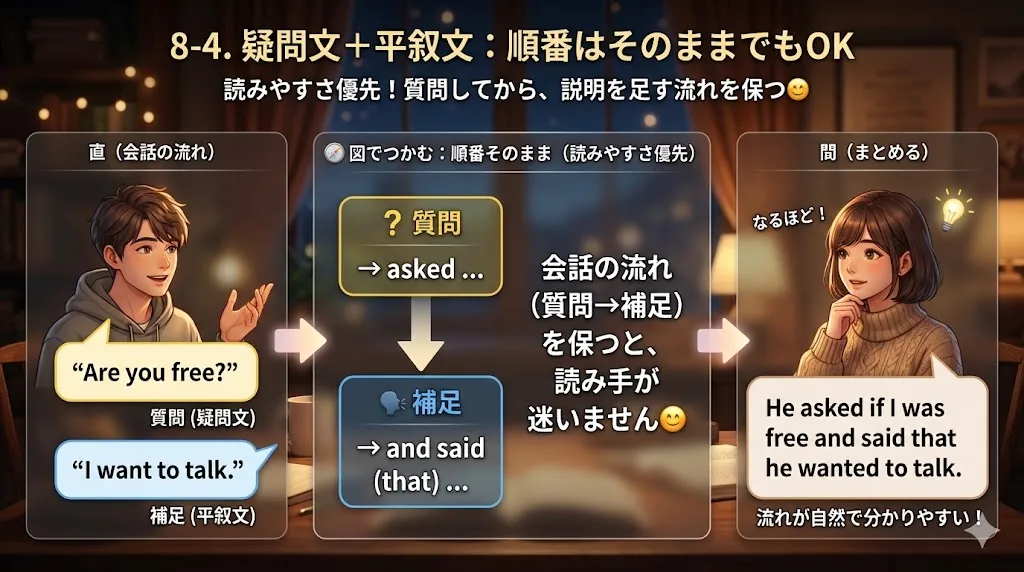
🧩 8-4-1. まず結論:質問→言い切りは「順番そのまま」でOK(読みやすさ優先)
元の会話が「質問して、次に説明を足す」なら、間接話法でも同じ順番でOKです😊
読みやすさ(相手がスッと理解できること)を優先して、
質問 → 補足説明の流れをキープしましょう✨
🔧 ざっくり型(ここでは順番だけ意識!)
asked ...(質問) + and said (that) ...(言い切り)
「質問が先に来ると、読み手の頭に“話題の焦点”が先に置ける」ので、理解が早くなります😊
💬 例文(3つ)
She said, “Are you free tomorrow? I want to talk.” → She asked if I was free the next day and said that she wanted to talk.
(彼女は翌日私が空いているか尋ね、話したいと言った。)
✅ 「質問 → 理由(補足)」の順番を保つと自然です。
He said, “Where did you buy it? It looks expensive.” → He asked where I had bought it and said that it looked expensive.
(彼は私がどこでそれを買ったのか尋ね、それは高そうだと言った。)
✅ Wh疑問は asked + wh語 + S + V(疑問語順にしない)です。
They said, “Do you know her? She worked here before.” → They asked if I knew her and said that she had worked there before.
(彼らは私が彼女を知っているか尋ね、彼女は以前そこに勤めていたと言った。)
✅ 場所語は here → there など、目線に合わせて整えます。
質問 → 言い切り(補足)は、順番そのままで読みやすく仕上がります😊
🧱 8-4-2. 型を固定:asked if/whether(or asked + wh-)→ and said (that)…
8-4は「順番そのまま」でもOKですが、さらに強くするなら
型(テンプレ)を固定しましょう😊
質問の種類で、使う道具が変わります。
(Yes/No=はい/いいえで答える質問/Wh=何?どこ?などの質問)
🧰 2つの型(まずはここだけ)
asked if/whether + S + V(語順は疑問形にしない=ふつうの並び)
asked + wh- + S + V(do/did は消して、語順を普通に)
and said (that) + S + V
asked(質問)で受ける → said(that)(言い切り)で締める✨
💬 例文(3つ)
He said, “Do you need help? I can carry this.” → He asked if I needed help and said that he could carry it.
(彼は手伝いが必要か尋ね、それを運べると言った。)
✅ Yes/No は if で受けて、後ろは said that ... で言い切り。
She said, “Are you coming or not? We’ll start soon.” → She asked whether I was coming or not and said that they would start soon.
(彼女は来るのかどうか尋ね、彼らはすぐ始めると言った。)
✅ 「〜かどうか」感が強いときは whether が使いやすいです。
He said, “When will you finish? I’m waiting.” → He asked when I would finish and said that he was waiting.
(彼は私がいつ終わるのか尋ね、待っていると言った。)
✅ Wh疑問は asked + wh- + S + V。疑問形(倒置)にしません。
質問=asked(if/whether / wh-) → 言い切り=said(that) の型に乗せると安定します😊
🧠 8-4-3. “質問の中身”のルール再確認:Yes/No は if/whether、Wh は wh語、語順は普通
8-4は「順番そのまま」でOKでしたが、質問の中身は
いつも通りのルールで整えます😊
ここが崩れると、一気に読みづらくなるので要注意!
(Yes/No=はい/いいえで答える質問/Wh=何?どこ?など)
📌 まずは「2択」+「語順」の3点だけ
asked if/whether + S + V(if/whether を選ぶ)
asked that ...
asked + wh- + S + V(wh語を残す/do・did は消す)
asked where did I ...
wh語は残す/do/did は消す/語順は普通(平叙文)😊
💬 例文(3つ)
She said, "Are you ready? I can wait." → She asked if I was ready and said that she could wait.
(彼女は私が準備できているか尋ね、待てると言った。)
✅ Yes/No は if で受けて、if + S + V(普通の語順)にします。
He said, "Do you want tea or coffee? I have both." → He asked whether I wanted tea or coffee and said that he had both.
(彼は紅茶かコーヒーかどちらがいいか尋ね、両方あると言った。)
✅ 「AかBか」っぽいときは whether がハマりやすいです。
He said, "Where did you park? The lot is full." → He asked where I had parked and said that the lot was full.
(彼は私がどこに車を停めたのか尋ね、駐車場が満車だと言った。)
✅ did は消して、where + S + had + V の形にします。
🛠️ 8-4-4. “節ごと”に直す:バックシフト+代名詞+時間/場所語(質問節と平叙節を別々に)
8-4は「質問節」と「平叙節」の2つの節が並びます。
だから、直すときも2つを別々にメンテするのがコツ😊
(節=文のかたまり)
🧾 3点セット(質問節も平叙節も同じ)
am/is → waswill → woulddid → had + 過去分詞
I → he/shemy → his/heryou → I/he/she
now → thentoday → that dayhere → there
まず 質問節 を整える → 次に 平叙節 を整える、の順がラクです😊
💬 例文(3つ)
He said, "Are you busy now? I'm outside." → He asked if I was busy then and said that he was outside.
(彼はそのとき私が忙しいか尋ね、外にいると言った。)
✅ 質問節も平叙節も、now → then のように時間を合わせます。
They said, "Will you join us tomorrow? We'll meet here." → They asked if I would join them the next day and said that they would meet there.
(彼らは翌日参加するか尋ね、そこで会うと言った。)
✅ 未来の要素は will → would に寄せて整えると安定します。
He said, "Did you see my phone? I left this on the table." → He asked if I had seen his phone and said that he had left that on the table.
(彼は私が彼の電話を見たか尋ね、それをテーブルの上に置いたと言った。)
✅ 質問節は had seen、平叙節も had left のように、節ごとに時制を整えます。
質問節と平叙節は別メンテ!
それぞれで バックシフト・代名詞・時間/場所 を整えると読みやすさが一気に上がります😊
⚠️ 8-4-5. よくあるミス:said that?/疑問語順のまま/that を質問に入れる
8-4は順番がラクな分、「質問の作り方」で崩れがちです😅
ここはミスを3つに絞って、サクッと潰しましょう!
🧯 ミス3兄弟(この順でチェック!)
said (that) を使うと、質問になりません。
asked where did I ... のように、do/did + 主語が残る。
asked that if ... は不自然。質問は
if/whether や wh- でつなぐ。
質問=asked、言い切り=said (that)。
質問の中は 語順を普通(平叙文)にします😊
🧪 誤り → 正解で確認(3つ)
✗ He said that I was free and said that he needed help. ✓ He asked if I was free and said that he needed help.
(彼は私が空いているか尋ね、助けが必要だと言った。)
✅ 質問は asked if/whether または asked + wh- で作ります。
✗ She asked where did I park and said that the lot was full. ✓ She asked where I had parked and said that the lot was full.
(彼女は私がどこに車を停めたのか尋ね、駐車場が満車だと言った。)
✅ did を消して、where + S + had + V(普通の語順)にします。
✗ They asked that if I was coming and said that they would start soon. ✓ They asked if I was coming and said that they would start soon.
(彼らは私が来るか尋ね、すぐ始めると言った。)
✅ 質問は if/whether(Yes/No)または wh-(Wh)でつなぎます。
質問は asked/言い切りは said (that)/語順は普通😊
✅ 8-4 まとめ:テンプレ3本+チェックリスト(ミニ練習つき)
8-4は「質問→言い切り」を会話の流れどおりに並べるセクションでした😊
順番がラクな分、質問の作り方(asked)と語順(普通)だけは必ず守りましょう!
🧱 テンプレ3本(これだけで回せる)
asked if/whether S Vand said (that) S V
asked wh- S Vand said (that) S V
do/did は消す
質問 → 補足(言い切り)
✅ チェックリスト(4つだけ)
said で始めてない?asked that になってない?where/what/why/how が消えてない?did + 主語 が残ってない?🏃♂️ ミニ練習(3問)※答えつき
Direct: "Are you busy now? I need to talk." → Reported: He asked if I was busy then and said that he needed to talk.
(彼はそのとき私が忙しいか尋ね、話す必要があると言った。)
Direct: "Where did you learn that? It's impressive." → Reported: She asked where I had learned that and said that it was impressive.
(彼女はそれをどこで学んだのか尋ね、それはすごいと言った。)
Direct: "Will you come tomorrow? We'll start at ten." → Reported: They asked if I would come the next day and said that they would start at ten.
(彼らは翌日来るか尋ね、10時に始めると言った。)
質問は asked/言い切りは said (that)/語順は普通😊
8-5. 命令文(依頼)+他の文:told/asked + to ~ + 追加の報告
「お願い・指示」と「追加の説明」が
ひと息で出てくる会話は多いですよね😊
このタイプは、命令文を that節 にせず、
told/asked + 人 + to で受けてから、
追加の言い切りを said (that) ... でつなぐのがコツ✨
ここでは「型を固定して、迷いをゼロにする」ことを目標にします。
むずかしい用語が出てきたら、 (命令文=指示・お願いの文/追加の報告=そのあとに説明を足すこと) のように、短い言いかえも一緒に確認します😊
間接話法 命令文+報告 Lesson 114 / Section 8-5🧭 図でつかむ:命令(to)→ 追加の報告(that)
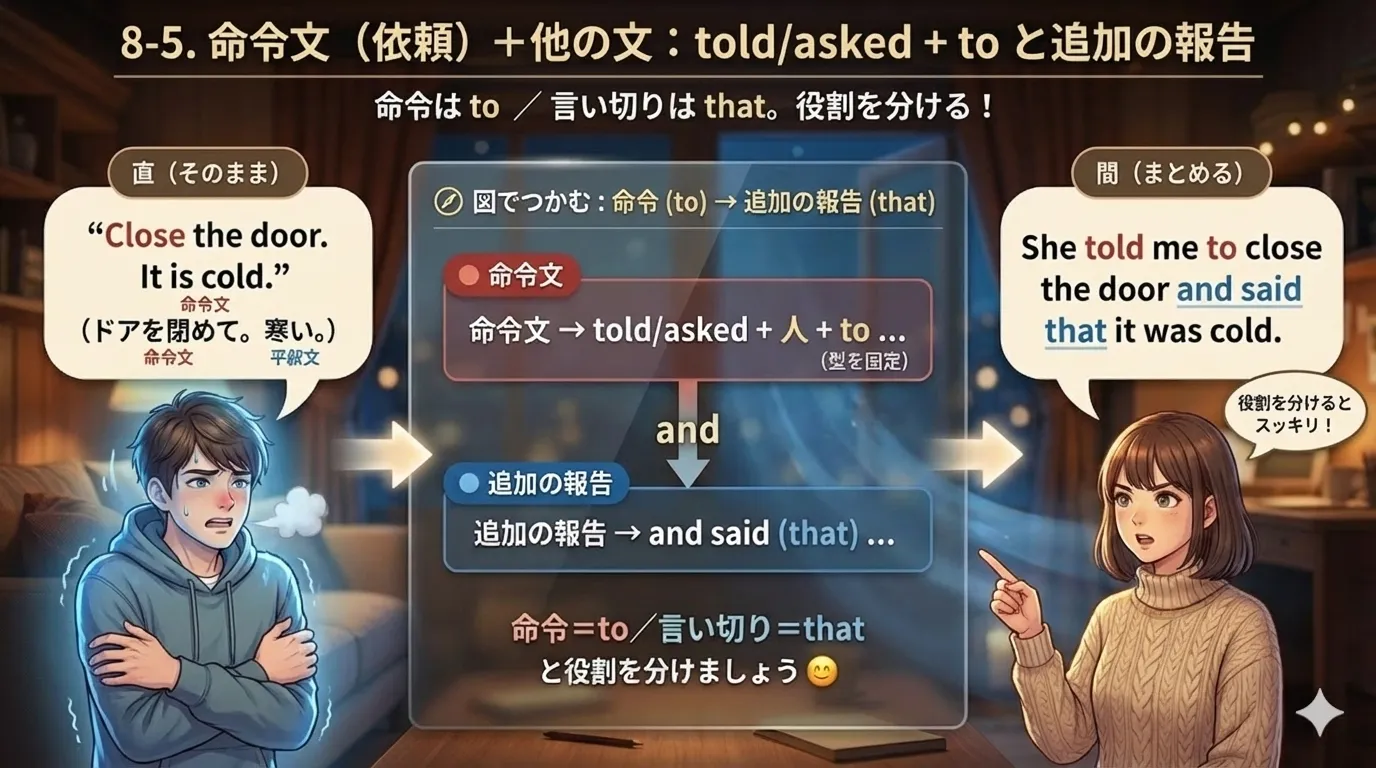
命令=to/言い切り=that と役割を分けましょう😊
🧩 8-5-1. まず結論:命令文は that節ではなく told/asked + to(型を固定)
命令文(指示・お願い)は、間接話法で that節 にしません🙅♀️
代わりに、to不定詞(to + 動詞)で受けます。
命令=told/asked + 人 + to + 動詞、追加の説明=said (that) ... と
役割を分けるのが勝ち筋✨
🧰 まずはこの「2パーツ」を固定!
told/asked + 人 + to + 動詞
(お願い・指示を “to” で受け止めるイメージ)
and said (that) + S + V
(そのあとに説明を足す)
命令は to/言い切りは that。混ぜない😊
💬 例文(3つ)
She said, "Close the door. It is cold." → She told me to close the door and said that it was cold.
(彼女はドアを閉めるよう私に言い、寒いと言った。)
✅ 命令は to close、追加説明は said that ... で分担。
He said, "Please wait here. I will be back soon." → He asked me to wait there and said that he would be back soon.
(彼はそこで待ってほしいと頼み、すぐ戻ると言った。)
✅ 依頼は asked + to。場所語も here → there に調整。
The teacher said, "Open your books. This is important." → The teacher told us to open our books and said that it was important.
(先生は本を開くよう私たちに言い、それは大事だと言った。)
✅ 「命令(to)」と「言い切り(that)」を分けるだけで超読みやすい😊
🎚️ 8-5-2. told と asked の使い分け:指示(強め)/依頼(丁寧)
ざっくり言うと、told は「指示(強め)」、
asked は「依頼(丁寧)」のイメージです😊
ただし、100%固定ではなく、(場面や関係で強さが変わる)ので
まずは「強さの目安」として使い分けるとスムーズ✨
🧭 迷わないための「2択メモ」
「強さ」で迷ったら、told=指示/asked=お願いの2択でOK😊
💬 例文(3つ)
Dad said, "Turn off the TV. It is too late." → Dad told me to turn off the TV and said that it was too late.
(父はテレビを消すよう私に言い、もう遅いと言った。)
✅ 「指示」感が強いので told が自然。
She said, "Please help me. I cannot carry this." → She asked me to help her and said that she could not carry it.
(彼女は手伝ってほしいと私に頼み、これを運べないと言った。)
✅ 配慮のある「お願い」なので asked がしっくり。
He said, "Please speak slowly. I am learning English." → He asked me to speak slowly and said that he was learning English.
(彼はゆっくり話してほしいと頼み、英語を勉強中だと言った。)
✅ 「お願い+理由」は asked + to が定番で使いやすいです。
told=指示(強め)/asked=依頼(丁寧)の目安でまずOK😊
🚫 8-5-3. 否定の命令:not to を使う(don’t を残さない)
「Don’t 〜」 が出てきたら、間接話法では
not to に変えます😊
(否定の命令=「しないで」という指示・お願い)
🧩 変換の型(ここだけ固定!)
Don’t + 動詞
(例:Don’t touch it. = それに触らないで)
told/asked + 人 + not to + 動詞
(don’t は消して、not to にする)
×
told me don't ...(don’t が残る)○
told me not to ...(not to にする)
💬 例文(3つ)
She said, "Don't touch it. It is hot." → She told me not to touch it and said that it was hot.
(彼女はそれに触らないよう私に言い、熱いと言った。)
✅ Don't touch は not to touch に置き換え。
He said, "Please don't be late. We will start at nine." → He asked us not to be late and said that they would start at nine.
(彼は遅れないでほしいと私たちに頼み、9時に始めると言った。)
✅ 「お願い」なので asked + not to が自然。
He said, "Don't worry. Everything is fine." → He told me not to worry and said that everything was fine.
(彼は心配しないよう私に言い、すべて大丈夫だと言った。)
✅ Don't worry は定番。not to worry に直すだけでOK😊
🔗 8-5-4. “混ざる”ときの並べ方:told/asked + to … and said (that) …
会話では「お願い・指示」だけじゃなく、理由・補足も一緒に言いがちです😊
そのときは、命令パーツ(to / not to)と追加の報告パーツ(that節)を
横に並べるだけでOK✨
(混ざる=2種類の文が同時に出ること)
🧭 3つのテンプレ(まずはこれだけ!)
told/asked + 人 + to Vand said (that) S V
told/asked + 人 + not to Vand said (that) S V
次に that(理由・補足)
命令(to / not to)→ 追加の言い切り(that)の順にすると、読みやすさが安定します😊
💬 例文(3つ)
She said, "Please send me the file. I will check it tonight." → She asked me to send her the file and said that she would check it that night.
(彼女はそのファイルを送ってほしいと頼み、その夜に確認すると言った。)
✅ 命令は to send、追加の報告は said that ...。
He said, "Don't open the box. It is fragile." → He told me not to open the box and said that it was fragile.
(彼はその箱を開けないよう私に言い、それは壊れやすいと言った。)
✅ 否定命令は not to。don’t を残さないのがポイント。
He said, "Call me tonight. I need to talk." → He told me to call him that night and said that he needed to talk.
(彼はその夜に電話するよう私に言い、話す必要があると言った。)
✅ 「命令→理由」の順にすると、読み手にやさしい流れになります😊
⚠️ 8-5-5. よくあるミス:asked that/to の位置ミス/命令を疑問にしちゃう
8-5は「命令=to」に慣れるまで、
つい that や if に引っぱられがちです😅
ここはミスを3つだけ覚えて、最短で防ぎましょう!
🧯 ミス3兄弟(これだけチェック!)
that ではなくto で受けます。
told to me のようにto の位置が崩れる。
asked if I close... のように命令を 質問にしてしまう。
命令は told/asked + 人 + to(or not to)!
追加の説明は said (that) へ回す😊
🧪 誤り → 正解で確認(3つ)
✗ She asked that I wait there and said that she would be back soon. ✓ She asked me to wait there and said that she would be back soon.
(彼女はそこで待ってほしいと私に頼み、すぐ戻ると言った。)
✅ 命令文は to(お願い・指示の形)で受けます。
✗ He told to me not to worry and said that everything was fine. ✓ He told me not to worry and said that everything was fine.
(彼は心配しないよう私に言い、すべて大丈夫だと言った。)
✅ 並びは固定:told + 人 + (not) to。
✗ He asked if I would close the door and said that it was cold. ✓ He asked me to close the door and said that it was cold.
(彼はドアを閉めてほしいと頼み、寒いと言った。)
✅ asked if は質問用。命令・依頼は asked + to。
命令は to(not to)/質問は if/whether/言い切りは that😊
✅ 8-5 まとめ:テンプレ3本+チェックリスト(ミニ練習つき)
8-5は「命令(お願い・指示)」と「追加の言い切り」が
同時に出てくる会話を、スッキリ報告する練習でした😊
ここは型さえ固まれば一気に簡単になります。命令=to/言い切り=that!
🧱 テンプレ3本(これで回せる)
told/asked + 人 + to Vand said (that) S V
told/asked + 人 + not to Vand said (that) S V
Don’t は not to へ
asked + 人 + to Vand said (that) S V
命令は to / not to、追加の言い切りは said (that) に置く😊
✅ チェックリスト(6つだけ)
asked that になってない?told to me になってない?asked if は質問用🏃♂️ ミニ練習(3問)※答えつき
Direct: "Please sit down. The meeting will start soon." → Reported: He asked me to sit down and said that the meeting would start soon.
(彼は座ってほしいと頼み、会議はすぐ始まると言った。)
Direct: "Don't touch it. It is hot." → Reported: She told me not to touch it and said that it was hot.
(彼女はそれに触らないよう私に言い、熱いと言った。)
Direct: "Call me tonight. I need to talk." → Reported: He told me to call him that night and said that he needed to talk.
(彼はその夜電話するよう私に言い、話す必要があると言った。)
命令は to(not to)/追加の言い切りは said (that)😊
🧾 まとめ:話法(reported speech)の要点チェック
このセクションでは、これまで学んだ内容を
一目で整理できるようにまとめています😊
スマホでも見やすいカード・表形式で、
「型 → 語順 → 仕上げ」の流れを総復習しましょう!
間接話法の変換ポイント(that節・if / whether・to不定詞・語句の変化など)を 一気に振り返り、仕上げのチェックまで行います📘
間接話法 まとめ Lesson 114 / Summary🧭 図でつかむ:直接話法 → 間接話法(報告)の流れ
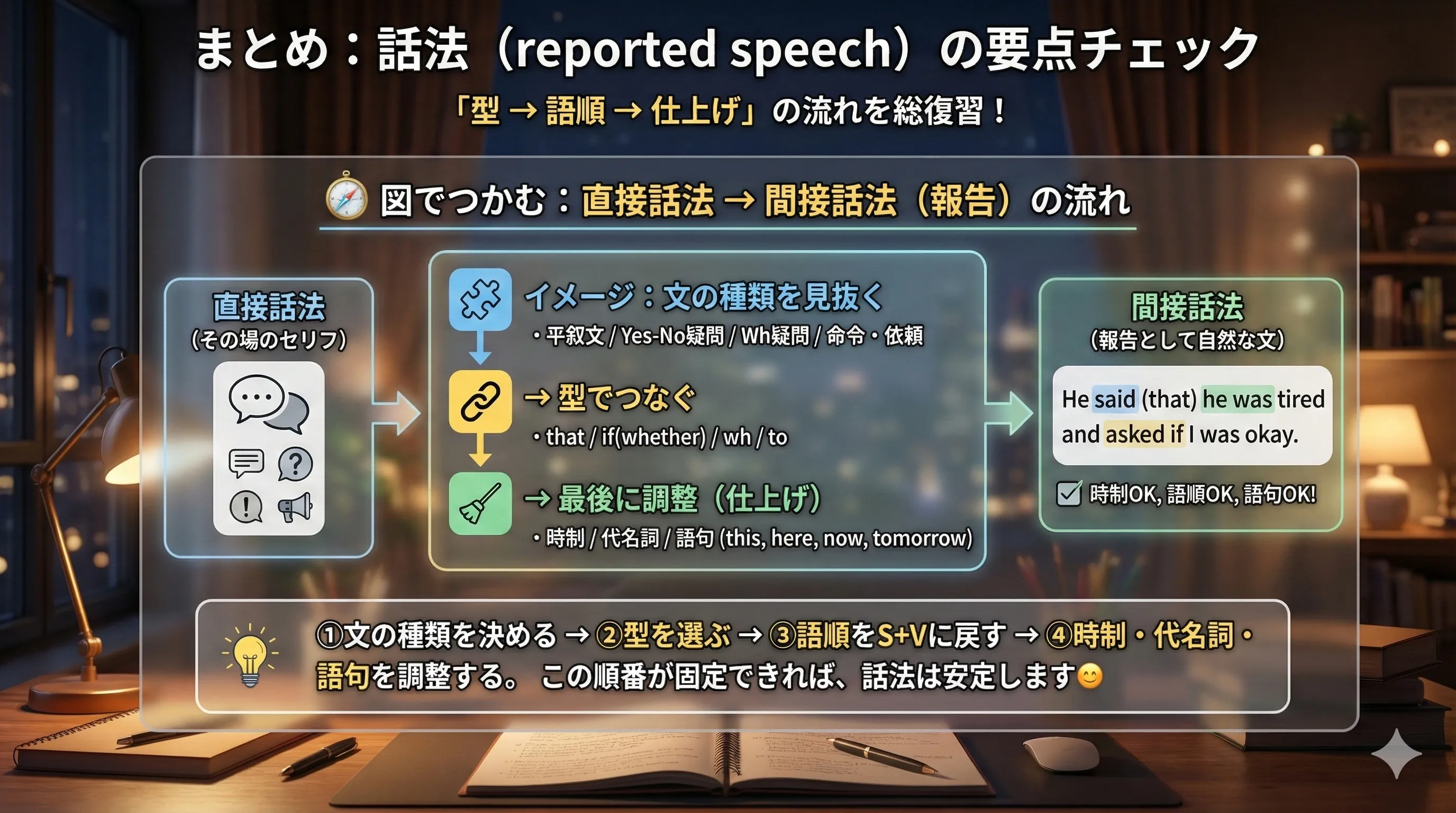
that / if(whether) / wh / to のことです😊
1. このレッスンでできるようになること
つぎの項目が「できる」に近づけば、話法はしっかり身についています✅ スマホは チェックだけでも効果あります😊
-
✅文の種類を見分けられる(入口が決まる)平叙文 / Yes-No疑問 / Wh疑問 / 命令・依頼 … を判定できる🧩平叙文 Yes/No疑問 Wh疑問 命令・依頼
-
✅型を選んで骨組みを作れる(ここが最重要)「何でつなぐ?」を即決できると、英文が安定します🔗
that(平叙)if/whether(Yes/No)wh-(疑問詞)to(命令・依頼) -
✅仕上げ調整で「報告として自然」にできる時制・代名詞・時間/場所(this/here/now)を整えて完成度アップ🧹⏱️ 時制の一致 🧍 代名詞 👉 this→that 📍 here→there 🕒 now→then
そのあとで 仕上げ調整 を足すと、話法が一気に“実戦レベル”になります😊
💬 例文で「できること」を実感しよう!
He said, "I am hungry."
(彼は「お腹がすいた」と言いました。)
He said (that) he was hungry.
(彼はお腹がすいていたと言いました。)
that でつなぐ。必要なら
時制も合わせます(am → was)。
She asked, "Do you like sushi?"
(彼女は「寿司が好き?」とたずねました。)
She asked if I liked sushi.
(彼女は私に寿司が好きかどうかたずねました。)
if + S + V)。
The doctor said, "Take this medicine."
(医者は「この薬を飲みなさい」と言いました。)
The doctor told me to take that medicine.
(医者は私にその薬を飲むように言いました。)
視点が変わるので this → that も自然に調整します😊
2. 1分リキャップ:最重要ポイント
忙しいときはここだけでOK⚡
話法は、「型 → 語順 → 仕上げ」の順に思い出すと、
ミスが一気に減ります😊
※ 間接話法は「質問」ではなく「内容」を入れるイメージです。
-
① まず 型 を即決する「何でつなぐ?」を先に決めると、英文の骨組みが一瞬で立ちます🔗平叙 → that Yes/No → if/whether Wh → wh節 命令・依頼 → to
-
② 疑問文でも 疑問形の語順にしない間接話法は「質問文」ではなく「内容の文」。だから語順は
S + Vに戻します。⚠️ よくあるミス:if do you .../where do you ...と “疑問形のまま” にしてしまう -
③ 最後に 仕上げ調整(時制・語句)を入れる報告する立場が変わるので、時制・代名詞・時間/場所(this/here/now)を整えると自然になります😊⏱️ 時制の一致 🧍 代名詞 👉 this→that 📍 here→there 🕒 now→then
💬 1分で感覚を戻す!ミニ例文(型別)
He said (that) he was late.
(彼は遅れたと言いました。)
that は省略できることも多い(まずは “型” が決められればOK)
She asked if I knew him.
(彼女は私に彼を知っているかどうかたずねました。)
if + S + V が基本です😊
He asked where I lived.
(彼は私がどこに住んでいるのかたずねました。)
① 文の種類を言える ② 型(that/if/wh/to)を選べる ③ 語順は S+V に戻すと説明できる
④ 時制・代名詞・this/here/now を調整できる → ここまでOKなら、話法はバッチリです🎉
3. 変換の手順:まずはこの4ステップ
話法はルールが多く見えますが、実際は
「順番(手順)」を固定すれば安定します😊
まずはこの 4ステップ を “型” として覚えて、どんな文でも同じ流れで変換しましょう✨
✅ コツ:STEP3(型)まで一気に作り、最後にSTEP4で仕上げます。
He said, "I am tired."
/
Yes/No
She asked, "Do you like coffee?"
said(言った)/told(伝えた)/asked(たずねた)など。
誰に(目的語)が必要かも同時に確認します🎯
said(内容を言う) /
told(人に伝える) /
asked(質問する)
-
平叙文
that + S + V -
Yes/No疑問
if/whether + S + V -
Wh疑問
wh- + S + V⚠️ ここが最重要:疑問形の語順にしない -
命令・依頼
(not) to + 動詞
She asked if I liked coffee.
|
命令
He told me to wait.
Tom said, "I will call you tomorrow."
(トムは「明日あなたに電話する」と言いました。)
Tom said (that) he would call me the next day.
(トムは次の日に私に電話すると言いました。)
型(STEP3)が合っていても、STEP4の 語句の変化 を忘れると不自然になりがちです。 最後にチェックしましょう😊
①文の種類を決める → ②伝達動詞を選ぶ → ③型でつなぐ → ④時制・代名詞・語句を調整する。
この順番が固定できれば、話法は安定します😊
4. 早見表:文の種類 → 型の選び方
話法は「どの型を選ぶか」でほぼ決まります😊
まず 文の種類 を見抜いて →
型(that / if / wh / to) を当てはめましょう✨
↔ 表は スマホでもPCでも、このボックス内で「縦+横スクロール」できます。
| 文の種類(入口) | 型(骨組み) | よく使う伝達動詞 | チェックポイント | ミニ例(英文→日本語訳→音声) |
|---|---|---|---|---|
|
平叙文(言い切り)
He said, "..."
|
that節
(said) (that) + S + V
|
say tell + 人 admit / explain |
✅ 引用符を外して「内容」を入れる ✅ that は省略できることも多い |
He said (that) he was tired. (彼は疲れていたと言いました。) |
|
一般疑問文(Yes/No)
Do you ...? / Are you ...?
|
if / whether
(asked) if/whether + S + V
|
ask wonder inquire |
❗ 最重要:
疑問形の語順にしない ✅ if + S + V に戻す |
She asked if I liked coffee. (彼女は私にコーヒーが好きかどうかたずねました。) |
|
特殊疑問文(Wh疑問)
What/Where/Why/How ...?
|
wh節
(asked) wh- + S + V
|
ask wonder find out |
✅ 疑問詞は残す(where/what など) ❗ でも語順は S + V (× where did I ...)
|
He asked where I lived. (彼は私がどこに住んでいるのかたずねました。) |
|
命令・依頼(〜して)
Open the door. / Don’t ...
|
to不定詞
told/asked + 人 + (not) to + V
|
tell ask order / advise |
✅ 「誰に(目的語)」を入れやすい ✅ 否定は not to が基本 |
The teacher told us to be quiet. (先生は私たちに静かにするように言いました。) |
|
勧誘(Let’s ~)
Let’s go. など
|
that節
suggest/propose + (that) + S + (should) + V
|
suggest propose recommend |
✅ should は省略されることも多い✅ 「命令(to)」と混同しない |
He suggested that we (should) take a break. (彼は私たちに休憩を取ろうと提案しました。) |
|
感嘆文(How / What)
How nice! / What a day!
|
内容として報告
(said) how/what ...
|
say exclaim remark |
✅ “質問”じゃなく “気持ち” ✅ how/what を残す |
She said how beautiful it was. (彼女はそれがなんて美しいのかと言いました。) |
|
祈願文(May ...!)
May you be happy!
|
that節
(prayed/wished) that + S + might + V
|
wish pray express |
✅ “祈願の might” を怖がらない ✅ 時制の一致で may → might になりやすい
|
He wished that I might succeed. (彼は私が成功しますようにと願いました。) |
|
重文(and / but / or)
A and B / A but B
|
that節(2つ)
(said) (that) S V and (that) S V
|
say explain add |
✅ 2つとも “内容” として報告 ✅ that の省略は無理にしない(読みやすさ優先)
|
He said that he was busy and that he couldn't come. (彼は忙しくて来られないと言いました。) |
|
複文(because/when/if など)
従属節つき
|
that節 + 従属節
(said) (that) S V because/when/if ...
|
say explain tell + 人 |
✅ 接続詞は基本そのまま残す ✅ 時制の一致が “主節/従属節” にどう出るか意識 |
She said that she stayed home because it was raining. (彼女は雨だったので家にいたと言いました。) |
|
種類が混ざる(疑問+平叙など)
1つの引用に複数タイプ
|
動詞を分けて並べる
asked if ... and said (that) ...
|
ask say tell + 人 |
✅ 文の種類ごとに “報告動詞” を切り替える ✅ 並べる順番は会話の流れ優先でもOK |
He asked if I was okay and said that he could help. (彼は私が大丈夫か聞いて、手伝えると言いました。) |
疑問文でも、間接話法では 疑問形の語順にしません。
if / wh の後ろは S + V に戻す!これだけで正答率が上がります😊
5. 早見表:語句の変化(this/that・here/there・now/then など)
間接話法は「その場のセリフ」を「あとで報告」に変えるので、
視点(いつ・どこ・だれ)がズレます🧭
そのズレを埋めるのが 語句の変化 です😊
↔ 表は スマホでもPCでも、このボックス内で「縦+横スクロール」できます。
| カテゴリ | 直接話法(その場) | 間接話法(報告) | よくある場面 | ミニ例(英文→日本語訳→音声) |
|---|---|---|---|---|
|
指示語(距離感)
近い → 遠い
|
this / these | that / those |
✅ 目の前の物→あとで報告 ✅ 指差しのニュアンスが消える |
He said (that) he liked that book. (元の直接話法:He said, "I like this book.") (彼はその本が好きだと言いました。) |
|
場所
ここ → そこ
|
here | there | ✅ 話した場所と報告する場所が違う |
She said (that) she lived there. (元:She said, "I live here.") (彼女はそこに住んでいると言いました。) |
|
時間(いま)
今 → そのとき
|
now | then / at that time | ✅ “今” が報告時点では “そのとき” になる |
He said (that) he was busy then. (元:He said, "I'm busy now.") (彼はそのとき忙しかったと言いました。) |
|
日付
今日/昨日/明日
|
today / yesterday / tomorrow | that day / the day before / the next day |
✅ 予定・報告でズレやすい ✅ “明日”が“次の日”へ |
Tom said (that) he would call me the next day. (元:Tom said, "I will call you tomorrow.") (トムは次の日に私に電話すると言いました。) |
|
週
先週/来週
|
last week / next week | the week before / the following week | ✅ 会話から時間が離れると置き換えが自然 |
She said (that) she had met him the week before. (元:She said, "I met him last week.") (彼女はその前の週に彼に会ったと言いました。) |
|
経過(〜前)
ago → before
|
ago
例:two days ago
|
before
例:two days before
|
✅ “基準点”が変わると置き換える |
He said (that) he had seen her two days before. (元:He said, "I saw her two days ago.") (彼は2日前に彼女を見たと言いました。) |
|
移動(来る/行く)
come → go
|
come | go / come (報告者の位置次第) | ✅ 報告者のいる場所が“目的地”かどうか |
She said (that) she would go there. (元:She said, "I will come here.") (彼女はそこへ行くと言いました。) |
|
人称(だれ視点?)
I / you がズレる
|
I / me / my / you / your | he/she / me / his/her | ✅ 報告者が “誰の立場” で言うかで変える |
He told me (that) he would help me. (元:He said to me, "I will help you.") (彼は私に助けると言いました。) |
|
その他よく出る
定番セット
|
tonight / next month | that night / the following month | ✅ “今夜/来月”もズレやすい |
He said (that) he would study that night. (元:He said, "I will study tonight.") (彼はその夜に勉強すると言いました。) |
- 📍 いま「報告している場所」は変わった?(here→there)
- 🕒 いま「報告している時間」はズレた?(now→then / tomorrow→the next day)
- 🧍 「だれのセリフ」になった?(I/you/my の入れ替え)
ただし「視点がズレているのに変えない」と不自然になりやすいので、最後にチェックしましょう😊
6. 仕上げチェック:Yes/No+ミス修正トレーニング
ここは「チェックして終わり」ではなく、
ミスを見つけたら即修正 → 口に出して固定する場所です😊
たった数分でも、学習効果がグッと上がります✨
① Yes/Noで判定 → ② No の項目だけ修正 → ③ 修正後の文を音声で1回(口でもOK)✅
tell は基本 人が必要(say と混ざりやすい)🧩
下の “わざとミス” を 1か所だけ直す練習です😊
直したら、正しい文を音声で1回(or 口で1回)✅
He asked where did I live.
(彼は私がどこに住んでいるのかたずねました。)
He asked where I lived.
(彼は私がどこに住んでいるのかたずねました。)
She asked that I liked coffee.
(彼女は私にコーヒーが好きかどうかたずねました。)
She asked if I liked coffee.
(彼女は私にコーヒーが好きかどうかたずねました。)
Tom said that he would call me tomorrow.
(トムは次の日に私に電話すると言いました。)
Tom said that he would call me the next day.
(トムは次の日に私に電話すると言いました。)
